
Research Topics & Ideas: Mental Health
100+ Mental Health Research Topic Ideas To Fast-Track Your Project
If you’re just starting out exploring mental health topics for your dissertation, thesis or research project, you’ve come to the right place. In this post, we’ll help kickstart your research topic ideation process by providing a hearty list of mental health-related research topics and ideas.
PS – This is just the start…
We know it’s exciting to run through a list of research topics, but please keep in mind that this list is just a starting point . To develop a suitable education-related research topic, you’ll need to identify a clear and convincing research gap , and a viable plan of action to fill that gap.
If this sounds foreign to you, check out our free research topic webinar that explores how to find and refine a high-quality research topic, from scratch. Alternatively, if you’d like hands-on help, consider our 1-on-1 coaching service .
Overview: Mental Health Topic Ideas
- Mood disorders
- Anxiety disorders
- Psychotic disorders
- Personality disorders
- Obsessive-compulsive disorders
- Post-traumatic stress disorder (PTSD)
- Neurodevelopmental disorders
- Eating disorders
- Substance-related disorders

Mood Disorders
Research in mood disorders can help understand their causes and improve treatment methods. Here are a few ideas to get you started.
- The impact of genetics on the susceptibility to depression
- Efficacy of antidepressants vs. cognitive behavioural therapy
- The role of gut microbiota in mood regulation
- Cultural variations in the experience and diagnosis of bipolar disorder
- Seasonal Affective Disorder: Environmental factors and treatment
- The link between depression and chronic illnesses
- Exercise as an adjunct treatment for mood disorders
- Hormonal changes and mood swings in postpartum women
- Stigma around mood disorders in the workplace
- Suicidal tendencies among patients with severe mood disorders
Anxiety Disorders
Research topics in this category can potentially explore the triggers, coping mechanisms, or treatment efficacy for anxiety disorders.
- The relationship between social media and anxiety
- Exposure therapy effectiveness in treating phobias
- Generalised Anxiety Disorder in children: Early signs and interventions
- The role of mindfulness in treating anxiety
- Genetics and heritability of anxiety disorders
- The link between anxiety disorders and heart disease
- Anxiety prevalence in LGBTQ+ communities
- Caffeine consumption and its impact on anxiety levels
- The economic cost of untreated anxiety disorders
- Virtual Reality as a treatment method for anxiety disorders
Psychotic Disorders
Within this space, your research topic could potentially aim to investigate the underlying factors and treatment possibilities for psychotic disorders.
- Early signs and interventions in adolescent psychosis
- Brain imaging techniques for diagnosing psychotic disorders
- The efficacy of antipsychotic medication
- The role of family history in psychotic disorders
- Misdiagnosis and delayed treatment of psychotic disorders
- Co-morbidity of psychotic and mood disorders
- The relationship between substance abuse and psychotic disorders
- Art therapy as a treatment for schizophrenia
- Public perception and stigma around psychotic disorders
- Hospital vs. community-based care for psychotic disorders

Personality Disorders
Research topics within in this area could delve into the identification, management, and social implications of personality disorders.
- Long-term outcomes of borderline personality disorder
- Antisocial personality disorder and criminal behaviour
- The role of early life experiences in developing personality disorders
- Narcissistic personality disorder in corporate leaders
- Gender differences in personality disorders
- Diagnosis challenges for Cluster A personality disorders
- Emotional intelligence and its role in treating personality disorders
- Psychotherapy methods for treating personality disorders
- Personality disorders in the elderly population
- Stigma and misconceptions about personality disorders
Obsessive-Compulsive Disorders
Within this space, research topics could focus on the causes, symptoms, or treatment of disorders like OCD and hoarding.
- OCD and its relationship with anxiety disorders
- Cognitive mechanisms behind hoarding behaviour
- Deep Brain Stimulation as a treatment for severe OCD
- The impact of OCD on academic performance in students
- Role of family and social networks in treating OCD
- Alternative treatments for hoarding disorder
- Childhood onset OCD: Diagnosis and treatment
- OCD and religious obsessions
- The impact of OCD on family dynamics
- Body Dysmorphic Disorder: Causes and treatment
Post-Traumatic Stress Disorder (PTSD)
Research topics in this area could explore the triggers, symptoms, and treatments for PTSD. Here are some thought starters to get you moving.
- PTSD in military veterans: Coping mechanisms and treatment
- Childhood trauma and adult onset PTSD
- Eye Movement Desensitisation and Reprocessing (EMDR) efficacy
- Role of emotional support animals in treating PTSD
- Gender differences in PTSD occurrence and treatment
- Effectiveness of group therapy for PTSD patients
- PTSD and substance abuse: A dual diagnosis
- First responders and rates of PTSD
- Domestic violence as a cause of PTSD
- The neurobiology of PTSD

Neurodevelopmental Disorders
This category of mental health aims to better understand disorders like Autism and ADHD and their impact on day-to-day life.
- Early diagnosis and interventions for Autism Spectrum Disorder
- ADHD medication and its impact on academic performance
- Parental coping strategies for children with neurodevelopmental disorders
- Autism and gender: Diagnosis disparities
- The role of diet in managing ADHD symptoms
- Neurodevelopmental disorders in the criminal justice system
- Genetic factors influencing Autism
- ADHD and its relationship with sleep disorders
- Educational adaptations for children with neurodevelopmental disorders
- Neurodevelopmental disorders and stigma in schools
Eating Disorders
Research topics within this space can explore the psychological, social, and biological aspects of eating disorders.
- The role of social media in promoting eating disorders
- Family dynamics and their impact on anorexia
- Biological basis of binge-eating disorder
- Treatment outcomes for bulimia nervosa
- Eating disorders in athletes
- Media portrayal of body image and its impact
- Eating disorders and gender: Are men underdiagnosed?
- Cultural variations in eating disorders
- The relationship between obesity and eating disorders
- Eating disorders in the LGBTQ+ community
Substance-Related Disorders
Research topics in this category can focus on addiction mechanisms, treatment options, and social implications.
- Efficacy of rehabilitation centres for alcohol addiction
- The role of genetics in substance abuse
- Substance abuse and its impact on family dynamics
- Prescription drug abuse among the elderly
- Legalisation of marijuana and its impact on substance abuse rates
- Alcoholism and its relationship with liver diseases
- Opioid crisis: Causes and solutions
- Substance abuse education in schools: Is it effective?
- Harm reduction strategies for drug abuse
- Co-occurring mental health disorders in substance abusers

Choosing A Research Topic
These research topic ideas we’ve covered here serve as thought starters to help you explore different areas within mental health. They are intentionally very broad and open-ended. By engaging with the currently literature in your field of interest, you’ll be able to narrow down your focus to a specific research gap .
It’s important to consider a variety of factors when choosing a topic for your dissertation or thesis . Think about the relevance of the topic, its feasibility , and the resources available to you, including time, data, and academic guidance. Also, consider your own interest and expertise in the subject, as this will sustain you through the research process.
Always consult with your academic advisor to ensure that your chosen topic aligns with academic requirements and offers a meaningful contribution to the field. If you need help choosing a topic, consider our private coaching service.
You Might Also Like:

Good morning everyone. This are very patent topics for research in neuroscience. Thank you for guidance
What if everything is important, original and intresting? as in Neuroscience. I find myself overwhelmd with tens of relveant areas and within each area many optional topics. I ask myself if importance (for example – able to treat people suffering) is more relevant than what intrest me, and on the other hand if what advance me further in my career should not also be a consideration?
This information is really helpful and have learnt alot
Phd research topics on implementation of mental health policy in Nigeria :the prospects, challenges and way forward.
Submit a Comment Cancel reply
Your email address will not be published. Required fields are marked *
Save my name, email, and website in this browser for the next time I comment.
- Print Friendly
General Psychiatry
is an open access journal publishing research on mental health topics relevant to psychiatrists and mental health professionals.
Impact Factor: 11.9 Citescore: 18.9 All metrics >>
General Psychiatry (GPSYCH) is an open access journal that has been providing leading psychiatry research since 1959. The journal covers all topics of interest to psychiatrists and other mental health professionals internationally. GPSYCH publishes original research, systematic reviews, meta-analyses, forums on topical issues, case reports, research methods in psychiatry, and a unique section on ‘Biostatistics in Psychiatry’. Original articles on basic research, clinical research, community-based studies, and ecological studies are all considered for publication.
GPSYCH adheres to the highest possible industry standards concerning publication ethics. To read the journal's detailed guidelines please see our policies .
Stay informed about GPSYCH - register for alerts and follow us on X .

Highlighted Articles

General Psychiatry publishes original research, systematic reviews, meta-analyses (that, unlike meta-analyses in other journals, pool results from studies published in Chinese and English), forums on topical issues, case reports, research methods in psychiatry, and a unique section on ‘Biostatistics in Psychiatry’. Original articles on basic research, clinical research, community-based studies, and ecological studies are all considered for publication.
The Author Information section provides specific article requirements to help you turn your research into an article suitable for General Psychiatry.
Information is also provided on editorial policies and open access .
The China Alzheimer Report 2022
China has experienced a rapid ageing of its population, leading to a surge in neurodegenerative disorders like Alzheimer's disease (AD) and related dementias (ADRD). AD's incidence, morbidity, and mortality rates have risen, making it the fifth leading cause of death in China, resulting in substantial financial burdens on individuals, families, and society. The 'Healthy China Action' plan (2019–2030) aims to shift focus from disease treatment to health maintenance, particularly for those with ADRD. This report describes epidemiological trends, assesses the economic impact, reviews clinical diagnosis and treatment, and delineates public health resources. This special report outlines the need for preventive measures, healthcare policy development, and international collaboration.

Latest Articles
Meta-analysis :
Original research :
22 May 2024
4 June 2024
28 May 2024
Most Read Articles
20 February 2024
Case report :
24 November 2023
18 October 2023
22 August 2023

Featured Video
General psychiatry - our full story.
Listen to Deputy Editor of General Psychiatry, Jinghong Chen, talk about the journal's vision, the advice she has for authors thinking about submitting to the journal, what the journal has to offer to readers, highlights from the journal and what the journal has planned for 2024.
Related Journals

BMJ Mental Health

Journal of Neurology, Neurosurgery and Psychiatry

Practical Neurology

Stroke and Vascular Neurology
Thank you for visiting nature.com. You are using a browser version with limited support for CSS. To obtain the best experience, we recommend you use a more up to date browser (or turn off compatibility mode in Internet Explorer). In the meantime, to ensure continued support, we are displaying the site without styles and JavaScript.
- View all journals
Psychiatric disorders articles from across Nature Portfolio
Psychiatric disorders are a heterogeneous group of mental disorders, manifesting as unusual mental or behavioural patterns that cause distress or disability to the individual.
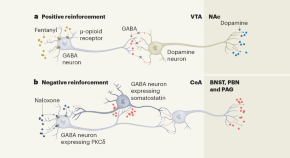
Neural pathways for reward and relief promote fentanyl addiction
Neuroscientists find that two distinct neural pathways are responsible for the addictive properties of the opioid fentanyl: one mediates reward, the other promotes the seeking of relief from symptoms of withdrawal.
- Markus Heilig
- Michele Petrella
Related Subjects
- Autism spectrum disorders
- Bipolar disorder
- Obsessive compulsive disorder
- Post-traumatic stress disorder
- Schizophrenia
Latest Research and Reviews
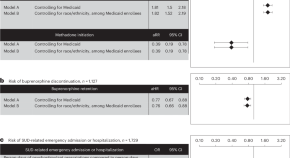
Prescription psychostimulant use, admissions and treatment initiation and retention in pregnant people with opioid use disorder
In this Article, the authors present data showing that pregnant people seeking treatment for opioid use disorder who receive psychostimulant medication for attention deficit hyperactivity disorder were more likely to initiate and adhere to treatment with buprenorphine.
- Kevin Y. Xu
- Tiffani D. M. Berkel
- Richard A. Grucza
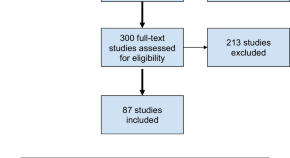
Genetics of child aggression, a systematic review
- Emiko Koyama
- Clement C. Zai

Differential methylation of OPRK1 in borderline personality disorder is associated with childhood trauma
- Dorothee Maria Gescher
- Denny Schanze
- Christian Schmahl
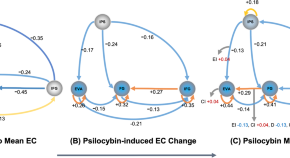
Neural mechanisms of psychedelic visual imagery
- Devon Stoliker
- Katrin H. Preller
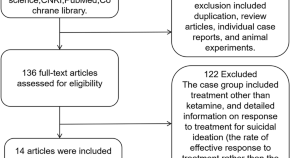
A meta-analysis of the effects of ketamine on suicidal ideation in depression patients
- ZuoYao Shen
- DaiQuan Gao
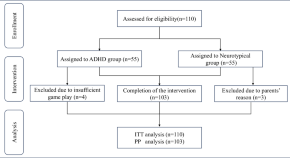
A mobile device-based game prototype for ADHD: development and preliminary feasibility testing
News and Comment
Cracking the chicken and egg problem of schizophrenia and substance use: genetic interplay between schizophrenia, cannabis use disorder, and tobacco smoking.
- Meghan J. Chenoweth
Why clinical research fails to improve population mental health
Research into clinical interventions rarely translates to improved mental health at the population level. Adequately powered studies leveraging advances in statistical methods to assess and translate multicomponent interventions will be better positioned to yield improvements in population mental health.
- Ellicott C. Matthay

MDMA therapy for PTSD rejected by FDA panel
Scientific advisers to the US Food and Drug Administration vote overwhelmingly that the risks of MDMA treatment for post-traumatic stress disorder outweigh the benefits.
- Sara Reardon
The continued hype and hope of digital phenotyping
- Taylor A. Braund

Autistic people three times more likely to develop Parkinson’s-like symptoms
Largest study of its kind also finds increased risk in older adults with a range of intellectual disabilities.
- Miryam Naddaf
Placebo response in RCT for antidepressant may not always be the ‘villain’ to fight: are KOR antagonists possibly affecting the intrinsic placebo response?
- Emilio Merlo Pich
Quick links
- Explore articles by subject
- Guide to authors
- Editorial policies
Skip to content
Equity, Diversity, and Inclusion
Our Office of Equity, Diversity, and Inclusion works to create an inclusive environment that values diversity in academic medicine.
Education and Training
Columbia Psychiatry is teaching the next generation of clinicians and researchers through our residency, fellowship, and training programs.
Research Areas
Clinical trials and research studies.
Would you like to help support our research? Learn about how to participate in clinical trials or research studies here at Columbia Psychiatry.
- Patient Care
Read about the world of psychiatric research, education, and patient care—and see what's happening here at Columbia Pyschiatry.
From its origins as the Pathological Institute of the New York State Hospitals in 1896 and with its more than 90-year-old affiliation with Columbia University and its partnership with NewYork-Presbyterian Hospital, Columbia Psychiatry is an internationally recognized leader in mental health research, ranking #1 in research funding from the National Institutes of Health. In fiscal year 2019, this Department supported 159 investigators with more than $110 million in grants awarded. Our research ranges from studies of molecular structures and brain circuitry to clinical trials that test novel treatments to understanding how to improve mental health care in the community. The goals are to discover how the brain works and what causes normal and abnormal human behavior, to develop new treatments, and to pave the way for preventions and cures for mental illness. Our 12 research areas are outlined below.
- Search Menu
Sign in through your institution
- Browse content in Arts and Humanities
- Browse content in Archaeology
- Anglo-Saxon and Medieval Archaeology
- Archaeological Methodology and Techniques
- Archaeology by Region
- Archaeology of Religion
- Archaeology of Trade and Exchange
- Biblical Archaeology
- Contemporary and Public Archaeology
- Environmental Archaeology
- Historical Archaeology
- History and Theory of Archaeology
- Industrial Archaeology
- Landscape Archaeology
- Mortuary Archaeology
- Prehistoric Archaeology
- Underwater Archaeology
- Urban Archaeology
- Zooarchaeology
- Browse content in Architecture
- Architectural Structure and Design
- History of Architecture
- Residential and Domestic Buildings
- Theory of Architecture
- Browse content in Art
- Art Subjects and Themes
- History of Art
- Industrial and Commercial Art
- Theory of Art
- Biographical Studies
- Byzantine Studies
- Browse content in Classical Studies
- Classical Literature
- Classical Reception
- Classical History
- Classical Philosophy
- Classical Mythology
- Classical Art and Architecture
- Classical Oratory and Rhetoric
- Greek and Roman Papyrology
- Greek and Roman Archaeology
- Greek and Roman Epigraphy
- Greek and Roman Law
- Late Antiquity
- Religion in the Ancient World
- Digital Humanities
- Browse content in History
- Colonialism and Imperialism
- Diplomatic History
- Environmental History
- Genealogy, Heraldry, Names, and Honours
- Genocide and Ethnic Cleansing
- Historical Geography
- History by Period
- History of Emotions
- History of Agriculture
- History of Education
- History of Gender and Sexuality
- Industrial History
- Intellectual History
- International History
- Labour History
- Legal and Constitutional History
- Local and Family History
- Maritime History
- Military History
- National Liberation and Post-Colonialism
- Oral History
- Political History
- Public History
- Regional and National History
- Revolutions and Rebellions
- Slavery and Abolition of Slavery
- Social and Cultural History
- Theory, Methods, and Historiography
- Urban History
- World History
- Browse content in Language Teaching and Learning
- Language Learning (Specific Skills)
- Language Teaching Theory and Methods
- Browse content in Linguistics
- Applied Linguistics
- Cognitive Linguistics
- Computational Linguistics
- Forensic Linguistics
- Grammar, Syntax and Morphology
- Historical and Diachronic Linguistics
- History of English
- Language Evolution
- Language Reference
- Language Variation
- Language Families
- Language Acquisition
- Lexicography
- Linguistic Anthropology
- Linguistic Theories
- Linguistic Typology
- Phonetics and Phonology
- Psycholinguistics
- Sociolinguistics
- Translation and Interpretation
- Writing Systems
- Browse content in Literature
- Bibliography
- Children's Literature Studies
- Literary Studies (Romanticism)
- Literary Studies (American)
- Literary Studies (Modernism)
- Literary Studies (Asian)
- Literary Studies (European)
- Literary Studies (Eco-criticism)
- Literary Studies - World
- Literary Studies (1500 to 1800)
- Literary Studies (19th Century)
- Literary Studies (20th Century onwards)
- Literary Studies (African American Literature)
- Literary Studies (British and Irish)
- Literary Studies (Early and Medieval)
- Literary Studies (Fiction, Novelists, and Prose Writers)
- Literary Studies (Gender Studies)
- Literary Studies (Graphic Novels)
- Literary Studies (History of the Book)
- Literary Studies (Plays and Playwrights)
- Literary Studies (Poetry and Poets)
- Literary Studies (Postcolonial Literature)
- Literary Studies (Queer Studies)
- Literary Studies (Science Fiction)
- Literary Studies (Travel Literature)
- Literary Studies (War Literature)
- Literary Studies (Women's Writing)
- Literary Theory and Cultural Studies
- Mythology and Folklore
- Shakespeare Studies and Criticism
- Browse content in Media Studies
- Browse content in Music
- Applied Music
- Dance and Music
- Ethics in Music
- Ethnomusicology
- Gender and Sexuality in Music
- Medicine and Music
- Music Cultures
- Music and Media
- Music and Culture
- Music and Religion
- Music Education and Pedagogy
- Music Theory and Analysis
- Musical Scores, Lyrics, and Libretti
- Musical Structures, Styles, and Techniques
- Musicology and Music History
- Performance Practice and Studies
- Race and Ethnicity in Music
- Sound Studies
- Browse content in Performing Arts
- Browse content in Philosophy
- Aesthetics and Philosophy of Art
- Epistemology
- Feminist Philosophy
- History of Western Philosophy
- Metaphysics
- Moral Philosophy
- Non-Western Philosophy
- Philosophy of Language
- Philosophy of Mind
- Philosophy of Perception
- Philosophy of Action
- Philosophy of Law
- Philosophy of Religion
- Philosophy of Science
- Philosophy of Mathematics and Logic
- Practical Ethics
- Social and Political Philosophy
- Browse content in Religion
- Biblical Studies
- Christianity
- East Asian Religions
- History of Religion
- Judaism and Jewish Studies
- Qumran Studies
- Religion and Education
- Religion and Health
- Religion and Politics
- Religion and Science
- Religion and Law
- Religion and Art, Literature, and Music
- Religious Studies
- Browse content in Society and Culture
- Cookery, Food, and Drink
- Cultural Studies
- Customs and Traditions
- Ethical Issues and Debates
- Hobbies, Games, Arts and Crafts
- Natural world, Country Life, and Pets
- Popular Beliefs and Controversial Knowledge
- Sports and Outdoor Recreation
- Technology and Society
- Travel and Holiday
- Visual Culture
- Browse content in Law
- Arbitration
- Browse content in Company and Commercial Law
- Commercial Law
- Company Law
- Browse content in Comparative Law
- Systems of Law
- Competition Law
- Browse content in Constitutional and Administrative Law
- Government Powers
- Judicial Review
- Local Government Law
- Military and Defence Law
- Parliamentary and Legislative Practice
- Construction Law
- Contract Law
- Browse content in Criminal Law
- Criminal Procedure
- Criminal Evidence Law
- Sentencing and Punishment
- Employment and Labour Law
- Environment and Energy Law
- Browse content in Financial Law
- Banking Law
- Insolvency Law
- History of Law
- Human Rights and Immigration
- Intellectual Property Law
- Browse content in International Law
- Private International Law and Conflict of Laws
- Public International Law
- IT and Communications Law
- Jurisprudence and Philosophy of Law
- Law and Society
- Law and Politics
- Browse content in Legal System and Practice
- Courts and Procedure
- Legal Skills and Practice
- Primary Sources of Law
- Regulation of Legal Profession
- Medical and Healthcare Law
- Browse content in Policing
- Criminal Investigation and Detection
- Police and Security Services
- Police Procedure and Law
- Police Regional Planning
- Browse content in Property Law
- Personal Property Law
- Study and Revision
- Terrorism and National Security Law
- Browse content in Trusts Law
- Wills and Probate or Succession
- Browse content in Medicine and Health
- Browse content in Allied Health Professions
- Arts Therapies
- Clinical Science
- Dietetics and Nutrition
- Occupational Therapy
- Operating Department Practice
- Physiotherapy
- Radiography
- Speech and Language Therapy
- Browse content in Anaesthetics
- General Anaesthesia
- Neuroanaesthesia
- Clinical Neuroscience
- Browse content in Clinical Medicine
- Acute Medicine
- Cardiovascular Medicine
- Clinical Genetics
- Clinical Pharmacology and Therapeutics
- Dermatology
- Endocrinology and Diabetes
- Gastroenterology
- Genito-urinary Medicine
- Geriatric Medicine
- Infectious Diseases
- Medical Toxicology
- Medical Oncology
- Pain Medicine
- Palliative Medicine
- Rehabilitation Medicine
- Respiratory Medicine and Pulmonology
- Rheumatology
- Sleep Medicine
- Sports and Exercise Medicine
- Community Medical Services
- Critical Care
- Emergency Medicine
- Forensic Medicine
- Haematology
- History of Medicine
- Browse content in Medical Skills
- Clinical Skills
- Communication Skills
- Nursing Skills
- Surgical Skills
- Medical Ethics
- Browse content in Medical Dentistry
- Oral and Maxillofacial Surgery
- Paediatric Dentistry
- Restorative Dentistry and Orthodontics
- Surgical Dentistry
- Medical Statistics and Methodology
- Browse content in Neurology
- Clinical Neurophysiology
- Neuropathology
- Nursing Studies
- Browse content in Obstetrics and Gynaecology
- Gynaecology
- Occupational Medicine
- Ophthalmology
- Otolaryngology (ENT)
- Browse content in Paediatrics
- Neonatology
- Browse content in Pathology
- Chemical Pathology
- Clinical Cytogenetics and Molecular Genetics
- Histopathology
- Medical Microbiology and Virology
- Patient Education and Information
- Browse content in Pharmacology
- Psychopharmacology
- Browse content in Popular Health
- Caring for Others
- Complementary and Alternative Medicine
- Self-help and Personal Development
- Browse content in Preclinical Medicine
- Cell Biology
- Molecular Biology and Genetics
- Reproduction, Growth and Development
- Primary Care
- Professional Development in Medicine
- Browse content in Psychiatry
- Addiction Medicine
- Child and Adolescent Psychiatry
- Forensic Psychiatry
- Learning Disabilities
- Old Age Psychiatry
- Psychotherapy
- Browse content in Public Health and Epidemiology
- Epidemiology
- Public Health
- Browse content in Radiology
- Clinical Radiology
- Interventional Radiology
- Nuclear Medicine
- Radiation Oncology
- Reproductive Medicine
- Browse content in Surgery
- Cardiothoracic Surgery
- Gastro-intestinal and Colorectal Surgery
- General Surgery
- Neurosurgery
- Paediatric Surgery
- Peri-operative Care
- Plastic and Reconstructive Surgery
- Surgical Oncology
- Transplant Surgery
- Trauma and Orthopaedic Surgery
- Vascular Surgery
- Browse content in Science and Mathematics
- Browse content in Biological Sciences
- Aquatic Biology
- Biochemistry
- Bioinformatics and Computational Biology
- Developmental Biology
- Ecology and Conservation
- Evolutionary Biology
- Genetics and Genomics
- Microbiology
- Molecular and Cell Biology
- Natural History
- Plant Sciences and Forestry
- Research Methods in Life Sciences
- Structural Biology
- Systems Biology
- Zoology and Animal Sciences
- Browse content in Chemistry
- Analytical Chemistry
- Computational Chemistry
- Crystallography
- Environmental Chemistry
- Industrial Chemistry
- Inorganic Chemistry
- Materials Chemistry
- Medicinal Chemistry
- Mineralogy and Gems
- Organic Chemistry
- Physical Chemistry
- Polymer Chemistry
- Study and Communication Skills in Chemistry
- Theoretical Chemistry
- Browse content in Computer Science
- Artificial Intelligence
- Computer Architecture and Logic Design
- Game Studies
- Human-Computer Interaction
- Mathematical Theory of Computation
- Programming Languages
- Software Engineering
- Systems Analysis and Design
- Virtual Reality
- Browse content in Computing
- Business Applications
- Computer Games
- Computer Security
- Computer Networking and Communications
- Digital Lifestyle
- Graphical and Digital Media Applications
- Operating Systems
- Browse content in Earth Sciences and Geography
- Atmospheric Sciences
- Environmental Geography
- Geology and the Lithosphere
- Maps and Map-making
- Meteorology and Climatology
- Oceanography and Hydrology
- Palaeontology
- Physical Geography and Topography
- Regional Geography
- Soil Science
- Urban Geography
- Browse content in Engineering and Technology
- Agriculture and Farming
- Biological Engineering
- Civil Engineering, Surveying, and Building
- Electronics and Communications Engineering
- Energy Technology
- Engineering (General)
- Environmental Science, Engineering, and Technology
- History of Engineering and Technology
- Mechanical Engineering and Materials
- Technology of Industrial Chemistry
- Transport Technology and Trades
- Browse content in Environmental Science
- Applied Ecology (Environmental Science)
- Conservation of the Environment (Environmental Science)
- Environmental Sustainability
- Environmentalist Thought and Ideology (Environmental Science)
- Management of Land and Natural Resources (Environmental Science)
- Natural Disasters (Environmental Science)
- Nuclear Issues (Environmental Science)
- Pollution and Threats to the Environment (Environmental Science)
- Social Impact of Environmental Issues (Environmental Science)
- History of Science and Technology
- Browse content in Materials Science
- Ceramics and Glasses
- Composite Materials
- Metals, Alloying, and Corrosion
- Nanotechnology
- Browse content in Mathematics
- Applied Mathematics
- Biomathematics and Statistics
- History of Mathematics
- Mathematical Education
- Mathematical Finance
- Mathematical Analysis
- Numerical and Computational Mathematics
- Probability and Statistics
- Pure Mathematics
- Browse content in Neuroscience
- Cognition and Behavioural Neuroscience
- Development of the Nervous System
- Disorders of the Nervous System
- History of Neuroscience
- Invertebrate Neurobiology
- Molecular and Cellular Systems
- Neuroendocrinology and Autonomic Nervous System
- Neuroscientific Techniques
- Sensory and Motor Systems
- Browse content in Physics
- Astronomy and Astrophysics
- Atomic, Molecular, and Optical Physics
- Biological and Medical Physics
- Classical Mechanics
- Computational Physics
- Condensed Matter Physics
- Electromagnetism, Optics, and Acoustics
- History of Physics
- Mathematical and Statistical Physics
- Measurement Science
- Nuclear Physics
- Particles and Fields
- Plasma Physics
- Quantum Physics
- Relativity and Gravitation
- Semiconductor and Mesoscopic Physics
- Browse content in Psychology
- Affective Sciences
- Clinical Psychology
- Cognitive Psychology
- Cognitive Neuroscience
- Criminal and Forensic Psychology
- Developmental Psychology
- Educational Psychology
- Evolutionary Psychology
- Health Psychology
- History and Systems in Psychology
- Music Psychology
- Neuropsychology
- Organizational Psychology
- Psychological Assessment and Testing
- Psychology of Human-Technology Interaction
- Psychology Professional Development and Training
- Research Methods in Psychology
- Social Psychology
- Browse content in Social Sciences
- Browse content in Anthropology
- Anthropology of Religion
- Human Evolution
- Medical Anthropology
- Physical Anthropology
- Regional Anthropology
- Social and Cultural Anthropology
- Theory and Practice of Anthropology
- Browse content in Business and Management
- Business Ethics
- Business History
- Business Strategy
- Business and Technology
- Business and Government
- Business and the Environment
- Comparative Management
- Corporate Governance
- Corporate Social Responsibility
- Entrepreneurship
- Health Management
- Human Resource Management
- Industrial and Employment Relations
- Industry Studies
- Information and Communication Technologies
- International Business
- Knowledge Management
- Management and Management Techniques
- Operations Management
- Organizational Theory and Behaviour
- Pensions and Pension Management
- Public and Nonprofit Management
- Strategic Management
- Supply Chain Management
- Browse content in Criminology and Criminal Justice
- Criminal Justice
- Criminology
- Forms of Crime
- International and Comparative Criminology
- Youth Violence and Juvenile Justice
- Development Studies
- Browse content in Economics
- Agricultural, Environmental, and Natural Resource Economics
- Asian Economics
- Behavioural Finance
- Behavioural Economics and Neuroeconomics
- Econometrics and Mathematical Economics
- Economic History
- Economic Methodology
- Economic Systems
- Economic Development and Growth
- Financial Markets
- Financial Institutions and Services
- General Economics and Teaching
- Health, Education, and Welfare
- History of Economic Thought
- International Economics
- Labour and Demographic Economics
- Law and Economics
- Macroeconomics and Monetary Economics
- Microeconomics
- Public Economics
- Urban, Rural, and Regional Economics
- Welfare Economics
- Browse content in Education
- Adult Education and Continuous Learning
- Care and Counselling of Students
- Early Childhood and Elementary Education
- Educational Equipment and Technology
- Educational Strategies and Policy
- Higher and Further Education
- Organization and Management of Education
- Philosophy and Theory of Education
- Schools Studies
- Secondary Education
- Teaching of a Specific Subject
- Teaching of Specific Groups and Special Educational Needs
- Teaching Skills and Techniques
- Browse content in Environment
- Applied Ecology (Social Science)
- Climate Change
- Conservation of the Environment (Social Science)
- Environmentalist Thought and Ideology (Social Science)
- Natural Disasters (Environment)
- Social Impact of Environmental Issues (Social Science)
- Browse content in Human Geography
- Cultural Geography
- Economic Geography
- Political Geography
- Browse content in Interdisciplinary Studies
- Communication Studies
- Museums, Libraries, and Information Sciences
- Browse content in Politics
- African Politics
- Asian Politics
- Chinese Politics
- Comparative Politics
- Conflict Politics
- Elections and Electoral Studies
- Environmental Politics
- Ethnic Politics
- European Union
- Foreign Policy
- Gender and Politics
- Human Rights and Politics
- Indian Politics
- International Relations
- International Organization (Politics)
- International Political Economy
- Irish Politics
- Latin American Politics
- Middle Eastern Politics
- Political Behaviour
- Political Economy
- Political Institutions
- Political Theory
- Political Methodology
- Political Communication
- Political Philosophy
- Political Sociology
- Politics and Law
- Politics of Development
- Public Policy
- Public Administration
- Quantitative Political Methodology
- Regional Political Studies
- Russian Politics
- Security Studies
- State and Local Government
- UK Politics
- US Politics
- Browse content in Regional and Area Studies
- African Studies
- Asian Studies
- East Asian Studies
- Japanese Studies
- Latin American Studies
- Middle Eastern Studies
- Native American Studies
- Scottish Studies
- Browse content in Research and Information
- Research Methods
- Browse content in Social Work
- Addictions and Substance Misuse
- Adoption and Fostering
- Care of the Elderly
- Child and Adolescent Social Work
- Couple and Family Social Work
- Direct Practice and Clinical Social Work
- Emergency Services
- Human Behaviour and the Social Environment
- International and Global Issues in Social Work
- Mental and Behavioural Health
- Social Justice and Human Rights
- Social Policy and Advocacy
- Social Work and Crime and Justice
- Social Work Macro Practice
- Social Work Practice Settings
- Social Work Research and Evidence-based Practice
- Welfare and Benefit Systems
- Browse content in Sociology
- Childhood Studies
- Community Development
- Comparative and Historical Sociology
- Economic Sociology
- Gender and Sexuality
- Gerontology and Ageing
- Health, Illness, and Medicine
- Marriage and the Family
- Migration Studies
- Occupations, Professions, and Work
- Organizations
- Population and Demography
- Race and Ethnicity
- Social Theory
- Social Movements and Social Change
- Social Research and Statistics
- Social Stratification, Inequality, and Mobility
- Sociology of Religion
- Sociology of Education
- Sport and Leisure
- Urban and Rural Studies
- Browse content in Warfare and Defence
- Defence Strategy, Planning, and Research
- Land Forces and Warfare
- Military Administration
- Military Life and Institutions
- Naval Forces and Warfare
- Other Warfare and Defence Issues
- Peace Studies and Conflict Resolution
- Weapons and Equipment

50 Studies Every Psychiatrist Should Know

Resident Physician
Professor of Psychiatry; Vice Chairman for Education, Residency Program Director and Chief of Geriatric Psychiatry
- Cite Icon Cite
- Permissions Icon Permissions
50 Studies Every Psychiatrist Should Know presents key studies that have shaped the clinical practice of psychiatry. Selected using a rigorous methodology, the studies cover a broad range of topics including anxiety disorders, bipolar disorder, major depressive disorder, schizophrenia, women's mental health, child and adolescent disorders, obsessive compulsive disorder, personality disorders, psychiatry in primary care, cognitive disorders, and epidemiological studies with an emphasis on clinical trials. For each study, a concise summary is presented with an emphasis on the results and limitations of the study and its implications for practice. An illustrative clinical case concludes each review, followed by brief information on other relevant studies. This is one of the only books of its kind to present a collection of the most influential studies in psychiatry that are detailed enough to be used on rounds, but still easily digestible. It is a must-read for health-care professionals and anyone who wants to learn more about the data behind clinical practice.
Personal account
- Sign in with email/username & password
- Get email alerts
- Save searches
- Purchase content
- Activate your purchase/trial code
- Add your ORCID iD
Institutional access
Sign in with a library card.
- Sign in with username/password
- Recommend to your librarian
- Institutional account management
- Get help with access
Access to content on Oxford Academic is often provided through institutional subscriptions and purchases. If you are a member of an institution with an active account, you may be able to access content in one of the following ways:
IP based access
Typically, access is provided across an institutional network to a range of IP addresses. This authentication occurs automatically, and it is not possible to sign out of an IP authenticated account.
Choose this option to get remote access when outside your institution. Shibboleth/Open Athens technology is used to provide single sign-on between your institution’s website and Oxford Academic.
- Click Sign in through your institution.
- Select your institution from the list provided, which will take you to your institution's website to sign in.
- When on the institution site, please use the credentials provided by your institution. Do not use an Oxford Academic personal account.
- Following successful sign in, you will be returned to Oxford Academic.
If your institution is not listed or you cannot sign in to your institution’s website, please contact your librarian or administrator.
Enter your library card number to sign in. If you cannot sign in, please contact your librarian.
Society Members
Society member access to a journal is achieved in one of the following ways:
Sign in through society site
Many societies offer single sign-on between the society website and Oxford Academic. If you see ‘Sign in through society site’ in the sign in pane within a journal:
- Click Sign in through society site.
- When on the society site, please use the credentials provided by that society. Do not use an Oxford Academic personal account.
If you do not have a society account or have forgotten your username or password, please contact your society.
Sign in using a personal account
Some societies use Oxford Academic personal accounts to provide access to their members. See below.
A personal account can be used to get email alerts, save searches, purchase content, and activate subscriptions.
Some societies use Oxford Academic personal accounts to provide access to their members.
Viewing your signed in accounts
Click the account icon in the top right to:
- View your signed in personal account and access account management features.
- View the institutional accounts that are providing access.
Signed in but can't access content
Oxford Academic is home to a wide variety of products. The institutional subscription may not cover the content that you are trying to access. If you believe you should have access to that content, please contact your librarian.
For librarians and administrators, your personal account also provides access to institutional account management. Here you will find options to view and activate subscriptions, manage institutional settings and access options, access usage statistics, and more.
Our books are available by subscription or purchase to libraries and institutions.
| Month: | Total Views: |
|---|---|
| October 2022 | 10 |
| October 2022 | 3 |
| October 2022 | 3 |
| October 2022 | 4 |
| October 2022 | 6 |
| October 2022 | 6 |
| October 2022 | 1 |
| October 2022 | 3 |
| October 2022 | 3 |
| October 2022 | 4 |
| October 2022 | 3 |
| October 2022 | 2 |
| October 2022 | 3 |
| October 2022 | 3 |
| October 2022 | 3 |
| October 2022 | 3 |
| October 2022 | 3 |
| October 2022 | 1 |
| October 2022 | 3 |
| October 2022 | 3 |
| October 2022 | 3 |
| October 2022 | 3 |
| October 2022 | 1 |
| October 2022 | 4 |
| October 2022 | 4 |
| October 2022 | 3 |
| October 2022 | 5 |
| October 2022 | 2 |
| October 2022 | 2 |
| October 2022 | 9 |
| October 2022 | 3 |
| October 2022 | 7 |
| October 2022 | 3 |
| October 2022 | 6 |
| October 2022 | 5 |
| October 2022 | 2 |
| October 2022 | 5 |
| October 2022 | 3 |
| October 2022 | 3 |
| October 2022 | 3 |
| October 2022 | 5 |
| October 2022 | 5 |
| October 2022 | 1 |
| October 2022 | 3 |
| October 2022 | 4 |
| October 2022 | 1 |
| October 2022 | 3 |
| October 2022 | 3 |
| October 2022 | 8 |
| October 2022 | 15 |
| October 2022 | 6 |
| October 2022 | 3 |
| October 2022 | 3 |
| October 2022 | 3 |
| October 2022 | 3 |
| October 2022 | 3 |
| November 2022 | 4 |
| November 2022 | 2 |
| November 2022 | 5 |
| November 2022 | 3 |
| November 2022 | 4 |
| November 2022 | 10 |
| November 2022 | 3 |
| November 2022 | 4 |
| November 2022 | 3 |
| November 2022 | 7 |
| November 2022 | 3 |
| November 2022 | 3 |
| November 2022 | 2 |
| November 2022 | 3 |
| November 2022 | 5 |
| November 2022 | 4 |
| November 2022 | 5 |
| November 2022 | 2 |
| November 2022 | 8 |
| November 2022 | 9 |
| November 2022 | 3 |
| November 2022 | 10 |
| November 2022 | 2 |
| November 2022 | 4 |
| November 2022 | 4 |
| November 2022 | 1 |
| November 2022 | 7 |
| November 2022 | 10 |
| November 2022 | 2 |
| November 2022 | 6 |
| November 2022 | 6 |
| November 2022 | 4 |
| November 2022 | 5 |
| November 2022 | 4 |
| November 2022 | 3 |
| November 2022 | 5 |
| November 2022 | 2 |
| November 2022 | 3 |
| November 2022 | 12 |
| November 2022 | 7 |
| November 2022 | 5 |
| November 2022 | 4 |
| November 2022 | 2 |
| November 2022 | 5 |
| November 2022 | 7 |
| November 2022 | 2 |
| November 2022 | 7 |
| November 2022 | 3 |
| November 2022 | 3 |
| November 2022 | 9 |
| November 2022 | 12 |
| November 2022 | 2 |
| November 2022 | 4 |
| November 2022 | 2 |
| December 2022 | 3 |
| December 2022 | 7 |
| December 2022 | 3 |
| December 2022 | 3 |
| December 2022 | 3 |
| December 2022 | 3 |
| December 2022 | 3 |
| December 2022 | 3 |
| December 2022 | 8 |
| December 2022 | 3 |
| December 2022 | 4 |
| December 2022 | 3 |
| December 2022 | 3 |
| December 2022 | 5 |
| December 2022 | 3 |
| December 2022 | 3 |
| December 2022 | 3 |
| December 2022 | 7 |
| December 2022 | 6 |
| December 2022 | 3 |
| December 2022 | 11 |
| December 2022 | 7 |
| December 2022 | 17 |
| December 2022 | 5 |
| December 2022 | 3 |
| December 2022 | 5 |
| December 2022 | 5 |
| December 2022 | 5 |
| December 2022 | 3 |
| December 2022 | 6 |
| December 2022 | 3 |
| December 2022 | 3 |
| December 2022 | 7 |
| December 2022 | 3 |
| December 2022 | 3 |
| December 2022 | 3 |
| December 2022 | 3 |
| December 2022 | 3 |
| December 2022 | 3 |
| December 2022 | 5 |
| December 2022 | 6 |
| December 2022 | 5 |
| December 2022 | 5 |
| December 2022 | 9 |
| December 2022 | 7 |
| December 2022 | 5 |
| December 2022 | 3 |
| December 2022 | 3 |
| December 2022 | 3 |
| December 2022 | 6 |
| January 2023 | 2 |
| January 2023 | 2 |
| January 2023 | 3 |
| January 2023 | 7 |
| January 2023 | 2 |
| January 2023 | 6 |
| January 2023 | 3 |
| January 2023 | 3 |
| January 2023 | 2 |
| January 2023 | 2 |
| January 2023 | 2 |
| January 2023 | 4 |
| January 2023 | 8 |
| January 2023 | 2 |
| January 2023 | 6 |
| January 2023 | 2 |
| January 2023 | 3 |
| January 2023 | 2 |
| January 2023 | 3 |
| January 2023 | 6 |
| January 2023 | 2 |
| January 2023 | 2 |
| January 2023 | 9 |
| January 2023 | 2 |
| January 2023 | 3 |
| January 2023 | 4 |
| January 2023 | 2 |
| January 2023 | 4 |
| January 2023 | 2 |
| January 2023 | 2 |
| January 2023 | 2 |
| January 2023 | 3 |
| January 2023 | 3 |
| January 2023 | 2 |
| January 2023 | 4 |
| January 2023 | 2 |
| January 2023 | 3 |
| January 2023 | 3 |
| January 2023 | 2 |
| January 2023 | 3 |
| January 2023 | 5 |
| January 2023 | 6 |
| January 2023 | 3 |
| January 2023 | 2 |
| January 2023 | 3 |
| January 2023 | 7 |
| January 2023 | 4 |
| January 2023 | 2 |
| January 2023 | 5 |
| January 2023 | 2 |
| January 2023 | 5 |
| February 2023 | 6 |
| February 2023 | 7 |
| February 2023 | 6 |
| February 2023 | 8 |
| February 2023 | 6 |
| February 2023 | 6 |
| February 2023 | 7 |
| February 2023 | 7 |
| February 2023 | 6 |
| February 2023 | 6 |
| February 2023 | 7 |
| February 2023 | 6 |
| February 2023 | 8 |
| February 2023 | 6 |
| February 2023 | 6 |
| February 2023 | 6 |
| February 2023 | 6 |
| February 2023 | 6 |
| February 2023 | 6 |
| February 2023 | 6 |
| February 2023 | 6 |
| February 2023 | 6 |
| February 2023 | 4 |
| February 2023 | 6 |
| February 2023 | 8 |
| February 2023 | 7 |
| February 2023 | 6 |
| February 2023 | 6 |
| February 2023 | 7 |
| February 2023 | 6 |
| February 2023 | 6 |
| February 2023 | 6 |
| February 2023 | 7 |
| February 2023 | 7 |
| February 2023 | 6 |
| February 2023 | 6 |
| February 2023 | 9 |
| February 2023 | 7 |
| February 2023 | 6 |
| February 2023 | 9 |
| February 2023 | 6 |
| February 2023 | 6 |
| February 2023 | 7 |
| February 2023 | 7 |
| February 2023 | 6 |
| February 2023 | 6 |
| February 2023 | 6 |
| February 2023 | 6 |
| February 2023 | 7 |
| February 2023 | 6 |
| March 2023 | 9 |
| March 2023 | 9 |
| March 2023 | 10 |
| March 2023 | 9 |
| March 2023 | 10 |
| March 2023 | 9 |
| March 2023 | 8 |
| March 2023 | 9 |
| March 2023 | 9 |
| March 2023 | 8 |
| March 2023 | 9 |
| March 2023 | 9 |
| March 2023 | 8 |
| March 2023 | 9 |
| March 2023 | 11 |
| March 2023 | 3 |
| March 2023 | 13 |
| March 2023 | 8 |
| March 2023 | 8 |
| March 2023 | 8 |
| March 2023 | 9 |
| March 2023 | 10 |
| March 2023 | 11 |
| March 2023 | 8 |
| March 2023 | 18 |
| March 2023 | 9 |
| March 2023 | 10 |
| March 2023 | 11 |
| March 2023 | 9 |
| March 2023 | 8 |
| March 2023 | 9 |
| March 2023 | 9 |
| March 2023 | 9 |
| March 2023 | 11 |
| March 2023 | 9 |
| March 2023 | 12 |
| March 2023 | 9 |
| March 2023 | 10 |
| March 2023 | 8 |
| March 2023 | 9 |
| March 2023 | 9 |
| March 2023 | 8 |
| March 2023 | 12 |
| March 2023 | 8 |
| March 2023 | 9 |
| March 2023 | 8 |
| March 2023 | 8 |
| March 2023 | 8 |
| March 2023 | 8 |
| March 2023 | 9 |
| March 2023 | 9 |
| April 2023 | 4 |
| April 2023 | 7 |
| April 2023 | 4 |
| April 2023 | 4 |
| April 2023 | 4 |
| April 2023 | 6 |
| April 2023 | 4 |
| April 2023 | 6 |
| April 2023 | 6 |
| April 2023 | 6 |
| April 2023 | 6 |
| April 2023 | 4 |
| April 2023 | 6 |
| April 2023 | 4 |
| April 2023 | 12 |
| April 2023 | 4 |
| April 2023 | 4 |
| April 2023 | 4 |
| April 2023 | 4 |
| April 2023 | 7 |
| April 2023 | 4 |
| April 2023 | 4 |
| April 2023 | 4 |
| April 2023 | 7 |
| April 2023 | 5 |
| April 2023 | 4 |
| April 2023 | 4 |
| April 2023 | 5 |
| April 2023 | 4 |
| April 2023 | 8 |
| April 2023 | 4 |
| April 2023 | 7 |
| April 2023 | 6 |
| April 2023 | 4 |
| April 2023 | 4 |
| April 2023 | 4 |
| April 2023 | 5 |
| April 2023 | 4 |
| April 2023 | 4 |
| April 2023 | 6 |
| April 2023 | 4 |
| April 2023 | 4 |
| April 2023 | 12 |
| April 2023 | 5 |
| April 2023 | 5 |
| April 2023 | 4 |
| April 2023 | 4 |
| April 2023 | 5 |
| April 2023 | 4 |
| April 2023 | 4 |
| May 2023 | 2 |
| May 2023 | 1 |
| May 2023 | 1 |
| May 2023 | 1 |
| May 2023 | 1 |
| May 2023 | 1 |
| May 2023 | 1 |
| May 2023 | 4 |
| May 2023 | 2 |
| May 2023 | 1 |
| May 2023 | 1 |
| May 2023 | 1 |
| May 2023 | 1 |
| May 2023 | 1 |
| May 2023 | 2 |
| May 2023 | 1 |
| May 2023 | 1 |
| May 2023 | 1 |
| May 2023 | 1 |
| May 2023 | 1 |
| May 2023 | 1 |
| May 2023 | 1 |
| May 2023 | 1 |
| May 2023 | 1 |
| May 2023 | 1 |
| May 2023 | 3 |
| May 2023 | 1 |
| May 2023 | 1 |
| May 2023 | 2 |
| May 2023 | 1 |
| May 2023 | 1 |
| May 2023 | 3 |
| May 2023 | 2 |
| May 2023 | 1 |
| May 2023 | 1 |
| May 2023 | 1 |
| May 2023 | 1 |
| May 2023 | 1 |
| May 2023 | 1 |
| May 2023 | 1 |
| May 2023 | 1 |
| May 2023 | 2 |
| May 2023 | 3 |
| May 2023 | 1 |
| May 2023 | 1 |
| May 2023 | 1 |
| May 2023 | 1 |
| May 2023 | 1 |
| May 2023 | 1 |
| May 2023 | 1 |
| June 2023 | 2 |
| June 2023 | 4 |
| June 2023 | 3 |
| June 2023 | 2 |
| June 2023 | 3 |
| June 2023 | 2 |
| June 2023 | 2 |
| June 2023 | 2 |
| June 2023 | 5 |
| June 2023 | 3 |
| June 2023 | 3 |
| June 2023 | 2 |
| June 2023 | 4 |
| June 2023 | 3 |
| June 2023 | 2 |
| June 2023 | 4 |
| June 2023 | 2 |
| June 2023 | 2 |
| June 2023 | 3 |
| June 2023 | 2 |
| June 2023 | 2 |
| June 2023 | 3 |
| June 2023 | 3 |
| June 2023 | 5 |
| June 2023 | 3 |
| June 2023 | 2 |
| June 2023 | 2 |
| June 2023 | 3 |
| June 2023 | 2 |
| June 2023 | 2 |
| June 2023 | 3 |
| June 2023 | 2 |
| June 2023 | 2 |
| June 2023 | 3 |
| June 2023 | 4 |
| June 2023 | 2 |
| June 2023 | 2 |
| June 2023 | 2 |
| June 2023 | 2 |
| June 2023 | 3 |
| June 2023 | 3 |
| June 2023 | 2 |
| June 2023 | 3 |
| June 2023 | 3 |
| June 2023 | 5 |
| June 2023 | 2 |
| June 2023 | 4 |
| June 2023 | 3 |
| June 2023 | 2 |
| June 2023 | 9 |
| July 2023 | 12 |
| July 2023 | 15 |
| July 2023 | 11 |
| July 2023 | 7 |
| July 2023 | 7 |
| July 2023 | 7 |
| July 2023 | 8 |
| July 2023 | 7 |
| July 2023 | 7 |
| July 2023 | 6 |
| July 2023 | 7 |
| July 2023 | 15 |
| July 2023 | 10 |
| July 2023 | 8 |
| July 2023 | 7 |
| July 2023 | 13 |
| July 2023 | 7 |
| July 2023 | 7 |
| July 2023 | 2 |
| July 2023 | 7 |
| July 2023 | 6 |
| July 2023 | 6 |
| July 2023 | 12 |
| July 2023 | 11 |
| July 2023 | 11 |
| July 2023 | 7 |
| July 2023 | 12 |
| July 2023 | 13 |
| July 2023 | 7 |
| July 2023 | 7 |
| July 2023 | 12 |
| July 2023 | 12 |
| July 2023 | 19 |
| July 2023 | 14 |
| July 2023 | 8 |
| July 2023 | 8 |
| July 2023 | 15 |
| July 2023 | 7 |
| July 2023 | 7 |
| July 2023 | 12 |
| July 2023 | 12 |
| July 2023 | 7 |
| July 2023 | 13 |
| July 2023 | 13 |
| July 2023 | 7 |
| July 2023 | 7 |
| July 2023 | 7 |
| July 2023 | 11 |
| July 2023 | 7 |
| July 2023 | 17 |
| July 2023 | 14 |
| July 2023 | 11 |
| July 2023 | 12 |
| July 2023 | 7 |
| July 2023 | 7 |
| July 2023 | 11 |
| August 2023 | 2 |
| August 2023 | 2 |
| August 2023 | 2 |
| August 2023 | 2 |
| August 2023 | 3 |
| August 2023 | 2 |
| August 2023 | 2 |
| August 2023 | 2 |
| August 2023 | 2 |
| August 2023 | 6 |
| August 2023 | 2 |
| August 2023 | 2 |
| August 2023 | 3 |
| August 2023 | 2 |
| August 2023 | 2 |
| August 2023 | 2 |
| August 2023 | 2 |
| August 2023 | 3 |
| August 2023 | 2 |
| August 2023 | 3 |
| August 2023 | 2 |
| August 2023 | 2 |
| August 2023 | 2 |
| August 2023 | 3 |
| August 2023 | 3 |
| August 2023 | 4 |
| August 2023 | 3 |
| August 2023 | 8 |
| August 2023 | 7 |
| August 2023 | 3 |
| August 2023 | 2 |
| August 2023 | 2 |
| August 2023 | 4 |
| August 2023 | 2 |
| August 2023 | 4 |
| August 2023 | 2 |
| August 2023 | 4 |
| August 2023 | 2 |
| August 2023 | 2 |
| August 2023 | 2 |
| August 2023 | 3 |
| August 2023 | 4 |
| August 2023 | 3 |
| August 2023 | 3 |
| August 2023 | 2 |
| August 2023 | 2 |
| August 2023 | 2 |
| August 2023 | 2 |
| August 2023 | 3 |
| August 2023 | 2 |
| September 2023 | 2 |
| September 2023 | 2 |
| September 2023 | 2 |
| September 2023 | 4 |
| September 2023 | 2 |
| September 2023 | 2 |
| September 2023 | 2 |
| September 2023 | 2 |
| September 2023 | 2 |
| September 2023 | 2 |
| September 2023 | 2 |
| September 2023 | 2 |
| September 2023 | 2 |
| September 2023 | 2 |
| September 2023 | 2 |
| September 2023 | 2 |
| September 2023 | 2 |
| September 2023 | 2 |
| September 2023 | 4 |
| September 2023 | 2 |
| September 2023 | 2 |
| September 2023 | 2 |
| September 2023 | 2 |
| September 2023 | 3 |
| September 2023 | 2 |
| September 2023 | 6 |
| September 2023 | 3 |
| September 2023 | 2 |
| September 2023 | 4 |
| September 2023 | 2 |
| September 2023 | 2 |
| September 2023 | 9 |
| September 2023 | 2 |
| September 2023 | 4 |
| September 2023 | 2 |
| September 2023 | 2 |
| September 2023 | 5 |
| September 2023 | 2 |
| September 2023 | 2 |
| September 2023 | 2 |
| September 2023 | 2 |
| September 2023 | 2 |
| September 2023 | 9 |
| September 2023 | 2 |
| September 2023 | 2 |
| September 2023 | 2 |
| September 2023 | 2 |
| September 2023 | 5 |
| September 2023 | 2 |
| September 2023 | 2 |
| October 2023 | 3 |
| October 2023 | 2 |
| October 2023 | 2 |
| October 2023 | 2 |
| October 2023 | 2 |
| October 2023 | 2 |
| October 2023 | 2 |
| October 2023 | 4 |
| October 2023 | 2 |
| October 2023 | 2 |
| October 2023 | 2 |
| October 2023 | 2 |
| October 2023 | 2 |
| October 2023 | 2 |
| October 2023 | 4 |
| October 2023 | 2 |
| October 2023 | 5 |
| October 2023 | 2 |
| October 2023 | 2 |
| October 2023 | 5 |
| October 2023 | 3 |
| October 2023 | 2 |
| October 2023 | 2 |
| October 2023 | 2 |
| October 2023 | 6 |
| October 2023 | 2 |
| October 2023 | 3 |
| October 2023 | 7 |
| October 2023 | 2 |
| October 2023 | 3 |
| October 2023 | 4 |
| October 2023 | 2 |
| October 2023 | 2 |
| October 2023 | 4 |
| October 2023 | 4 |
| October 2023 | 2 |
| October 2023 | 2 |
| October 2023 | 2 |
| October 2023 | 2 |
| October 2023 | 2 |
| October 2023 | 2 |
| October 2023 | 10 |
| October 2023 | 3 |
| October 2023 | 2 |
| October 2023 | 5 |
| October 2023 | 2 |
| October 2023 | 2 |
| October 2023 | 5 |
| October 2023 | 2 |
| October 2023 | 2 |
| November 2023 | 5 |
| November 2023 | 3 |
| November 2023 | 2 |
| November 2023 | 10 |
| November 2023 | 4 |
| November 2023 | 2 |
| November 2023 | 3 |
| November 2023 | 3 |
| November 2023 | 2 |
| November 2023 | 3 |
| November 2023 | 2 |
| November 2023 | 10 |
| November 2023 | 2 |
| November 2023 | 3 |
| November 2023 | 2 |
| November 2023 | 3 |
| November 2023 | 2 |
| November 2023 | 2 |
| November 2023 | 2 |
| November 2023 | 13 |
| November 2023 | 7 |
| November 2023 | 5 |
| November 2023 | 2 |
| November 2023 | 2 |
| November 2023 | 2 |
| November 2023 | 2 |
| November 2023 | 2 |
| November 2023 | 5 |
| November 2023 | 2 |
| November 2023 | 12 |
| November 2023 | 3 |
| November 2023 | 4 |
| November 2023 | 1 |
| November 2023 | 4 |
| November 2023 | 3 |
| November 2023 | 3 |
| November 2023 | 8 |
| November 2023 | 2 |
| November 2023 | 2 |
| November 2023 | 2 |
| November 2023 | 2 |
| November 2023 | 4 |
| November 2023 | 27 |
| November 2023 | 11 |
| November 2023 | 3 |
| November 2023 | 12 |
| November 2023 | 10 |
| November 2023 | 3 |
| November 2023 | 11 |
| November 2023 | 7 |
| November 2023 | 6 |
| December 2023 | 4 |
| December 2023 | 2 |
| December 2023 | 2 |
| December 2023 | 7 |
| December 2023 | 2 |
| December 2023 | 2 |
| December 2023 | 2 |
| December 2023 | 3 |
| December 2023 | 2 |
| December 2023 | 2 |
| December 2023 | 2 |
| December 2023 | 2 |
| December 2023 | 5 |
| December 2023 | 2 |
| December 2023 | 14 |
| December 2023 | 2 |
| December 2023 | 3 |
| December 2023 | 2 |
| December 2023 | 2 |
| December 2023 | 2 |
| December 2023 | 3 |
| December 2023 | 4 |
| December 2023 | 3 |
| December 2023 | 2 |
| December 2023 | 3 |
| December 2023 | 8 |
| December 2023 | 2 |
| December 2023 | 2 |
| December 2023 | 4 |
| December 2023 | 4 |
| December 2023 | 5 |
| December 2023 | 5 |
| December 2023 | 3 |
| December 2023 | 5 |
| December 2023 | 2 |
| December 2023 | 2 |
| December 2023 | 3 |
| December 2023 | 3 |
| December 2023 | 3 |
| December 2023 | 4 |
| December 2023 | 2 |
| December 2023 | 2 |
| December 2023 | 6 |
| December 2023 | 3 |
| December 2023 | 2 |
| December 2023 | 4 |
| December 2023 | 3 |
| December 2023 | 5 |
| December 2023 | 2 |
| December 2023 | 2 |
| January 2024 | 2 |
| January 2024 | 1 |
| January 2024 | 2 |
| January 2024 | 5 |
| January 2024 | 1 |
| January 2024 | 2 |
| January 2024 | 2 |
| January 2024 | 5 |
| January 2024 | 2 |
| January 2024 | 4 |
| January 2024 | 1 |
| January 2024 | 2 |
| January 2024 | 1 |
| January 2024 | 2 |
| January 2024 | 2 |
| January 2024 | 2 |
| January 2024 | 2 |
| January 2024 | 2 |
| January 2024 | 5 |
| January 2024 | 2 |
| January 2024 | 1 |
| January 2024 | 2 |
| January 2024 | 6 |
| January 2024 | 1 |
| January 2024 | 2 |
| January 2024 | 2 |
| January 2024 | 1 |
| January 2024 | 2 |
| January 2024 | 2 |
| January 2024 | 2 |
| January 2024 | 3 |
| January 2024 | 1 |
| January 2024 | 5 |
| January 2024 | 2 |
| January 2024 | 1 |
| January 2024 | 2 |
| January 2024 | 2 |
| January 2024 | 2 |
| January 2024 | 3 |
| January 2024 | 2 |
| January 2024 | 1 |
| January 2024 | 2 |
| January 2024 | 2 |
| January 2024 | 2 |
| January 2024 | 2 |
| January 2024 | 2 |
| January 2024 | 2 |
| January 2024 | 6 |
| January 2024 | 2 |
| January 2024 | 3 |
| February 2024 | 4 |
| February 2024 | 3 |
| February 2024 | 3 |
| February 2024 | 3 |
| February 2024 | 8 |
| February 2024 | 3 |
| February 2024 | 3 |
| February 2024 | 3 |
| February 2024 | 3 |
| February 2024 | 3 |
| February 2024 | 3 |
| February 2024 | 6 |
| February 2024 | 3 |
| February 2024 | 3 |
| February 2024 | 2 |
| February 2024 | 3 |
| February 2024 | 3 |
| February 2024 | 5 |
| February 2024 | 3 |
| February 2024 | 2 |
| February 2024 | 2 |
| February 2024 | 3 |
| February 2024 | 3 |
| February 2024 | 6 |
| February 2024 | 5 |
| February 2024 | 3 |
| February 2024 | 15 |
| February 2024 | 3 |
| February 2024 | 3 |
| February 2024 | 3 |
| February 2024 | 3 |
| February 2024 | 4 |
| February 2024 | 3 |
| February 2024 | 5 |
| February 2024 | 3 |
| February 2024 | 2 |
| February 2024 | 7 |
| February 2024 | 3 |
| February 2024 | 3 |
| February 2024 | 4 |
| February 2024 | 3 |
| February 2024 | 3 |
| February 2024 | 6 |
| February 2024 | 3 |
| February 2024 | 4 |
| February 2024 | 3 |
| February 2024 | 3 |
| February 2024 | 5 |
| February 2024 | 3 |
| February 2024 | 6 |
| February 2024 | 5 |
| February 2024 | 7 |
| February 2024 | 5 |
| February 2024 | 5 |
| February 2024 | 6 |
| March 2024 | 2 |
| March 2024 | 2 |
| March 2024 | 3 |
| March 2024 | 2 |
| March 2024 | 2 |
| March 2024 | 2 |
| March 2024 | 2 |
| March 2024 | 3 |
| March 2024 | 2 |
| March 2024 | 2 |
| March 2024 | 2 |
| March 2024 | 2 |
| March 2024 | 2 |
| March 2024 | 3 |
| March 2024 | 2 |
| March 2024 | 2 |
| March 2024 | 2 |
| March 2024 | 3 |
| March 2024 | 2 |
| March 2024 | 2 |
| March 2024 | 2 |
| March 2024 | 2 |
| March 2024 | 3 |
| March 2024 | 2 |
| March 2024 | 2 |
| March 2024 | 2 |
| March 2024 | 2 |
| March 2024 | 4 |
| March 2024 | 2 |
| March 2024 | 2 |
| March 2024 | 2 |
| March 2024 | 2 |
| March 2024 | 3 |
| March 2024 | 2 |
| March 2024 | 3 |
| March 2024 | 2 |
| March 2024 | 2 |
| March 2024 | 2 |
| March 2024 | 4 |
| March 2024 | 2 |
| March 2024 | 3 |
| March 2024 | 5 |
| March 2024 | 2 |
| March 2024 | 2 |
| March 2024 | 2 |
| March 2024 | 2 |
| March 2024 | 2 |
| March 2024 | 2 |
| March 2024 | 5 |
| March 2024 | 5 |
| April 2024 | 2 |
| April 2024 | 5 |
| April 2024 | 2 |
| April 2024 | 3 |
| April 2024 | 1 |
| April 2024 | 1 |
| April 2024 | 1 |
| April 2024 | 1 |
| April 2024 | 1 |
| April 2024 | 1 |
| April 2024 | 1 |
| April 2024 | 6 |
| April 2024 | 1 |
| April 2024 | 2 |
| April 2024 | 1 |
| April 2024 | 1 |
| April 2024 | 1 |
| April 2024 | 3 |
| April 2024 | 1 |
| April 2024 | 1 |
| April 2024 | 2 |
| April 2024 | 2 |
| April 2024 | 1 |
| April 2024 | 1 |
| April 2024 | 3 |
| April 2024 | 1 |
| April 2024 | 4 |
| April 2024 | 1 |
| April 2024 | 1 |
| April 2024 | 1 |
| April 2024 | 1 |
| April 2024 | 2 |
| April 2024 | 1 |
| April 2024 | 1 |
| April 2024 | 1 |
| April 2024 | 1 |
| April 2024 | 1 |
| April 2024 | 1 |
| April 2024 | 1 |
| April 2024 | 1 |
| April 2024 | 1 |
| April 2024 | 1 |
| April 2024 | 1 |
| April 2024 | 1 |
| April 2024 | 1 |
| April 2024 | 1 |
| April 2024 | 1 |
| April 2024 | 1 |
| April 2024 | 4 |
| April 2024 | 2 |
| May 2024 | 3 |
| May 2024 | 1 |
| May 2024 | 6 |
| May 2024 | 3 |
| May 2024 | 3 |
| May 2024 | 1 |
| May 2024 | 6 |
| May 2024 | 1 |
| May 2024 | 1 |
| May 2024 | 4 |
| May 2024 | 4 |
| May 2024 | 1 |
| May 2024 | 1 |
| May 2024 | 5 |
| May 2024 | 3 |
| May 2024 | 5 |
| May 2024 | 3 |
| May 2024 | 3 |
| May 2024 | 5 |
| May 2024 | 3 |
| May 2024 | 3 |
| May 2024 | 3 |
| May 2024 | 3 |
| May 2024 | 4 |
| May 2024 | 1 |
| May 2024 | 1 |
| May 2024 | 3 |
| May 2024 | 2 |
| May 2024 | 2 |
| May 2024 | 4 |
| May 2024 | 1 |
| May 2024 | 2 |
| May 2024 | 3 |
| May 2024 | 3 |
| May 2024 | 5 |
| May 2024 | 4 |
| May 2024 | 2 |
| May 2024 | 1 |
| May 2024 | 4 |
| May 2024 | 3 |
| May 2024 | 10 |
| May 2024 | 2 |
| May 2024 | 3 |
| May 2024 | 3 |
| May 2024 | 4 |
| May 2024 | 2 |
| May 2024 | 3 |
| May 2024 | 3 |
| May 2024 | 4 |
| May 2024 | 8 |
| May 2024 | 3 |
| May 2024 | 4 |
| June 2024 | 1 |
| June 2024 | 1 |
| June 2024 | 1 |
| June 2024 | 1 |
| June 2024 | 1 |
| June 2024 | 1 |
| June 2024 | 7 |
| June 2024 | 1 |
| June 2024 | 1 |
| June 2024 | 1 |
| June 2024 | 3 |
| June 2024 | 7 |
| June 2024 | 1 |
| June 2024 | 1 |
| June 2024 | 1 |
| June 2024 | 1 |
| June 2024 | 7 |
| June 2024 | 1 |
| June 2024 | 1 |
| June 2024 | 1 |
| June 2024 | 1 |
| June 2024 | 1 |
| June 2024 | 2 |
| June 2024 | 1 |
| June 2024 | 1 |
| June 2024 | 1 |
| June 2024 | 1 |
| June 2024 | 1 |
| June 2024 | 1 |
| June 2024 | 1 |
| June 2024 | 1 |
| June 2024 | 1 |
| June 2024 | 1 |
| June 2024 | 1 |
| June 2024 | 1 |
| June 2024 | 1 |
| June 2024 | 1 |
| June 2024 | 1 |
| June 2024 | 1 |
| June 2024 | 1 |
| June 2024 | 7 |
| June 2024 | 1 |
| June 2024 | 1 |
| June 2024 | 1 |
| June 2024 | 1 |
| June 2024 | 1 |
| June 2024 | 1 |
| June 2024 | 1 |
| June 2024 | 1 |
| June 2024 | 1 |
- About Oxford Academic
- Publish journals with us
- University press partners
- What we publish
- New features
- Open access
- Rights and permissions
- Accessibility
- Advertising
- Media enquiries
- Oxford University Press
- Oxford Languages
- University of Oxford
Oxford University Press is a department of the University of Oxford. It furthers the University's objective of excellence in research, scholarship, and education by publishing worldwide
- Copyright © 2024 Oxford University Press
- Cookie settings
- Cookie policy
- Privacy policy
- Legal notice
This Feature Is Available To Subscribers Only
Sign In or Create an Account
This PDF is available to Subscribers Only
For full access to this pdf, sign in to an existing account, or purchase an annual subscription.
- Research & Registry
Research plays a vital role in the understanding of the causes of mental illnesses, the development of treatments and preventive strategies, and the promotion of mental health. Research also provides information about how to effectively organize and structure the delivery of services for mental disorders, including substance abuse. To a greater extent than ever before, research informs public and private sector policies that affect persons with mental disorders and their families, as well as mental health care providers, insurers, and agencies at all levels of government.
APA's reasearch contributes to the science of psychiatric practice and mental health policy and aims to
- conduct clinical and health services research to bridge the gap between research and practice and to inform health policy
- enhance research capacities to improve the quality of psychiatric care
- identify scientific opportunities and stimulate research in psychiatry to further our understanding of mental and behavioral disorders across the lifespan
APA generates services and health policy research through its Psychiatric Practice Research group; produces evidenced-based quality indicators of practice, which help members maintain certification and meet licensing standards; and researches psychiatric workforce patterns.
The Diagnostic and Statistical Manual of Mental Disorders (DSM)
The Division of Research oversees the maintenance and future revisions of the DSM. This includes (1) integrating with ICD-10 coding changes, (2) analyzing field trial data, (3) evaluating quality and outcome measures proposed in DSM, (4) developing an electronic platform for use of the DSM in HER and research implementation of DSM in specialty and primary care practices, and (5) future revisions of the DSM.
Programs and Research Initiatives
A collaborative initiative from APA, American Society of Addiction Medicine (ASAM), Friends Research Institute (FRI), and the National Institute on Drug Abuse (NIDA), AMNet is seeking addiction medicine providers from a range of practices to participate in a practice-based research network. The network is focused on measuring and improving patient outcomes through the collection of data in PsychPRO - APA's CMS-Qualified Clinical Data Registry. AMNet will be able to serve as a platform for future research studies.
PsychPRO is APA's national mental health registry - a flexible tool that captures data to help psychiatrists and all behavioral health providers make optimal patient care decisions, further research and develop new measurements of quality.
Workforce Development
Research colloquium for junior psychiatrists.
Since 1996, the mission of the Research Colloquium for Junior Psychiatrist Investigators has been to promote the research career development for early career psychiatrists through mentoring and networking activities.
Psychiatric Research Fellowship
The APA/APAF Psychiatric Research Fellowship provides funding for an early research career psychiatrist to design and conduct a health services/policy-related research study using national data housed at the APA. The fellow's research activities will be carried out under the supervision and guidance of a mentor at his/her institution in collaboration with his/her mentor(s) at the APA Division of Research. Early research career psychiatrists in traditionally underrepresented groups will be given high priority. This vital program will enable the APA and APA Foundation to actively participate in diversifying, sustaining and strengthening the clinical investigators workforce specifically in psychiatry.
Early Career Research Breakfast
Research Colloquium participants can network with additional senior research mentors in a round table discussion with 11 different research topics in psychiatry. This year's topics include:
- Alcohol and Drug Abuse Research
- Child and Adolescent Psychiatry Research
- Epidemiology and Health Services Research
- Geriatric Research
- Neuroscience and Basic Science Research
- Psychopharmacology Research
- Psychosocial Research
- Global Mental Health Research
- Health Disparities and Diversity Issues
- Suicide and Suicide Prevention Research
- Health Policy Research or Informatics Research
Leadership and Recognition
Council on research.
The Council on Research continues to help ensure that research on mental health remains integral to the American Psychiatric Association's (APA) mission and in the forefront of the national health agenda. These areas are represented by the committees, caucuses, and task forces under the Council's Jurisdiction, including:
- Committee on Psychiatric Dimensions of Disaster
- Caucus of Psychiatrists Treating Persons with Eating Disorders
- Caucus on Integrative Psychiatry
- Caucus on Climate Change and Mental Health
APA awards strengthen and diversify the psychiatric workforce and recognize significant contributions to psychiatric knowledge and practice. APA and the Department of Research helps facilitate and fund the following research-related awards:
- Award for Research in Psychiatry Recognizes a single distinguished contribution, a body of work, or a lifetime contribution that has had a significant impact on the field and/or altered the practice of psychiatry.
- Gralnick (Alexander) Award for Research in Schizophrenia Acknowledges research achievements in the treatment of schizophrenia, emphasizing early diagnosis and treatment and psychosocial aspects of the disease process.
- Health Services Research Awards Honors an early career psychiatrist and a senior APA member for outstanding contributions to the field of psychiatric health services research.
- Ittleson (Blanche) Award for Research in Child/Adolescent Psychiatry Recognizes a child psychiatrist or group of investigators for outstanding research pertaining to the mental health of children and adolescents.
- Kempf Awards for Research Development in Psychobiological Psychiatry Recognizes research on the psychobiological, psychological, and/or sociological causes and treatment for schizophrenia. An award goes to a senior researcher and to his/her mentee.
- Marmor (Judd) Award Honors an individual who has contributed to research advancing the biopsychosocial aspects of psychiatry.
- Meyer (Adolph) Award Honors outstanding research investigators from throughout the world for lifetime achievement in psychiatric research.
- Research Mentorship Award Honors an academic psychiatrist who has fostered the research of of a student, Resident-Fellow Member, or early career psychiatrist in a significant manner through direct mentorship or by the promotion of novel research-oriented training activities.
Medical leadership for mind, brain and body.
Mobile menu.
- Psychiatrists
- Residents & Medical Students
- Patients and Families
- Advocacy & APAPAC
- Diversity & Health Equity
- Meetings & Events
- Search Directories & Databases
- International
- Medical Students
- What is Psychiatry?
- Find a Psychiatrist
- Addiction and Substance Use Disorders
- Dementia and Alzheimer's Disease
- Alcohol Use Disorder
- Anxiety Disorders
- Attention-Deficit/Hyperactivity Disorder (ADHD)
- Autism Spectrum Disorder
- Bipolar Disorders
- Climate Change and Mental Health Connections
- Coping After Disaster
- Disruptive, Impulse-Control and Conduct Disorders
- Dissociative Disorders
- Domestic Violence
- Eating Disorders
- E-Cigarettes and Vaping
- Gambling Disorder
- Gender Dysphoria
- Helping a Loved One Cope with Mental Illness
- Hoarding Disorder
- Integrated Behavioral Healthcare
- Intellectual Disability
- Internet Gaming
- Obsessive-Compulsive Disorder
- Opioid Use Disorder
- Perinatal Depression (formerly Postpartum)
- Personality Disorders
- Posttraumatic Stress Disorder (PTSD)
- Prolonged Grief Disorder
- Schizophrenia
- Seasonal Affective Disorder (SAD)
- Sleep Disorders
- Somatic Symptom Disorder
- Specific Learning Disorders
- Stigma, Prejudice and Discrimination Against People with Mental Illness
- Suicide Prevention
- Technology Addictions: Social Media, Online Gaming, and More
- Warning Signs of Mental Illness
- Electroconvulsive Therapy (ECT)
- What is Mental Illness?
- What is Psychotherapy?
- What is Telepsychiatry?
- La Salud Mental
- Childhood Disorders: Medication Guides for Parents
- Lifestyle to Support Mental Health
- Member Benefits
- Honorary Fellowship (FAPA & DFAPA)
- Awards & Leadership Opportunities
- Get Involved
- Directories, Contact Info & FAQs
- District Branches
- APA's Vision, Mission, Values, and Goals
- Meet Our Organization
- Read APA Organization Documents and Policies
- Work At APA
- About APA's Headquarters
- Policy Finder
- News Releases
- Messages from the APA President
- Reporting on Mental Health Conditions
- Goldwater Rule
- Annual Meeting Press Registration + Guidelines
- APA Public Opinion Polls
- Reporter Toolkit: Recommendations on Covering the AAPI Community
- Comunicados de prensa en español
- APA Annual Meeting
- APA Communities
- APA Foundation
- APA Learning Center
- APA Publishing
- Center for Workplace Mental Health
- Melvin Sabshin, M.D. Library & Archives
- Psychiatric News
- Psychiatry Online
- SMI Adviser
- Annual Meeting
- APA On Demand
- Books and Journals
- Certification and Licensure
- Diversity and Health Equity Education Resources
- Meeting Submission and Guidelines
- Mental Health Innovation Zone
- The Mental Health Services Conference
- At the APA Educational Series
- The Virtual Immersive
- Clinical Practice Guidelines
- Covid-19 / Coronavirus
- Digital Mental Health
- Helping Patients Access Care
- Media and Communications
- Mental Health Apps
- Mental Health Parity
- Practice Management
- Professional Interests
- Quality Improvement
- Risk Management
- Social Media
- Sunshine Act
- Telepsychiatry
- The Clozapine Risk Evaluation and Mitigation Strategy (REMS) Program
- Transition to Practice and Early Career Resources
- Well-being and Burnout
- Mental Health and Faith Community Partnership
- Mental Health Equity Looking Beyond Series
- Minority and Underrepresented (M/UR) Caucuses
- Moore Equity in Mental Health Initiative
- News and Updates
- Striving for Excellence Series
- AMNet: Addiction Medicine Practice Based Research Network
- PsychPRO: APA's Mental Health Registry
- Research Colloquium for Junior Psychiatrist Investigators
- Perinatal Mental Health Toolkit
- Psychiatric Bed Crisis Report
- Advocacy Action Center
- Congressional Advocacy Network
- Federal Affairs
- State Affairs
- Implementing 9-8-8
- Advocacy Update Webinars
- 2024 Annual Meeting
- The 2024 Mental Health Services Conference
- Addressing Structural Racism Town Hall Series
- APA Meetings App
- Governance Meetings
- Mental Health Equity Fireside Chat Series
- Moore Equity in Mental Health 5K
- Policy & Practice Insights Series
- September Component Meetings
- Social Determinants of Mental Health Town Hall Series
- Amicus Briefs
- Conference Publications
- Library and Archive
- Member Obituaries
- Practice Guidelines
- Resource Documents
- Member Directory
- Assembly Directory
- Component Directory
- International Trainees
- International Humanitarian Opportunities
- Global Mental Health
- International Medical Graduates Resources
- Residents' Journal
- Featured Publications
- APA/APAF Fellowships
- External Fellowships and Awards
- Helping Residents Cope with a Patient Suicide
- Vacant Resident Positions
- Leadership Positions
- SET for Success
- Apply for Psychiatric Residency
- Choosing a Career in Psychiatry
- Building a Career in Psychiatry
- Medical Student Programs
- Resident-Fellow Census
- Transitioning to Residency During COVID-19
- What Is a Substance Use Disorder?
- Expert Q&A: Addiction and Substance Use Disorders
- What Are Dementia and Alzheimer’s Disease?
- Expert Q&A: Dementia and Alzheimer's Disease
- What are Anxiety Disorders?
- Expert Q&A: Anxiety Disorders
- What is ADHD?
- Expert Q&A: ADHD
- What Is Autism Spectrum Disorder?
- Expert Q&A: Autism Spectrum Disorder
- What Are Bipolar Disorders?
- Expert Q&A: Bipolar Disorder
- How Extreme Weather Events Affect Mental Health
- Who Is Affected by Climate Change?
- What Is Depression?
- Expert Q&A: Depression
- What are Disruptive, Impulse Control and Conduct Disorders?
- Expert Q&A: Disruptive, Impulse Control and Conduct Disorders
- What Are Dissociative Disorders?
- Expert Q&A: Dissociative Disorders
- What are Eating Disorders?
- Expert Q&A: Eating Disorders
- What is Gambling Disorder?
- Expert Q&A: Gambling Disorder
- What is Gender Dysphoria?
- Expert Q&A: Gender Dysphoria
- What is Hoarding Disorder?
- Expert Q&A: Hoarding Disorder
- What is Intellectual Disability?
- Expert Q&A: Intellectual Disability
- What Is Obsessive-Compulsive Disorder?
- Expert Q&A: Obsessive-Compulsive Disorder
- What is Perinatal Depression (formerly Postpartum)?
- Expert Q&A: Perinatal Depression
- What are Personality Disorders?
- Expert Q&A: Personality Disorders
- What is Posttraumatic Stress Disorder (PTSD)?
- Expert Q&A: Posttraumatic Stress Disorder (PTSD)
- What is Schizophrenia?
- Expert Q&A: Schizophrenia
- What are Sleep Disorders?
- Expert Q&A: Sleep Disorders
- What is Somatic Symptom Disorder?
- Expert Q&A: Somatic Symptom Disorder
- What Are Specific Learning Disorders?
- Expert Q&A: Specific Learning Disorders
- Expert Q&A: Technology Addiction
- Cigarrillos electrónicos y vapeo
- Trastorno del espectro autista
- Trastorno por consumo de alcohol
- Trastorno por consumo de opioides
- Trastorno de estrés postraumático (TEPT)
- Adicción a la tecnología: redes sociales, juegos en línea, y más
- ¿Qué es la psiquiatría?
- Conexiones entre el cambio climático y la salud mental
- General Members
- Early Career Psychiatrists
- Residents and Fellows
- International Resident-Fellows
- Semi-Retired and Retired
- View Your Profile
- Resident-Fellow Members
- Fellow of the APA
- Distinguished Fellow of the APA
- International Fellow of the APA
- International Distinguished Fellow of the APA
- 2024 Class of Honorary Fellows
- 2025 APA National Elections
- Councils, Committees and Components
- Resident-Fellow Leadership Opportunities
- Advocacy and APAPAC
- APA Specialty Interest Caucuses, Listservs & Communities
- Leadership, Equity and Diversity Institute
- Mentorship Program for APA/APAF Fellows
- Research Colloquium
- Contact Your Membership Specialist
- Contact Your District Branch
- Membership FAQs
- Semi-Retired and Retired FAQs
- Lump Sum Dues
- District Branch Resources
- District Branch Dues for General Members
- District Branch Dues for Residents and Fellows
Explore your training options in 10 minutes Get Started
- Graduate Stories
- Partner Spotlights
- Bootcamp Prep
- Bootcamp Admissions
- University Bootcamps
- Coding Tools
- Software Engineering
- Web Development
- Data Science
- Tech Guides
- Tech Resources
- Career Advice
- Online Learning
- Internships
- Apprenticeships
- Tech Salaries
- Associate Degree
- Bachelor's Degree
- Master's Degree
- University Admissions
- Best Schools
- Certifications
- Bootcamp Financing
- Higher Ed Financing
- Scholarships
- Financial Aid
- Best Coding Bootcamps
- Best Online Bootcamps
- Best Web Design Bootcamps
- Best Data Science Bootcamps
- Best Technology Sales Bootcamps
- Best Data Analytics Bootcamps
- Best Cybersecurity Bootcamps
- Best Digital Marketing Bootcamps
- Los Angeles
- San Francisco
- Browse All Locations
- Digital Marketing
- Machine Learning
- See All Subjects
- Bootcamps 101
- Full-Stack Development
- Career Changes
- View all Career Discussions
- Mobile App Development
- Cybersecurity
- Product Management
- UX/UI Design
- What is a Coding Bootcamp?
- Are Coding Bootcamps Worth It?
- How to Choose a Coding Bootcamp
- Best Online Coding Bootcamps and Courses
- Best Free Bootcamps and Coding Training
- Coding Bootcamp vs. Community College
- Coding Bootcamp vs. Self-Learning
- Bootcamps vs. Certifications: Compared
- What Is a Coding Bootcamp Job Guarantee?
- How to Pay for Coding Bootcamp
- Ultimate Guide to Coding Bootcamp Loans
- Best Coding Bootcamp Scholarships and Grants
- Education Stipends for Coding Bootcamps
- Get Your Coding Bootcamp Sponsored by Your Employer
- GI Bill and Coding Bootcamps
- Tech Intevriews
- Our Enterprise Solution
- Connect With Us
- Publication
- Reskill America
- Partner With Us
- Resource Center
- Bachelor’s Degree
- Master’s Degree
The Top 10 Most Interesting Mental Health Research Topics
In the United States, the majority of people have been diagnosed with at least one mental disorder. Once considered shameful, mental health issues are now being discussed more openly through various online platforms, such as the best mental health podcasts and blogs, which have made information more accessible. As a result, more people are seeking forms of mental healthcare and researchers are learning even more.
While research on mental health has come a long way, there is still a long way to go in destigmatizing mental health conditions and spreading mental health awareness. If you are looking for mental health research paper topics and are struggling to narrow down your list, take a look at the top 10 most interesting mental health research topics to help get you started.
Find your bootcamp match
What makes a strong mental health research topic.
The best way for you to develop a strong mental health research topic is by first having a specific and well-defined area of interest. Your research topic should provide a clear and simple roadmap to help you focus your research paper. Additionally, consider your audience and the topic’s significance within the mental health field. What does it contribute?
Tips for Choosing a Mental Health Research Topic
- Choose a topic that is interesting to you. You may be writing to share your findings with your peers, but your topic should excite you first and foremost. You will spend a significant amount of time on it, so it should be work you are eager to dive into.
- Choose a fresh approach. There is an extensive amount of mental health research conducted by mental health professionals. Use your research skills to choose a topic that does more than just restate the same facts and information. Say something that hasn’t been said before.
- Choose a topic that matters. The topic you choose should make a contribution to all the mental health education and research that already exists. Approach your topic in a way that ensures that it’s of significance within the field.
- Choose a topic that challenges you. A sure-fire way to find out if your topic meets the criteria of being interesting, fresh, and significant, is if it challenges you. If it’s too easy, then there must be enough research available on it. If it’s too difficult, it’s likely unmanageable.
- Choose a topic that’s manageable. You should aim to choose a topic that is narrow enough in its focus that it doesn’t overwhelm you. Consider what’s feasible for you to dedicate to the research in terms of resources and time.
What’s the Difference Between a Research Topic and a Research Question?
The purpose of a research topic is to let the reader know what specific area of mental health research your paper will focus on. It is the territory upon which your research paper is based. Defining your topic is typically the initial step of any research project.
A research question, on the other hand, narrows down the scope of your research and provides a framework for the study and its objectives. It is based on the research topic and written in the form of a question that the research paper aims to answer. It provides the reader with a clear idea of what’s to be expected from the research.
How to Create Strong Mental Health Research Questions
To create a strong research question, you need to consider what will help guide the direction your research takes. It is an important part of the process and requires strong research methods . A strong research question clearly defines your work’s specific focus and lets your audience know exactly what question you intend to answer through your research.
Top 10 Mental Health Research Paper Topics
1. the effects of social media platforms on the mental well-being of children.
The effects of social media platforms on the mental well-being of children is a research topic that is especially significant and relevant today. This is due to the increasing usage of online social networks by children and adolescents. Evidence shows a correlation between social media usage and increased self-harming behaviors, anxiety, and psychological distress.
2. The Psychology of Gender Identity, Inclusivity, and Diversity
With the conversations surrounding gender and identity in recent times, a research topic on the psychology of gender identity, inclusivity, and diversity is a good option. Our understanding of gender now, in the 21st century, has evolved and gender identity has become non-binary, more inclusive, and more diverse.
3. The Psychological Effects of Social Phobia on Undergraduate Students
Some of the most common mental illnesses in the United States are phobias, so the topic of the psychology and effects of phobias is interesting and relevant to the majority of people. There are various categories of phobias that have been identified by the American Psychiatric Association that you could choose to focus on.
4. Eating Disorders Among Teenagers and Adolescents
Eating disorders among teenagers and adolescents in the United States are prevalent, especially among young women. The statistics surrounding mental health issues show that 10 in 100 young women suffer from eating disorders such as anorexia nervosa and bulimia, as well as a preoccupation with food and body dysmorphia.
5. The Correlation Between Childhood Learning Disabilities and Mental Health Problems in Adulthood
When groups of people with learning disorders (LD) were compared with groups that had no known history of LD, a correlation between childhood LD and mental health issues in adulthood was found. This research is important because it helps us to understand how childhood LD increases mental health risks in adulthood and affects emotional development.
6. How Mental Disorder is Glamorized and Sensationalized in Modern Media
Shows and movies centered around the depiction of mental illness have become more popular in recent years. The portrayal of characters with mental illnesses can often be damaging and fail to take into account the complexities of mental disorders, which often leads to stigmatization and discrimination, and a reluctance to seek mental health care.
7. The Relationship Between Self-esteem and Suicide Rates Among Adolescents
A relationship between self-esteem and suicide rates among adolescents has been found when looking into their suicidal tendencies. This is more so the case with any individual who already suffers from a mental health issue. Low self-esteem has been linked to increased levels of depression and suicide ideation, leading to higher chances of suicide attempts among adolescents.
8. Destigmatizing Mental Illness and Mental Disorders
The rates at which people are diagnosed with mental illnesses are high. Even so, their portrayal in the media has resulted in the belief that those who suffer from a mental health issue or live in mental health facilities are dangerous. Conducting research on abnormal psychology topics and destigmatizing mental illness and mental disorders is important for mental health education.
9. Psychological Trauma and the Effects of Childhood Sexual Abuse
Mental health statistics show that most abuse happens in childhood, causing long-lasting psychological trauma. The type of trauma caused by child abuse and childhood sexual abuse affects development in infants and children. It has been linked to higher levels of depression, anxiety, guilt, sexual issues, dissociative patterns, and relationship issues, to name a few.
10. Effects of the COVID-19 Pandemic on Psychological Well-Being
There is no doubt about the effects of the COVID-19 pandemic and COVID-19 confinement on psychological well-being. The threat to public health, the social and economic stresses, and the various reactions by governments and individuals have all caused unexpected mental health challenges. This has affected behaviors, perceptions, and the ways in which people make decisions.
Other Examples of Mental Health Research Topics and Questions
Mental health research topics.
- How trauma affects emotional development in children
- The impact of COVID-19 on college students
- The mental effects of bullying
- How the media influences aggression
- A comparative analysis of the differences in mental health in women and mental health in men
Mental Health Research Questions
- Are digital therapy sessions as impactful as face-to-face therapy sessions for patients?
- What are the best methods for effectively using social media to unite and connect all those suffering from a mental health issue in order to reduce their isolation?
- What causes self-destructive behavior in some children?
- Can introducing mental health topics in the school curriculum help to create understanding and reduce the stigmatization of mental disorders?
- What are the most effective methods to improve brain health and emotional intelligence as we go through the aging process?
Choosing the Right Mental Health Research Topic
When choosing the right mental health research question, it is essential to figure out what single issue you want to focus on within the broader topic of mental conditions. The narrower your scope, the easier it will be to conduct thorough and relevant research. Vagueness can lead to information overload and a lack of clear direction.
However, even though it needs to be specific, your research question must also be complex enough to allow you to develop your research. If it’s too narrow in its focus, you won’t give yourself enough room to flesh out your findings as you build on your research. The key is to find the middle ground between the two.
Mental Health Research Topics FAQ
A mental disorder refers to any of the various conditions that affect and alter our behavior, thoughts, and emotions. More than half of Americans get diagnosed with a mental disorder at some point in their lives. They are common and manageable with the right support. Some mental illnesses are occasional, such as postpartum depression, while others are long-term, such as panic attacks.
Mental health research raises awareness of mental health disorders and promotes mental health care. It provides support and evidence for the effectiveness of mental health services and programs designed for psychiatric patients and those with mental health disorders. The information provided by the research helps us better understand mental illnesses and how best to approach treatment plans.
Behavioral health and emotional health are part of a person’s overall mental health since they are all interlinked and each one affects the other. When we speak of mental health, we are referring to behavioral, cognitive, and emotional well-being, which can also affect physical health.
According to the Diagnostic and Statistical Manual of Mental Disorders (DSM-5), the five main categories of mental illness include dementia, mood disorders such as bipolar disorder, anxiety disorders, feeding and eating disorders, and personality disorders such as obsessive-compulsive disorder.
About us: Career Karma is a platform designed to help job seekers find, research, and connect with job training programs to advance their careers. Learn about the CK publication .
What's Next?
Get matched with top bootcamps
Ask a question to our community, take our careers quiz.

Leave a Reply Cancel reply
Your email address will not be published. Required fields are marked *

- Bipolar Disorder
- Therapy Center
- When To See a Therapist
- Types of Therapy
- Best Online Therapy
- Best Couples Therapy
- Best Family Therapy
- Managing Stress
- Sleep and Dreaming
- Understanding Emotions
- Self-Improvement
- Healthy Relationships
- Student Resources
- Personality Types
- Guided Meditations
- Verywell Mind Insights
- 2024 Verywell Mind 25
- Mental Health in the Classroom
- Editorial Process
- Meet Our Review Board
- Crisis Support
50+ Research Topics for Psychology Papers
How to Find Psychology Research Topics for Your Student Paper
Kendra Cherry, MS, is a psychosocial rehabilitation specialist, psychology educator, and author of the "Everything Psychology Book."
:max_bytes(150000):strip_icc():format(webp)/IMG_9791-89504ab694d54b66bbd72cb84ffb860e.jpg)
Steven Gans, MD is board-certified in psychiatry and is an active supervisor, teacher, and mentor at Massachusetts General Hospital.
:max_bytes(150000):strip_icc():format(webp)/steven-gans-1000-51582b7f23b6462f8713961deb74959f.jpg)
- Specific Branches of Psychology
- Topics Involving a Disorder or Type of Therapy
- Human Cognition
- Human Development
- Critique of Publications
- Famous Experiments
- Historical Figures
- Specific Careers
- Case Studies
- Literature Reviews
- Your Own Study/Experiment
Are you searching for a great topic for your psychology paper ? Sometimes it seems like coming up with topics of psychology research is more challenging than the actual research and writing. Fortunately, there are plenty of great places to find inspiration and the following list contains just a few ideas to help get you started.
Finding a solid topic is one of the most important steps when writing any type of paper. It can be particularly important when you are writing a psychology research paper or essay. Psychology is such a broad topic, so you want to find a topic that allows you to adequately cover the subject without becoming overwhelmed with information.
I can always tell when a student really cares about the topic they chose; it comes through in the writing. My advice is to choose a topic that genuinely interests you, so you’ll be more motivated to do thorough research.
In some cases, such as in a general psychology class, you might have the option to select any topic from within psychology's broad reach. Other instances, such as in an abnormal psychology course, might require you to write your paper on a specific subject such as a psychological disorder.
As you begin your search for a topic for your psychology paper, it is first important to consider the guidelines established by your instructor.
Research Topics Within Specific Branches of Psychology
The key to selecting a good topic for your psychology paper is to select something that is narrow enough to allow you to really focus on the subject, but not so narrow that it is difficult to find sources or information to write about.
One approach is to narrow your focus down to a subject within a specific branch of psychology. For example, you might start by deciding that you want to write a paper on some sort of social psychology topic. Next, you might narrow your focus down to how persuasion can be used to influence behavior .
Other social psychology topics you might consider include:
- Prejudice and discrimination (i.e., homophobia, sexism, racism)
- Social cognition
- Person perception
- Social control and cults
- Persuasion, propaganda, and marketing
- Attraction, romance, and love
- Nonverbal communication
- Prosocial behavior
Psychology Research Topics Involving a Disorder or Type of Therapy
Exploring a psychological disorder or a specific treatment modality can also be a good topic for a psychology paper. Some potential abnormal psychology topics include specific psychological disorders or particular treatment modalities, including:
- Eating disorders
- Borderline personality disorder
- Seasonal affective disorder
- Schizophrenia
- Antisocial personality disorder
- Profile a type of therapy (i.e., cognitive-behavioral therapy, group therapy, psychoanalytic therapy)
Topics of Psychology Research Related to Human Cognition
Some of the possible topics you might explore in this area include thinking, language, intelligence, and decision-making. Other ideas might include:
- False memories
- Speech disorders
- Problem-solving
Topics of Psychology Research Related to Human Development
In this area, you might opt to focus on issues pertinent to early childhood such as language development, social learning, or childhood attachment or you might instead opt to concentrate on issues that affect older adults such as dementia or Alzheimer's disease.
Some other topics you might consider include:
- Language acquisition
- Media violence and children
- Learning disabilities
- Gender roles
- Child abuse
- Prenatal development
- Parenting styles
- Aspects of the aging process
Do a Critique of Publications Involving Psychology Research Topics
One option is to consider writing a critique paper of a published psychology book or academic journal article. For example, you might write a critical analysis of Sigmund Freud's Interpretation of Dreams or you might evaluate a more recent book such as Philip Zimbardo's The Lucifer Effect: Understanding How Good People Turn Evil .
Professional and academic journals are also great places to find materials for a critique paper. Browse through the collection at your university library to find titles devoted to the subject that you are most interested in, then look through recent articles until you find one that grabs your attention.
Topics of Psychology Research Related to Famous Experiments
There have been many fascinating and groundbreaking experiments throughout the history of psychology, providing ample material for students looking for an interesting term paper topic. In your paper, you might choose to summarize the experiment, analyze the ethics of the research, or evaluate the implications of the study. Possible experiments that you might consider include:
- The Milgram Obedience Experiment
- The Stanford Prison Experiment
- The Little Albert Experiment
- Pavlov's Conditioning Experiments
- The Asch Conformity Experiment
- Harlow's Rhesus Monkey Experiments
Topics of Psychology Research About Historical Figures
One of the simplest ways to find a great topic is to choose an interesting person in the history of psychology and write a paper about them. Your paper might focus on many different elements of the individual's life, such as their biography, professional history, theories, or influence on psychology.
While this type of paper may be historical in nature, there is no need for this assignment to be dry or boring. Psychology is full of fascinating figures rife with intriguing stories and anecdotes. Consider such famous individuals as Sigmund Freud, B.F. Skinner, Harry Harlow, or one of the many other eminent psychologists .
Psychology Research Topics About a Specific Career
Another possible topic, depending on the course in which you are enrolled, is to write about specific career paths within the field of psychology . This type of paper is especially appropriate if you are exploring different subtopics or considering which area interests you the most.
In your paper, you might opt to explore the typical duties of a psychologist, how much people working in these fields typically earn, and the different employment options that are available.
Topics of Psychology Research Involving Case Studies
One potentially interesting idea is to write a psychology case study of a particular individual or group of people. In this type of paper, you will provide an in-depth analysis of your subject, including a thorough biography.
Generally, you will also assess the person, often using a major psychological theory such as Piaget's stages of cognitive development or Erikson's eight-stage theory of human development . It is also important to note that your paper doesn't necessarily have to be about someone you know personally.
In fact, many professors encourage students to write case studies on historical figures or fictional characters from books, television programs, or films.
Psychology Research Topics Involving Literature Reviews
Another possibility that would work well for a number of psychology courses is to do a literature review of a specific topic within psychology. A literature review involves finding a variety of sources on a particular subject, then summarizing and reporting on what these sources have to say about the topic.
Literature reviews are generally found in the introduction of journal articles and other psychology papers , but this type of analysis also works well for a full-scale psychology term paper.
Topics of Psychology Research Based on Your Own Study or Experiment
Many psychology courses require students to design an actual psychological study or perform some type of experiment. In some cases, students simply devise the study and then imagine the possible results that might occur. In other situations, you may actually have the opportunity to collect data, analyze your findings, and write up your results.
Finding a topic for your study can be difficult, but there are plenty of great ways to come up with intriguing ideas. Start by considering your own interests as well as subjects you have studied in the past.
Online sources, newspaper articles, books , journal articles, and even your own class textbook are all great places to start searching for topics for your experiments and psychology term papers. Before you begin, learn more about how to conduct a psychology experiment .
What This Means For You
After looking at this brief list of possible topics for psychology papers, it is easy to see that psychology is a very broad and diverse subject. While this variety makes it possible to find a topic that really catches your interest, it can sometimes make it very difficult for some students to select a good topic.
If you are still stumped by your assignment, ask your instructor for suggestions and consider a few from this list for inspiration.
- Hockenbury, SE & Nolan, SA. Psychology. New York: Worth Publishers; 2014.
- Santrock, JW. A Topical Approach to Lifespan Development. New York: McGraw-Hill Education; 2016.
By Kendra Cherry, MSEd Kendra Cherry, MS, is a psychosocial rehabilitation specialist, psychology educator, and author of the "Everything Psychology Book."
Masks Strongly Recommended but Not Required in Maryland, Starting Immediately
Due to the downward trend in respiratory viruses in Maryland, masking is no longer required but remains strongly recommended in Johns Hopkins Medicine clinical locations in Maryland. Read more .
- Vaccines
- Masking Guidelines
- Visitor Guidelines
Child and Adolescent Psychiatry
Child and adolescent psychiatry research.
Many psychiatric conditions have their beginnings early in life. Diagnosing and treating ill children and young people are very important for the quality of the lives ahead of them. Our ambitious goal of preventing mental illness requires the discovery of complex causes and the development of earlier and more effective intervention. These aspirations have ramifications for mental health as a whole.
Our researchers investigate a broad range of psychiatric illnesses with faculty and staff across three campuses in Baltimore. The Division's efforts are also statewide, national, and international with collaborations reaching across the US, Canada, the UK, Ethiopia, Nepal and beyond. Research is funded by NIMH, SAMHSA, the State of Maryland, with private foundations and individual donors also providing generous support. The methods and approaches of our current research are varied, from molecular analysis, to neuroimaging, behavioral intervention testing, and clinical drug trials. Learn more about the specific research projects of each principal investigator linked below the following general topic area descriptions.
Division publications
ADHD | Anxiety Disorders | Autism Spectrum Disorder | Behavioral Medicine | Childhood Trauma | Community Outreach | Emotion/Self Regulatory Processes | Mood Disorders | Neuro-Developmental Disorders | Obesity/Eating Disorders | OCD and Neuropsychiatric Disorders | Schizophrenia | Substance Use Disorders
Attention Deficit Hyperactivity Disorder (ADHD)
ADHD is the most common behavioral diagnosis in childhood. It incurs high medical costs and can contribute to poor academic achievement, adult mental illness, substance abuse, and criminal behavior. Building on the long-standing observation that children with ADHD often demonstrate difficulties with motor control, several of our studies are measuring gains in cognitive and behavioral control using mindful movement training, especially Tai Chi. Other studies are examining the inhibitory and reward mechanisms in the brains of prepubescent children with ADHD and others are comparing attention, learning, memory, reward response, self control and motor skills in children with and without ADHD. Other research has focused on the association between ADHD and possible associations with other dysregulated behaviors such as binge eating. We are also examining ADHD-related sex differences and changes in brain structure and function into adolescence.
Investigators : Dejan Budimirovic, M.D. , Matthew Burkey, M.D., Susan Carnell, Ph.D., Susan dosReis, Ph.D., Robert Findling, M.D ., MBA , Bradley Grant, D.O., Lisa Jacobson, Ph.D., Carmen Lopez-Arvizu, M.D ., Mark Mahone, Ph.D. . , Stewart Mostofsky, M.D . , Rick Ostrander, Ed.D. , Alison Pritchard, Ph.D ., Keri Rosch, Ph.D., Karen Seymour, Ph.D., Rebecca Vaurio, Ph.D., Benedetto Vitiello, M.D.
Anxiety Disorders
Anxiety disorders are the most prevalent psychiatric disorders in youth. They are associated with severe disability, and are considered gateway disorders-- as they predict adult psychiatric illnesses. In order to expand data on the long-term effectiveness and cost-effectiveness of systematic efforts to prevent anxiety, a number of our researchers are working on a long-range follow-up of a preventive intervention for anxiety disorders in high risk offspring of anxious parents. Others are using a modular cognitive-behavioral intervention (M-CBT) with children in the Baltimore City School system to reduce excessive anxiety and improve their educational outcomes. Still others are testing breathing-oriented treatment for panic disorder in adolescents.
Investigators : Dejan Budimirovic, M.D. , Marco Grados, M.D., Courtney Keeton, Ph.D., Mark Riddle, M.D., Roma Vasa, M.D.
Autism Spectrum Disorders (ASD)
Autism spectrum disorders (ASDs) are a class of neuro-developmental disorders characterized by impairments in social functioning and communication. The term 'ASD' encompasses autism, pervasive developmental disorder not otherwise specified, and Asperger's syndrome. Our researchers are studying the neuropsychological, learning and communication processes in autism across the lifespan, with particular focus on very early diagnosis, psychosocial and pharmacological interventions to improve functioning. Others are looking into co-occurring conditions associated with ASD including ADHD, anxiety and Down syndrome. Genetic and metabolic disorders that appear with autistic features that may offer a window into the underlying mechanisms for the development of an ASD are being explored as well.
Investigators: Lynn Bowman, M.A. , Dejan Budimirovic, M.D ., Robert Findling, M.D., MBA, Melissa Goldberg, Ph.D ., Rebecca Landa, Ph.D. , Rajneesh Mahajan, M.D., Stewart Mostofsky, M.D ., Na Young Ji, M.D ., Jennifer Zarcone, Ph.D.
Behavioral Medicine and Co-Occurring Conditions in Medically Ill Youth
Psychiatric illnesses, in combination with other medical conditions, often present special clinical challenges and sometimes offer clues that can guide research. For example, our researchers are investigating the brain-behavior relationships in children affected by hearing loss in order to develop appropriate assessment tools for behavioral conditions. The combination of medical and behavioral treatments seem to be most effective way to achieve the best outcomes. In line with this area of researcher, faculty are evaluating co-occurring disorders as moderators of treatment outcome in clinically complex patients, the development of emotion regulation in youth with co-occurring conditions (traumatic brain injury, epilepsy and seizures) and behavioral approaches to improve compliance with medical procedures, pharmacological treatments and life-style changes.
Investigators : Adrianna Amari, Ph.D ., Jessica Hankinson, Ph.D., Mark Mahone, Ph.D., Rick Ostrander, Ed.D ., Carisa Perry-Parrish, Ph.D. , Jonathan Pevsner, M.D . , Jennifer Reesman, Ph.D., J ay Salpekar, M.D., Keith Slifer, Ph.D., Beth Slomine, Ph.D ., Roma Vasa, M.D. , Andrew Zabel, Ph.D.

Childhood Trauma
Research efforts in childhood trauma are broad –spanning from neurobiology to social policy. The focus on neurobiology derives from emerging findings on the long-term effects of early stress on brain development and overall health and well being. The focus on social policy comes from strong evidence on the impact of the social environment in moderating the effects of early adversity. Research efforts include studies of mental health assessment and treatment outcomes, brain imaging, and genetic and environmental factors (e.g., trauma, social supports) that promote risk and resilience. Children who have been exposed to abuse, neglect, or multiple caregivers have alterations in their stress-responsive neurobiological systems. Some of our researchers are studying trauma as a factor in discovering biomarker profiles for children with disruptive behavior disorder and anxiety disorder/OCD.
Investigators : Lynn Bowman, M.A. , Matthew Burkey, M.D., Deborah Gross, DNSc , Robert Findling, M.D., MBA , Joan Kaufman, Ph.D . , Leslie Miller, M.D. , Carolina Vidal, M.D. , Albert Zachik, M.D.
Community and Primary Care Outreach
Our clinicians strive to integrate mental health considerations into primary care pediatric settings, to reach ethnic and underserved communities with services, and to care for patients and their families throughout the hospital who are coping with acute and chronic medical conditions. Some of these clinicians are also doing health services research to find the best ways to reach out and to impact young lives including parenting programs, partnerships with social services agencies and children in foster care. On a larger scale, others are studying health resources and services, forensic psychiatry, behavioral health screening, public health benefits of a teen depression education program as well as suicide intervention and prevention approaches.
Investigators: Shannon Barnett, M.D . , Lindsay Borden, Ph.D . , Matthew Burkey, M.D ., Mary Cwik, Ph.D., Emily Frosch, M.D ., Deborah Gross, DNSc , Jessica Hankinson, Ph.D . , Joyce Harrison, M.D. , Justine Larson, M.D., Dora Logue, M.D., Rick Ostrander, Ed.D ., Maryland Pao, M.D., Carisa Perry-Parrish, Ph.D ., Rheanna Platt, M.D., Cynthia Salorio, M.D . , Cynthia Ward, Psy.D . , Holly Wilcox, Ph.D. , Larry Wissow, M.D., Andrea Young, Ph.D.
Emotion Regulation and Self-Regulatory Processes
A central goal of parents and clinicians alike is the achievement and maintenance of children’s healthy development. Development of emotion regulation in youth is both a sign of and explanation for adaptive psychosocial functioning. Children’s abilities to identify, understand, and integrate emotional information while simultaneously managing their behavior in accord with interpersonal (i.e., social) and intrapersonal (i.e., personal) goals is the essence of emotion regulation. Emotion regulation processes may be adversely affected by the presence of psychopathology (e.g., ADHD, mood disorders).
Investigators : Carisa Perry-Parrish, Ph.D. , Karen Seymour, Ph.D. , Leslie Miller, M.D., Elizabeth Reynolds, Ph.D.
Mood Disorders
Mood disorders such as major depressive disorder (MDD) and bipolar disorder (BPD) are associated with many negative consequences including suicide, the second leading cause of death among children and adolescents aged 12–17 years. We are part of a large multi-site study called the Longitudinal Assessment of Manic Symptoms (LAMS3). This study examines the progression of mental disorders from childhood to early adulthood by following the progression of elevated symptoms of mania using neuroimaging and neurocognitive testing to ascertain which psychiatric symptoms in early childhood are predictors of developing bipolar disorder. We are also home to multiple clinical trials for new safe and effective medications for major depressive disorder and bipolar disorder in children and adolescents as well as longitudinal studies to evaluate safety of drug treatments currently in use.
Researchers are also studying the effect of Interpersonal Psychotherapy (IPT) on youth diagnosed with disruptive mood dysregulation disorder (DMDD) and severe mood dysregulation (SMD). Youth with DMDD have chronically irritable and angry mood with excessive reactivity, manifesting as outbursts. These youth are at risk for significant impairment in multiple areas of functioning (school, peers, home). Our researchers are studying IPT with the goal of improving mood symptoms as well as interpersonal interactions. Researchers are also developing culturally sensitive diagnostic tools for disruptive behavior disorder in global child mental health.
Investigators : Dejan Budimirovic, M.D , Robert Findling, M.D. MBA, , Bradley Grant, D.O., Elizabeth Kastelic, M.D. , Leslie Miller, M.D. , Rick Ostrander, Ed.D. , Carisa Perry-Parrish, Ph.D. , Matthew Burkey, M.D., MPH
Neurodevelopmental Disorders
Research on neurodevelopmental disorders includes a broad range of areas that impact the health of children. Our research includes the search for earlier genetic diagnosis of the rare Fragile X syndrome, Rett syndrome, Down syndrome, X-linked intellectual disabilities, Smith-Lemli-Opitz syndrome and other disorders. Researchers are also examining how to better assess and successfully treat severe behavior disturbance such as self-injury, pica, and aggression. Also being studied are developmental disorders such as autism and intellectual disabilities and how youth with these conditions may be at risk for disruptive behavior disorder. Additionally, clinical trials of medication to safely and effectively treat genetic disorders and sleep disturbances are also taking place. Descriptions of other neurodevelopmental disorders are also found throughout the topics in these research highlights.
Investigators : Lynn Bowman, M.A. , Dejan Budimirovic, M.D. , Michael Caltado, Ph.D., Robert Findling, M.D., MBA, Louis Hagopian, Ph.D., James C. Harris, M.D., John Huete, Ph.D., Julia O’Connor, Ph.D . , Mark Mahone, Ph.D., Griffin Rooker, Ph.D., Wayne Silverman, Ph.D., Lee Wachtel, M.D.
Obesity and Eating Disorders
Childhood obesity affects about a third of children and adolescents in the U.S. and confers a significant risk for current and future health impairment, and eating-related conditions such as loss of control eating and binge eating disorder. Obesity in early/mid-childhood is common and may reflect a distinct, high-risk, early-onset form. Using a mix of behavioral and neuroimaging methods, our researchers are exploring weight- and eating- associated differences in eating behavior, cognition, and brain structure and function in children and adolescents. They are also studying the relationship between eating behaviors and comorbid disorders such as anxiety and ADHD. Research examining behavioral mechanisms, such as impulsivity, that may contribute to disordered eating like binge eating behavior, is another area of interest.
Investigators : Susan Carnell, Ph.D.
Obsessive-Compulsive and Neuropsychiatric Disorders
Tourette’s syndrome and tic disorders are neurobehavioral disorders affecting 1% to 3% of children and adolescents. However, our researchers have found a specific behavioral intervention, focused on sustained reductions in tic symptoms, to be just as effective as medical treatments, but without the side effects that often accompany pharmacological treatment. Johns Hopkins is designated as a Tourette’s Center of Excellence. Other research focuses on evaluating co-occurring disorders (ADHD, OCD and anxiety disorders) as moderators of treatment outcome as well as developing and evaluating clinical algorithms for combining available empirically supported treatments for clinically complex patients.
Other research focuses on the genetics of Obsessive Compulsive Disorder in children. Studies include the familial phenotype of obsessive-compulsive disorder in relation to tic disorders and autism traits in children and adolescents with Cornelia de Lange syndrome. The pharmacological treatment of pediatric OCD is also studied here.
Investigators: Marco Grados, M.D., MPH , Mark Riddle, M.D.
Schizophrenia
Schizophrenia is a chronic and devastating illness that often bringing with it hallucinations and delusions as well as deficits in emotion, motivation and social and cognitive functions. It typically appears in late adolescence and early adulthood, but growing evidence suggests that primary risks for the disease emerge during earlier neurodevelopment. At the molecular level, we are studying the cells of adolescents and young adults to characterize biomarker changes over the early course of psychotic disease. We are also conducting multiple clinical trials to determine the safety and efficacy of a number of drugs to treat symptoms in adolescents with schizophrenia or a related psychiatric disorder.
Investigators : Dejan Budimirovic, M.D , Robert Findling, M.D., MBA, Carolyn Howell, M.D.
Substance Use Disorders
Substance use in youth poses significant clinical and public health problems for youth and their families. Developing areas of research include youth who are at high risk of substance abuse disorders (SUD), the influence of social stress on risk-taking behaviors in adolescents, and the identification of biomarkers that predict SUD in youth.
Investigators : Christopher Hammond, M.D. , Michelle Horner, D.O., Elizabeth Reynolds, Ph.D. , Geeta Subramaniam, M.D.

Psychiatry & Mental Health Topics
- Alzheimer's Disease
- Anxiety Disorders
- Bioterrorism and Disaster Medicine
- Bipolar Disorder
- Child and Adolescent Psychiatry
- Mental Health and Psychiatric Nursing
- Pain Management
- Schizophrenia
- Sleep Disorders
- Substance Abuse and Addiction
All Medscape Topics
- Acute Coronary Syndromes (ACS)
- Acute Leukemia
- Adolescent Medicine
- Aesthetic Medicine
- Affordable Care Act (ACA)
- AMD and Retinal Disease
- Antibiotic Resistance
- Antiretroviral Therapy
- Arrhythmia & EP
- Arthroplasty
- Atopic Dermatitis
- Atrial Fibrillation
- Bariatric Surgery
- Barrett's Esophagus
- Bioterrorism/Disaster Medicine
- Bladder Cancer
- Bone and Mineral Disorders
- Benign Prostatic Hyperplasia (BPH)
- Brain Cancer
- Breast Cancer
- C. difficile
- Cardiovascular Risk Reduction
- Cataract and Refractive Surgery
- Celiac Disease
- Chronic Kidney Disease
- Chronic Leukemia
- Colorectal Cancer
- Cornea and External Disease
- Coronavirus (COVID-19)
- Cosmetic Dermatology
- Critical Care Nursing
- CVD Prevention
- Cystic Fibrosis
- Dental and Oral Health
- Diabetic Microvascular Complications
- Eating Disorders
- Electronic Health Records
- Emerging and Reemerging Infectious Diseases
- End-Stage Renal Disease
- Erectile Dysfunction
- Exercise and Sports Medicine
- Fibromyalgia
- Gallbladder and Biliary Disease
- Genomic Medicine
- Geriatrics-Palliative Care
- GI/Colorectal Cancer
- GI/Noncolorectal Cancer
- GU/Prostate Cancer
- Head and Neck Cancer
- Health Diversity
- Healthcare Reform & the ACA
- Heart Failure
- Hepatitis B
- Hepatitis C
- HIV Transmission & Prevention
- Hodgkin's Lymphoma
- Hospital Medicine
- HPV and Cervical Cancer
- Hypertension
- Hypogonadism
- IBS and Chronic Constipation
- Immunization
- Infertility
- Inflammatory Bowel Disease
- Insulin Therapy
- Integrative Medicine
- Interventional Cardiology & Surgery
- Joint Disorders
- Kidney & Pancreas Transplant
- Lipids & Metabolic
- Liver & Intestine Transplant
- Lung Cancer
- Lyme Disease
- Mechanical Ventilation
- Medical Lifestyle
- Medical Malpractice and Legal Issues
- Medical Practice Management
- Metastatic Breast Cancer
- Minimally Invasive Gastrointestinal Surgery (MIGS)
- Moderate to Severe Asthma
- Multiple Myeloma
- Multiple Sclerosis
- Neonatal Medicine
- Neurosurgery
- Non-Hodgkin's Lymphoma
- Novel Coronavirus
- Nurse Career and Education
- Nurse Practitioners
- OB/GYN and Women's Health Nursing
- Obesity and Weight Management
- Osteoarthritis
- Osteoporosis
- Otitis Media
- Otolaryngology
- Ovarian Cancer
- Palliative Care
- Pancreatitis
- Parenteral and Enteral Nutrition
- Parkinson's Disease
- Patient Safety
- Pediatric Dermatology
- Pediatrics/Neonatal Care Nursing
- Pediatric Ophthalmology
- Peptic Ulcer Disease
- Perioperative Nursing
- Preclinical Studies
- Prostate Cancer
- Psoriatic Arthritis
- Pulmonary Arterial Hypertension
- Rare Diseases
- Reimbursement and Quality
- Renal Cell Carcinoma
- Reproductive Endocrinology
- Restless Legs Syndrome
- Rheumatoid Arthritis
- Science and Technology
- Sjögren's Syndrome
- Skin Cancer
- Social Determinants of Health
- Spinal Disorders
- Stroke/Cerebrovascular Disease
- Systemic Lupus Erythematosus
- Thyroid Cancer
- Thyroid Disease
- Type 1 Diabetes
- Type 2 Diabetes
- Urinary Incontinence & OAB
- Women's Sexual Health
- Wound Management
Featured Topics


American Psychological Association

The impact of transgender legislation
Psychological science points to an increased risk of suicide and poor mental health amid a record number of bills aimed at restricting the rights of the LGBTQ+ population
APA policy supporting transgender, gender diverse, nonbinary individuals
Membership in APA

APA Community
A new exclusive destination tailored for APA members

Membership benefits
Unlock the tools, discounts, and services included with your membership

Renew your membership
Keep your benefits and access to leading psychological information
Psychology topics spotlight

Misinformation and disinformation

Resources to navigate trauma

Tips to foster a healthy workplace
Science and practice of psychology

Ethics Code

Continuing Education

Grants, Awards, and Funding

Standards and Guidelines
Networks and communities

Network with peers, enhance your professional development, expand your personal growth, and more

APA Divisions

High school teachers

Undergraduate educators

Graduate students

Early career psychologists

Managing your career
Resources to help you throughout your career in psychology, including finding a job, salary data, finances and money management, mentoring and supervision, and training and professional development

Explore career paths

Psychologist profiles

How did you get that job?

Events and training
Featured jobs
Apa publications and products.

Write with clarity, precision, and inclusion
Children’s books
Monitor on Psychology
Newsletters
Reports and surveys
Continuing education
Merchandise

Real Siblings

Jacob's Missing Book

Harper Becomes a Big Sister
Attachment-Based Family Therapy for Sexual and Gender Minority Young Adults and Their Non-Accepting Parents
Dismantling Everyday Discrimination
APA Services

Learn how you can help APA advocate for psychology-informed federal policy and legislation, and support psychological research

APA Services, Inc.
A companion professional organization to APA, serving all members and advocating for psychology
- Open access
- Published: 22 April 2022
University students with attention deficit hyperactivity disorder (ADHD): a consensus statement from the UK Adult ADHD Network (UKAAN)
- Jane A. Sedgwick-Müller 1 ,
- Ulrich Müller-Sedgwick 2 ,
- Marios Adamou 3 ,
- Marco Catani 4 ,
- Rebecca Champ 3 ,
- Gísli Gudjónsson 5 ,
- Dietmar Hank 6 ,
- Mark Pitts 7 ,
- Susan Young 8 &
- Philip Asherson 9
BMC Psychiatry volume 22 , Article number: 292 ( 2022 ) Cite this article
43k Accesses
11 Citations
64 Altmetric
Metrics details
Attention deficit hyperactivity disorder (ADHD) is associated with poor educational outcomes that can have long-term negative effects on the mental health, wellbeing, and socio-economic outcomes of university students. Mental health provision for university students with ADHD is often inadequate due to long waiting times for access to diagnosis and treatment in specialist National Health Service (NHS) clinics. ADHD is a hidden and marginalised disability, and within higher education in the UK, the categorisation of ADHD as a specific learning difference (or difficulty) may be contributing to this.
This consensus aims to provide an informed understanding of the impact of ADHD on the educational (or academic) outcomes of university students and highlight an urgent need for timely access to treatment and management.
The UK Adult ADHD Network (UKAAN) convened a meeting of practitioners and experts from England, Wales, and Scotland, to discuss issues that university students with ADHD can experience or present with during their programme of studies and how best to address them. A report on the collective analysis, evaluation, and opinions of the expert panel and published literature about the impact of ADHD on the educational outcomes of university students is presented.
A consensus was reached that offers expert advice, practical guidance, and recommendations to support the medical, education, and disability practitioners working with university students with ADHD.
Conclusions
Practical advice, guidance, and recommendations based on expert consensus can inform the identification of ADHD in university students, personalised interventions, and educational support, as well as contribute to existing research in this topic area. There is a need to move away from prevailing notions within higher education about ADHD being a specific learning difference (or difficulty) and attend to the urgent need for university students with ADHD to have timely access to treatment and support. A multimodal approach can be adapted to support university students with ADHD. This approach would view timely access to treatment, including reasonable adjustments and educational support, as having a positive impact on the academic performance and achievement of university students with ADHD.
Peer Review reports
Going to university can be an exciting experience, but it is also a daunting and stressful experience for new and returning students. The pressure to do well academically and cope with an array of lifestyle changes, can impact on the mental health and wellbeing of university students, especially students with ADHD who are transitioning from adolescence into adulthood [ 1 ]. This transitional phase defines a critical developmental stage in life termed “emerging adulthood” [ 2 ]. Institutions of higher education (HEIs or universities) are arguably designed for the kind of identity exploration that defines emerging adulthood. This includes leaving home to go to university, and perhaps for the first time, being independent and responsible for managing one’s own finances and dietary needs, whilst at the same time being exposed to a multitude of different worldviews and new opportunities for friendships, romances, partying and work [ 3 ]. Emerging adulthood is also recognised as a peak period for experimentation with substance use or high-risk sexual and other behaviours, and for the onset or exacerbation of mental health problems including self-harm and suicide [ 4 ]. The mental health and wellbeing of university students is a cause for concern [ 1 , 5 ], and the experience of the expert group is that emerging adults with ADHD may be particularly vulnerable during and after transitioning to university.
ADHD is a neurodevelopmental disorder that begins in childhood and frequently persists into adulthood. ADHD is clinically defined by persisting symptoms of inattention, hyperactivity and impulsivity that can cause functional impairments in multiple domains of daily life. In the Diagnostic and Statistical Manual version 5 (DSM-5) [ 6 ], and the International Classification of Diseases version 11 (ICD-11) [ 7 ], diagnostic requirements for ADHD are broadly similar. For this reason, and since the ICD-11 officially comes into effect in January 2022, in this report, reference is made to DSM-5 diagnostic requirements for ADHD in adults. Table 1 lists some typical characteristics and behaviours seen in adults with ADHD, including university students. It is also not uncommon for university students with ADHD to present with co-occurring specific learning differences (or difficulties) (SpLDs), developmental co-ordination disorder (DCD) or dyspraxia as the former term, autism spectrum disorder (ASD), anxiety, depression, personality, eating, and substance use disorders [ 8 , 9 , 10 , 11 , 12 , 13 , 14 ]. A significant majority of university students with ADHD will experience academic difficulties to varying degrees of severity [ 15 , 16 ]. Previous studies refer to “educational or academic outcomes” in terms of academic achievement ( attainment of information and skills learnt, grades obtained on continuous assessments such as standardised examinations or coursework ) and academic performance ( completed years of schooling, enrolment into university, final grades awarded, retention, and progression ) [ 17 ]. Evidence suggests ADHD will impact on these different academic domains in a negative way [ 18 ].
Historical context
The historical context matters a lot for understanding the ways in which ADHD exists in society, including how it is perceived, experienced, and managed. Within UK HEIs, ADHD is perceived and/or conceptualised as a SpLD [ 22 ]. In the special educational needs and disability (SEND) code of practice (0 to 25 years), ADHD is conceptualised as a social, emotional, and mental health difficulty [ 23 ], and in the DSM-5 and ICD-11, ADHD is defined as “ the most common mental health disorder in childhood that often persists in adulthood ” [ 6 , 7 ]. These conceptual differences reflect how the nomenclature, understanding of functional impairments, and clinical characteristics of ADHD within different professional contexts have evolved over time. However for some authors, it was the inception of compulsory education in the late nineteenth century, rather than advances in the medical sciences, that transformed ADHD into a salient societal concern [ 24 ]. In the UK, when compulsory education was first instituted, government funding to schools including salaries for teachers, was based on the numbers of students that attended school for at least 100 days per academic year and passed standardised examinations in the 3Rs (reading, writing, arithmetic) [ 25 ]. This system, known at the time as “payment by results” [ 26 ], is said to have also motivated teachers to raise concerns about students who struggled to pass the 3Rs examinations, and eventually these students were deemed uneducable in mainstream schools [ 27 , 28 ]. Some of these students were described as “… hyperactive, distractible, unruly and unmanageable in school … frequently disturbing the whole class … quarrelsome and impulsive … often leaving the school building during class time without permission ” [ 29 ], p.15).
The Egerton Royal Commission [ 30 ], was first to examine the problem of uneducable students in mainstream schools. In its final report the umbrella term “feeble-minded”, although pejorative today, was introduced to categorise students assessed and certified as needing special education. Arguably, feeble-mindedness is the antecedent for a variety of social, emotional, mental and physical health difficulties that can cause learning problems for a sub-set of students. The early use of the term in education also marked the medicalisation of poor scholastic performance and failure [ 31 ]. Although Still’s observation of a “ moral defect without intellectual impairment ” in school children [ 32 ], was heralded as an early descriptor of the contemporary medical concept of ADHD [ 33 ], the term feeble-minded categorised all “ children who could not be properly taught in ordinary elementary schools by ordinary methods, ” and this included the children who Still had described [ 34 ]. In the early twentieth century, new research on the heritability of intelligence roused a relentless eugenic enterprise to eradicate feeble-mindedness by preventing its procreation [ 35 ]. These events coincided with the development of psychometric tests of intelligence [ 36 , 37 , 38 ], and their use within education became the means by which students were differentiated as either feeble-minded or “simply dull/backward”. The former group of students were sent to newly established residential colonies for care and management under the Mental Deficiency Act 1913, whilst the dull/backward students continued to be educated within mainstream schools [ 39 ].
In 1913, Cyril Burt (1883–1971), the father of educational psychology in the UK, was the first psychologist to be appointed by the London County Council (LCC) to assess students referred under the Mental Deficiency Act. Burt administered psychometric tests with these students, conducted extensive ground-breaking research into educational backwardness, developed standardised tests for use in schools and provided teachers with psychological advice on how best to manage emotional and behavioural disorders in students [ 40 ]. Through his work, Burt argued that intellectual ability was on a continuum, intelligence between boys and girls was the same, academic performance and achievement was variable, and that learning differences (or difficulties) observed in students considered dull, backward, feeble-minded or maladjusted, constituted a single problem [ 41 , 42 , 43 , 44 ]. Burt’s seminal work on educational backwardness was insightful, in the sense that it not only associated causes of backwardness in students with low scores on a psychometric test or other environmental factors, but also with disorders of temperament and conduct. One category within these disorders was the “excitable and unrepressed child” [ 44 ], and descriptors of this disorder are clearly akin to the characteristics of ADHD known today. Interestingly, Burt published his work on the “backward child” in 1937, the same year that Charles Bradley in the USA reported on the positive effects of psychostimulant medication in students who exhibited various behaviour disorders [ 45 ].
The influence of Burt’s work on educational policy and provisions for students with special educational needs was profound [ 46 ]. It was reflected in the landmark Warnock Report on special education [ 47 ]. The recommendations of Warnock Report compelled legislators to enshrine the policy of inclusion within the Education Act 1981, and to introduce the broad concept of “special educational needs” (SEN) to categorise students with a range of learning difficulties and/or disabilities. Descriptors of SEN have since transformed into those listed in the current SEND code of practice (0 to 25 years) [ 23 ]. But despite all this early work, ADHD has continued to be a contentious and controversial medical diagnosis in UK, with one study reporting that only “ 73 hyperactive children were seen at the Maudsley and Bethlem Royal Hospital in London between 1968 and 1980 ” [ 48 ], p.16–17). Following the publication of a protocol for the treatment of ADHD based on DSM-IV criteria [ 49 ], diagnostic rates of ADHD increased in the UK and continued to do so with subsequent publications of clinical guidance for the diagnosis and management of ADHD in children, young people, and adults [ 50 ]. There are still many challenges with regards to timely access to diagnosis and treatment for university students with ADHD, and support for practitioners and educators who have reported ADHD as one of the most challenging disorders to deal with in university students [ 51 ]. These views echoed in the Institute for Employment Studies (IES) report on support for disabled students in higher education in England for the Office for Students (OfS) [ 52 ]. This IES report noted that “… providers [university disability services] were facing a number of, often shared, challenges ...” (p.132), which included dealing with a rising numbers of university students with ADHD and complex mental health needs. One provider quoted by the IES said that:
“… the support provisions for disabled students is understandably being affected by external factors. How to manage that impact is a focus for the disability and dyslexia team… this includes… the number of students with ADHD which has grown dramatically in recent years. This group of students are very challenging to support for both the service and for academic staff. The disability and dyslexia service need training and development to enable them to both support these students and the academic staff working with them ... ” [ 52 ] p.134).
Effects of ADHD within higher education
In the UK, across Europe and worldwide, there is a paucity of research about university students with ADHD. Previous studies mostly seem to originate from North America, where research activity in this topic area has been ongoing since the 1990s, and the impact of ADHD on the educational outcomes of college (or university) students is more widely understood. A comprehensive review of these studies was conducted by Sedgwick [ 21 ], and a summary of the main findings are presented in Table 2 .
ADHD and intellectual giftedness
The relevance of intellectual giftedness to university students with ADHD was considered by the expert group. Intellectual giftedness is another contested concept variously defined as exceptional intellectual ability, academic talent, or high-potential learners, with concurrent traits of creativity, curiosity, effort, and self-motivation [ 53 , 54 , 55 , 56 ]. Intellectual giftedness is referenced in the Canadian ADHD Practice Guidelines [ 57 ], but not in the DSM-5 or ICD-11 [ 6 , 7 ], or other clinical guidelines [ 50 ]. Research suggests that intellectual giftedness can either over-shadow or compensate for attention difficulties, or the behaviours associated with ADHD can over-shadow traits of intellectual giftedness, and that students with both ADHD and intellectual giftedness can be difficult to identify or assess using standardised measures and observational checklists [ 58 , 59 , 60 , 61 , 62 ]. The co-existence of ADHD in intellectually gifted individuals, including university students, is controversial. The theories of positive disintegration [ 63 ], and asynchronous development [ 64 ], have both been used to understand various aspects of intellectual giftedness in students with ADHD. Important areas of current research include the potential misdiagnosis of intellectual giftedness as ADHD, and the occurrence of ADHD and intellectual giftedness as a dual diagnosis [ 65 ].
Intellectual giftedness in students with ADHD is thought to be under-identified by parents, educators, psychologists, and physicians. Brown et al., for instance, reported that “ adults with IQ scores in and above superior range have often sought evaluation and treatment for chronic difficulties with organizing their work, excessive procrastination, inconsistent effort, excessive forgetfulness, and lack of adequate focus for school and/or employment. They question whether they might have an attention deficit disorder, but often they have been told by educators and clinicians that their superior intelligence precludes having ADHD ” [ 66 ], p.161).
Intellectual giftedness does not preclude having ADHD, and in some university students with ADHD it could mitigate some deficits in executive function and allow them to flourish academically or to go on and have successful careers [ 67 , 68 , 69 ]. Some authors proposed that a degree of autism (or savantism) could foster a special talent in gifted individuals [ 70 ], including individuals with ADHD [ 71 , 72 ]. Other authors warn that intellectual giftedness may only be a protective factor for students with ADHD during their pre-18 school years [ 59 , 73 ]. This may change when they transition into higher education where self-directed learning becomes an essential academic skill and when challenges such as living away from a structured home environment, or needing to be more organised, can precipitate a worsening of ADHD symptoms and significant levels of impairment start to emerge [ 74 , 75 ]. These issues may become more apparent in post-graduate students, who are selected based on their undergraduate academic achievements [ 56 , 76 , 77 ]. Empirical studies between 2000 and 2014 about the identification, misdiagnosis and dual diagnosis of intellectual giftedness and ADHD were reviewed by Mullet and Rinn, [ 65 ]. From this review, traits of intellectual giftedness versus ADHD have been compiled for the purposes of clarity. These are listed in Table 3 below.
In sum, this report presents a selective review of previously published literature on ADHD in university students and consensus based on expert opinions. It aims to critically examine and discuss the impact of ADHD on educational outcomes of university students and provide evidence-based, practical advice and guidance on how best to support these students during their programme of studies. Expert consensual advice and guidance in relation to screening and diagnostic assessments for ADHD in adults, specific interventions for university students with ADHD, a potential model for service provision, staff training and development, will contribute to existing research in this topic area.
The purpose of the expert consensus meeting was to formulate practical advice, guidance, and recommendations for supporting medical, mental health, educational and disability practitioners who work with university students with ADHD. This report is based on previously published literature that was identified, selected, collated, and critically reviewed using a framework for scoping studies [ 78 ], as well as the professional experience of the expert group. The consensus meeting was convened by the UK Adult ADHD Network ( www.UKAAN.org ) in July 2017. UKAAN is an organisation founded in 2009 by a group of mental health specialists, responding to NICE guidelines [ 50 ], and recommendations from the British Association for Psychopharmacology (BAP) [ 79 , 80 ], for the purpose of providing support, research, education, and training to professionals working with adults with ADHD. The aims of the consensus meeting were to address the following questions:
Is ADHD a hidden disability within higher education institutions (HEIs)?
Is ADHD a specific learning (difficulty) or difference?
What are the similarities and differences between ADHD, specific learning (difficulties) or differences & other mental health conditions?
What is the impact of stigma?
What constitutes best practice for supporting university students with ADHD?
Service provision
Screening & diagnostic testing
Pharmacological & non-pharmacological interventions
Staff training and development
Meeting attendees included the authors and 48 other mental health, neurodiversity, and disability practitioners, learning assessors and 2 university students with ADHD from England, Wales, and Scotland. The authors who attended the meeting represented a multidisciplinary group of prescribing and non-prescribing clinicians, practitioners, and academics, with extensive experience and expertise in working with adults with ADHD, including university students. Attendees engaged in conversations throughout the day with the aim of achieving consensus. The meeting was structured around presentations on relevant topics that are listed below, and the personal accounts from the 2 university students with ADHD, followed by questions, and answers (Q&As).
The first author facilitated discussions among the attendees to elicit verbal accounts of experience and to reach a consensus position on the topic being discussed. At the end of the meeting, the first author presented a summary of the main points previously agreed (which are listed in Table 4 ), and then asked the attendees to raise a hand to indicate whether they agreed with each point being raised. This is line with the phenomenological methodological framework that was used to gain an emic or “insiders” perspective of the attendee’s experiences, knowledge, and expertise of working with university students with ADHD [ 81 , 82 ]. The consensus meeting started with an overview of the neurobiology of ADHD to set the scene, then invited speakers presented on the following topics:
The effectiveness of stimulant medication in treating ADHD.
Academic coaching for university students with ADHD.
The SpLD Assessment Standards Committee (SASC) guidelines for the assessment of ADHD in university students.
Tele-psychiatry: Internet based treatment services for university student with ADHD.
The student experience: What is it like to be a university student with ADHD?
The attendees and speakers consented to the presentations and discussions being audio recorded. After the meeting, the recording was transcribed verbatim with care taken to remove all identifiable information. Authorship of the manuscript was based on involvement during the meeting, a willingness to work on the manuscript after the meeting, clinical and professional expertise in the assessment and treatment of ADHD in university students. The first author (JSM) consolidated the presentations, data from the transcripts and notes relevant to the main points agreed in the meeting, into a manuscript that was circulated amongst the authors for review, revision, final agreement, and approval. This manuscript reflects the clinical experience and expertise of the authors and is supported by published literature.
Results and consensus outcome
The series of questions and summary of main points addressed during the meeting were collated and are discussed below. A summary of the main recommendations is listed in Table 10 .
Only one study was found that reported on the prevalence of ADHD in UK university students. In this study Pope et al. [ 83 ] used the Conners’ Adult ADHD Self-Rating Scale to assess for symptoms of ADHD in 1185 undergraduate psychology students from four UK universities. The findings revealed that about 7% of these students self-reported above-threshold symptoms of ADHD. In a study from the USA, DuPaul et al. [ 84 ] reported that at least 25% of college students with disabilities were diagnosed with ADHD. Among university students in China ( n = 343), and in the USA ( n = 283), ADHD was reported to be around 5% in the USA cohort and 8% in the Chinese cohort [ 85 ]. These data clearly depict variability, with some reported rates suggesting a higher prevalence of ADHD among university students, when compared to the reported worldwide prevalence estimate of 2–3% for ADHD in adults [ 10 ]. However the studies that reported higher prevalence estimates (e.g., Norvilitis et al. [ 85 ] did seem to have determined the presence of ADHD based on a count of symptoms alone, and did not assess functional impairments to meet full diagnostic requirements for ADHD. Perhaps if functional impairments had also been considered, prevalence rates of ADHD in university students may have been similar to the prevalence rates reported for adults [ 86 ].
University students with ADHD are part of a much bigger group of disabled students that are represented within the widening participation (WP) strategy that forms a major component of higher education policy in the UK [ 87 ]. The WP strategy requires HEIs in the UK to collect, analyse, and respond to data on disabled students. To do so, HEIs utilise UCAS (Universities and Colleges Admissions Service), codes and categories of disability listed in Table 5 . As shown, ADHD is listed “ G – Specific Learning Difference e.g., dyslexia, dyspraxia, or ADHD .” The Higher Education Statistical Agency (HESA, https://www.hesa.ac.uk ) also collect, process, and publish data about disabled students within higher education in the UK. Figure 1 depicts percentages of the HESA Data for “ UK domiciled students’ enrolments by disability and sex” based on a total number of 307,975 for the academic years 2014/15–2018/19 [ 22 ]. From this data it is also not possible to ascertain a prevalence estimate for ADHD among university students or even to identify if ADHD exists within higher education.
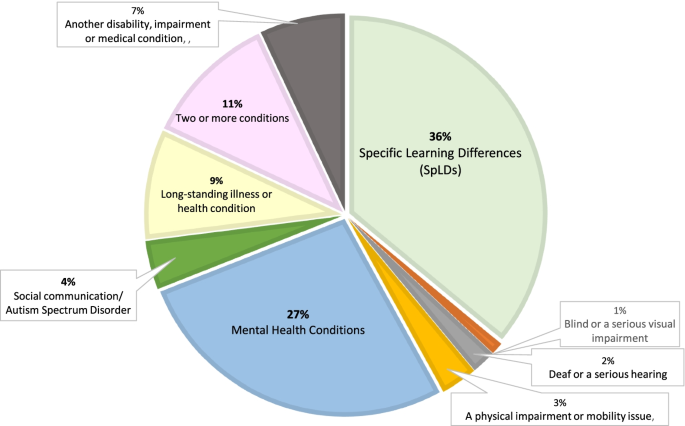
Disabled university students in the UK. Source: Table 15: UK-domiciled student enrolments by disability and sex , for the academic year 2018-19, (total number of disabled students 316,380) [ 22 ]. NB: There are high rates of overlap between ADHD and both SpLDs and mental health conditions, but the prevalence of ADHD is unknown, because there is no separate category for it
Figure 2 depicts in percentages published data from 25 HEIs in Ireland, based on a total number of 12,630 university students who declared a disability for the academic year 2016/17 [ 88 ]. There are clear similarities between this data and the HESA data depicted in Fig. 1 . But there are also differences in the numbers of university students who declared a mental health condition (27% in the UK vs. 13.9% in Ireland), a specific learning difference (UK 36% vs. Ireland 41.4%) and autism spectrum disorder/ASD (UK 4% vs. Ireland 5.4%). In Ireland, data is also collected on university students who declare a developmental co-ordination disorder (DCD, or dyspraxia, 6.1%) and ADHD (5.2%), but similar data is not collected in the UK. During the consensus meeting there was unanimous agreement that ADHD should no longer be subsumed under the category of a SpLD. The obvious consequence of continuing to do so is that a prevalence estimate for ADHD in UK university students will always be hard to ascertain.
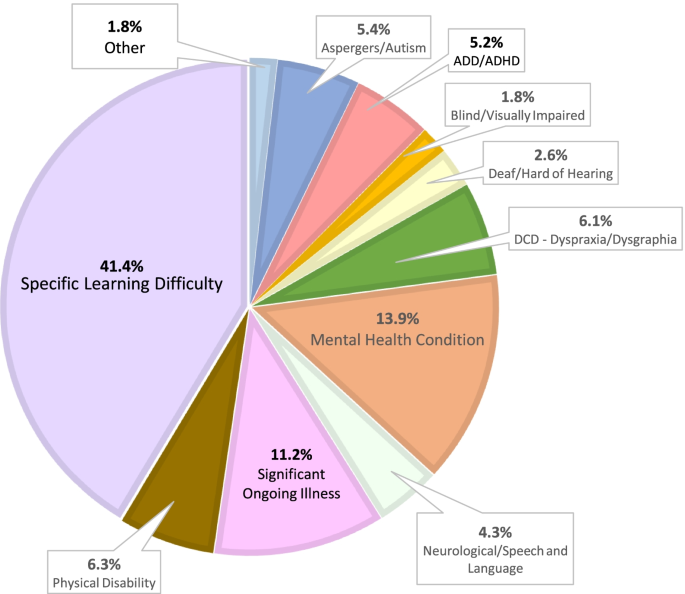
Disabled university students in Ireland. Source: Fig. 3 Breakdown of students by Category of Disability 2016/17 (total number of disabled students 12,630) [ 88 ]
Recommendation 1. The categorisation of ADHD
The expert group recommends that ADHD should no longer be subsumed under the category of a SpLD in HESA data return categories or by university services and should be coded or categorised separately. If ADHD continues to be coded or categorised as an SpLD then no specific data about the numbers of university students who declare ADHD as a disability within UK HEIs will be collected. ADHD is a mental health condition and not a SpLD. ADHD has specific diagnostic criteria within the DSM-5 [ 6 ], and ICD-11 [ 7 ], as well as efficacious treatments (medication and psychosocial interventions) [ 89 , 90 ]. A separate code to categorise ADHD within UK HEIs could result in greater recognition of the disorder and increase understanding about how it impacts on academic performance and achievement.
What are the differences between ADHD and SpLDs?
Dyslexia, dyscalculia, dysgraphia, and dyspraxia (or DCD) and ADHD are all categorised as SpLDs within UK HEIs. However, in the DSM-5, dyslexia, dyscalculia, and dysgraphia are grouped together under a single diagnostic category of “specific learning disorder” (SLD, or learning disorder), whilst DCD is classified separately as a motor disorder and ADHD as a neurodevelopmental disorder [ 6 ]. SpLDs are not synonymous with SLD, but a university student who has been diagnosed with a SLD can also expect to meet criteria for a SpLD, be registered as disabled and qualify for reasonable adjustments under the Equality Act 2010. Specifiers and characteristics of SLD and typical SpLD terms used in higher education are listed in Table 6 . Unlike ADHD, there are no known medical treatments for SLD (or SpLDs), therefore reasonable adjustments (or accommodations) are required to limit their impact within educational settings. Reading disorder (RD, e.g., dyslexia) is the most prevalent SpLD reported to account for up to 80% of all SpLDs [ 91 ]. Bidirectional comorbidity between RD and ADHD which is estimated at 25–40%, is likely due to shared genetic risk factors [ 92 ]. This may also explain why deficits in executive function are seen in both ADHD and RD [ 93 , 94 ]. Executive functions (EF) are described as a set of top-down mental skills essential for academic performance. In Table 7 , EFs are conceptualised in terms of their organisational and regulatory functions. The three commonly described EFs are inhibitory control, working memory and cognitive flexibility [ 95 , 96 ]. Although research suggests that deficits in EF can adversely impact academic functioning due to the problems they can cause with sustaining attention, forgetfulness, procrastination, organisation skills, prioritising, regulating alertness, emotional and behavioural self-control, psychometric tests of EF are still not sensitive enough to assess for the core deficits of ADHD [ 97 , 98 , 99 , 100 , 101 , 102 , 103 ].
The Baddeley and Hitch [ 107 ] conceptual model of working memory (WM) in Fig. 3 , proposes that WM is a core EF for storing and manipulating information, and with a central role in attention, allocating data to its slave systems (phonological loop and visuo-spatial sketchpad), performing task switching, mental arithmetic, problem solving and interfacing with long-term memory through the episodic buffer. The episodic buffer acts as a temporary store for the phonological loop, which processes spoken and written information, whilst the visuo-spatial sketchpad processes visual imagery. Although this model can be used to understand the importance of WM in academic tasks such as reading, comprehension, verbal reasoning (phonological loop), navigation (visuo-spatial processing) and problem-solving (central executive) [ 107 , 108 , 109 , 110 , 111 ], the model can also be used to understand how deficits in WM might occur in both ADHD and reading disorder [ 93 ]. Reading disorder (e.g., dyslexia) is defined by deficits in decoding the speech sounds of words and structure of language (phonological weakness), fluency (an inability to ready quickly with appropriate expression) and processing speed [ 11 , 91 , 93 , 102 ].
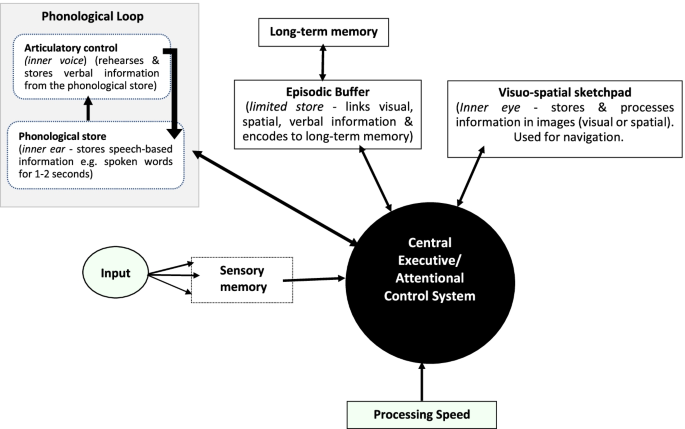
Model of Working Memory (Adapted from Baddeley [ 111 ]
Processing speed (PS) is not an EF per se, rather it is said to be a cognitive ability that describes the amount of time it takes to identify, understand, react, or respond to information received, whether it be visual (letters and numbers), auditory (language) or movement [ 112 ]. Since PS is surmised to impact on WM, phonological loop and visuo-spatial sketchpad processes, and the fine motor co-ordination associated with DCD, it’s impact on academic performance is also said to be direct [ 113 ]. PS is an index score on the WAIS (Wechsler Adult Intelligence Scale), measured by rapid automatized naming of pictured objects, letters, numbers, and colours [ 112 ]. Slow PS or PS deficits, often identified by a low PS score on the WAIS, has been associated with reading disorder [ 102 ], ASD and ADHD [ 114 ]. This also means when a student is identified with PS deficits on the WAIS for instance, certain academic tasks, such as an examination which requires “ an ability to quickly come up with an answer and retrieve information from memory ”, may take longer to complete, hence these students tend to be awarded extra writing time for examinations as a reasonable adjustment [ 115 ], p4). PS deficits are also implicated in the comorbidity between ADHD and reading disorder [ 116 ], the combined effect of which may produce more severe learning problems than when each of these disorders occurs on its own [ 11 , 117 , 118 ]. High rates of comorbidity are also reported between ADHD and other SpLDs (e.g., dyscalculia and dysgraphia), and other disorders such as DCD and ASD, with similar combined effects as those surmised between ADHD and RD, but a paucity of research limits understanding of the severity of cognitive deficits in these comorbidities and their impact on academic functioning [ 8 , 14 , 70 , 119 , 120 , 121 ].
Recommendation 2. ADHD and SpLDs
Comorbidity between ADHD and other neurodevelopment disorders, which include SpLDs, adversely impacts on academic functioning. The expert group therefore recommends screening for ADHD as part of routine practice for university students who report learning difficulties that seem to be associated with dyslexia, dyscalculia, dysgraphia, dyspraxia and/or ASD, not only because these conditions are highly likely to co-occur [ 8 , 11 , 14 ], but ADHD can be missed if a student is only screened for SpLDs and/or ASD. For students that screen positive for ADHD, a referral for treatment and management by a suitably qualified mental health professional (e.g., student health GP, psychiatrist, or mental health nurse/practitioner) is important. Although ADHD on its own can provide an explanation for learning problems within higher education, it can also add complexity to the learning problems associated with SpLDs, DCD or ASD. These complexities need to be considered when assessing for, and/or awarding reasonable adjustments. Screening tools that are used in routine practice are listed in Table 8 .
What are the differences between ADHD and other mental health conditions?
It is equally important to differentiate ADHD from other mental health conditions and to consider the impact of these conditions on university students with ADHD when they do co-occur. Year-on-year increases in the number of students declaring a mental health condition at university have been observed, with current prevalence estimates of 27% amongst university students who declare a mental health disability before or during their programme of studies (see Fig. 1 ). A study by Anastopoulos et al. [ 16 ] examined rates and patterns of co-occurring disorders in 443 university students with ADHD. The findings of this study revealed that 55% of these students had at least one comorbidity whilst 32% had two or more, and that commonly reported comorbidities with ADHD were depressive and anxiety disorders. These elevated rates differ from rates reported in an epidemiological study conducted in 20 high, medium, and low-income countries involving 26,774 adults with ADHD. This study found that 23% of these adults with ADHD had at least one mental health comorbidity, while 14% had two or three comorbidities, and that commonly reported comorbidities with ADHD were also anxiety disorders (34%), mood disorders (22%), as well as behavioural disorders (15%) and substance use disorders (11%) [ 10 ]. Similar findings were reported in qualitative studies, although the participants in these studies, also reported positive aspects of ADHD such as high levels of energy and drive, creativity, hyper-focus, agreeableness, empathy, self-acceptance, and a willingness to assist others [ 132 , 133 ].
During the consensus meeting the discussion mostly focused on university students who frequently reported anxiety and depression. Different types of anxiety (e.g., generalised anxiety disorder, social anxiety, specific phobias, agoraphobia, panic disorder, substance/medication induced anxiety ), or depressive disorders (e.g., mood dysregulation disorder, major depressive disorder, dysthymia, premenstrual dysphoria, substance/medication induced depression ), were discussed in relation to ADHD. Major depressive disorder (MDD) does show some overlap with ADHD symptoms such as poor concentration and working memory performance, but in MDD these characteristics are episodic and only arise during periods of low mood, anhedonia (loss of interest/enjoyment in ordinary experiences), or when there are ruminations dominated by negative content, and appetite disturbances, which are not characteristic of ADHD [ 134 ]. In contrast, people with ADHD usually present with attention regulation problems. This means they may be able to focus during highly stimulating or interesting tasks and activities, but problems with concentration will remain regardless of mood state [ 19 ]. Poor concentration and restlessness are also symptoms that are shared between anxiety disorders and ADHD. Anxiety disorders are characterised by fluctuations in pathologic worry, fear, and somatic symptoms, which drive concentration problems, whereas in ADHD, problems with attention and restlessness, drive concentration problems and reflect persistent traits that are independent of anxiety [ 134 ].
University students with ADHD can present to medical, counselling, and disability services with problems related to anxiety and/or depression, because challenges of university life can also play an important role in affected mental health. Both anxiety and depression are frequently co-occurring conditions in adults with ADHD [ 10 ], as well as in university students with ADHD [ 16 ]. However, it is still important to be aware that symptoms of ADHD can mimic both anxiety and depression [ 19 ], and that anxiety and depression can in turn affect attention, concentration, processing speed, and motivation, giving rise to poor performance on reading, writing, attending classes and group work [ 135 ]. University students with ADHD can also be prone to “test anxiety” and experience disabling levels of worry, emotional and somatic symptoms, that exacerbates their ability to focus and perform during evaluative assessments such as examinations. This may further increase the risk that they achieve poor grades, or delay completing their programme of studies [ 136 , 137 ]. More generally, symptoms of ADHD can be misdiagnosed for anxiety, mood, or personality disorders. This may be an issue for females with ADHD whose symptoms are more likely to reflect internalising symptoms and emotional dysregulation [ 138 ].
Emotional dysregulation is a prominent feature in ADHD and is listed in the DSM-5 as a characteristic that supports the diagnosis of ADHD [ 6 ]. Research suggests that up to 80% or more adults with ADHD report significant levels of emotional dysregulation/lability marked by irritability, volatility, a hot temper, low frustration tolerance and sensitivity to criticism [ 139 , 140 , 141 ]. These attributes do reflect a part of the normal range of mood symptoms for people with ADHD, but if severe, then they can also be misconstrued for MDD, bipolar disorder or a personality disorder. Emotional lability (EL) in adults with ADHD tends to manifest as short-lived emotional outbursts, or feelings of irritability, frustration, or anger that is often (but not always) in response to daily events [ 140 ]. Studies on EL in adults with ADHD also suggest that it is more closely linked to the development of low self-esteem and poor self-concept, when compared to the other core features of ADHD [ 140 , 142 ]. University students with ADHD who have problems with EL are more likely to encounter additional challenges with making and maintaining academic and social relationships [ 143 ], or with participating in group work, team sports, societies, or other activities at university, especially if they frequently express anger, sadness, or anxiety when with others [ 144 ].
University students with ADHD who do not cope well with anger or sadness may also use tobacco, alcohol, cannabis, or other drugs; sex, gambling, or gaming as coping strategies [ 145 , 146 , 147 ]. Some students with ADHD may not be able to control their alcohol intake for instance, and binge drink often or report more drinking-induced blackouts, loss of friends or romantic partners as a result of their drinking habits [ 147 ]. In the study by Rooney et al., [ 148 ], although students with ADHD did not report higher levels of alcohol use, they did report more dangerous/hazardous use. In another study when university students with ADHD escalated their substance use, they increasingly skipped classes and reductions in their academic grades were observed [ 149 ]. Although similar problems are seen in clinical practice with other drugs of abuse such as cocaine [ 150 ], some drugs are used to control symptoms of ADHD. For example, cannabis may help reduce some ADHD related problems such as restlessness, EL and problems getting to sleep [ 151 ]. In contrast to poor mental health, emotional wellbeing is increasingly being viewed as important for enhancing a student’s motivation to learn, academic performance and interpersonal skills. Studies have shown that reducing stress, and increasing enthusiasm, contentment, joy, hope, pride, exuberance, and elatedness are linked to improvements in academic self-efficacy, interest, effort, engagement, performance, and achievement [ 152 , 153 , 154 , 155 , 156 ]. There are also positive aspects of ADHD that can be useful at university [ 133 ].
Recommendation 3. ADHD and mental health conditions
The expert group recommends that university students who present with enduring anxiety and depression, and report persistent problems with learning or studying, should be screened for ADHD. ADHD can mimic these conditions, and likewise, anxiety and depression can mimic ADHD. Anxiety and depression may also reflect a normal stress response to the educational and psychosocial impairments of ADHD. Screening for ADHD should therefore be conducted in all students diagnosed with, or frequently complaining about, anxiety or depression (or other chronic mental health problems), particularly when they are taking medication and there is no or only limited improvements in their mental state. For students that screen positive for ADHD, a referral for treatment and management by a suitably qualified mental health professional (e.g., student health GP, psychiatrist, or mental health nurse/practitioner), is important.
What is the impact of stigma on university students with ADHD?
Stigmata are the beliefs, attitudes and structures that interact at an individual, group, or institutional level, to discriminate against a person based on a perceivable social characteristic that sets them aside from others [ 157 ]. ADHD, a diagnostic label, is a perceivable social characteristic that can be stigmatised as laziness, bad behaviour, or as having “special needs” [ 158 , 159 ]. There are lingering myths, misconceptions, negative stereotypes, and labels associated with ADHD [ 160 ]. Some medical professionals in the UK, Europe, and Australia, have expressed doubts about whether ADHD is real, over-emphasising the aetiological role of parenting, or questioning the role of stimulant medication in its treatment [ 161 ]. In one study a group of university students were asked to rate the likelihood of interacting with, collaborating on a group project with, getting to know, becoming friends with, living with, working with, or dating a peer with either ADHD, a general medical condition, or an ambiguous flaw such as perfectionism. Peers with ADHD were rated as less socially desirable than peers in the other two groups [ 162 ]. In young people with ADHD, although self-stigma can present as a sense of feeling different from same age peers or by negative self-evaluations, some young people have also challenged ADHD related stigma by openly disclosing and talking about their diagnosis [ 163 ].
Some professionals may fear treating a “fake disease” or causing a drug dependency by prescribing stimulant medication, even though there is no empirical evidence to support these views [ 50 , 158 , 164 ]. Missing or failing to identify ADHD is more likely to happen in university students who are intellectually gifted, getting good grades, or in those, particularly females, who may be misdiagnosed with anxiety, depression, eating or personality disorders [ 50 , 138 , 158 ]. Some studies from the USA suggest that university students without ADHD can malinger for the purposes of obtaining a prescription for stimulant medication for use as “study drugs” [ 165 , 166 ]. Malingering with ADHD for this purpose may be a phenomenon more often observed in the USA, where ADHD is more commonly diagnosed and treated in primary care. This is not the same as in the UK and Europe more generally, where ADHD in adults is an under-diagnosed and under-treated condition and suitably qualified and trained medical or non-medical prescribers (e.g. mental health nurses or pharmacists) treat ADHD [ 19 ]. From the perspective of the expert group, concerns about malingering can further stigmatise university students with ADHD in the UK, as well as discourage disclosure, bias the way a screening or diagnostic assessment is conducted and result in a failure to recognise a legitimate disorder with an effective treatment. The experience of the expert group is that malingering with ADHD is not common (even unusual) for university students in the UK. Instead, they tend to work exceptionally hard to overcome their deficits associated with ADHD and still experience academic outcomes that fall below that expected from their general intellectual ability. The need to tackle the stigma associated with ADHD was discussed during the consensus meeting, in terms of how it deterred disclosure, seeking a formal diagnosis, taking medication, or seeking additional support. Concerns about disclosing ADHD (or other mental health conditions) were also noted in the Institute for Employment Studies report to the Office for Students [ 52 ].
Recommendation 4. ADHD and stigma
The expert group recommends that targeted programmes of training for university student support staff should include psychoeducation, how to screen for ADHD and use recommended strategies for supporting university students with ADHD. This training can also be used to raise awareness about the potential stigma associated with ADHD, its consequences and potential impact on the screening and diagnostic process, willingness to disclose ADHD at university and accept treatment.
What is best practice for supporting university students with ADHD?
In the UK, clinical guidance recommends that the medical diagnosis of ADHD must be done by a suitably qualified practitioner, and with primary care staff providing support through shared care protocols [ 50 ]. The expert group is aware that at present, waiting times for access to treatment via specialist NHS adult ADHD clinics can be anything of up to two years or longer in some areas of the country. Given the high cost of tuition fees for university and living expenses, plus added pressures to complete a university degree on time, students with ADHD simply cannot afford to wait two or more years to access treatment in specialist NHS services, without risking poor academic performance, failure, drop-out or increased burden of illness. For some of these students the misuse of caffeine products, cannabis, alcohol, or stimulants (licit or illicit) may seem like attractive options for self-medication. Seeking an educational diagnosis of a SpLD, funded through the university disability service, maybe an attractive option that can enable access to educational support. But if the core symptoms of ADHD remain untreated, students with ADHD can continue to experience learning (and possibly other) problems during their time at university.
In one systematic review of 176 studies about the long-term educational outcomes of untreated versus treated ADHD, academic outcomes were found to be worse in students with untreated ADHD when compared to their non-ADHD peers, after controlling for IQ [ 18 ]. Another finding was that academic outcomes improved significantly when multimodal treatment was used, in comparison to when pharmacological or non-pharmacological treatments were used alone [ 18 ]. The provision of rapid access to treatment for university students with ADHD maybe challenging for clinicians working in specialist NHS services. But the expert group has found that some HEIs are using funds from their disability services budget to fund private diagnostic assessments for their students, and are commissioning medical treatment (e.g., bespoke services through the NHS or privately). These HEIs in turn note these initiatives in their “access and participation plans” (APPs) for the OfS, to demonstrate how they are improving equality of opportunity for students with ADHD, who traditionally experience poor educational access, achievement, and attainment [ 21 ].
Recommendation 5. Service provision
The expert group recommends that a rapid access pathway of care for university students with ADHD be developed collaboratively between university central support services, and NHS primary and secondary care, or private providers. University disability services currently fund diagnostic assessments for SpLDs. This budget could also be made available to university students with ADHD to enable them to at least obtain a diagnostic assessment and reasonable adjustments. The expert group provides an example of a potential support pathway for university students with ADHD, which is presented in Fig. 4 .
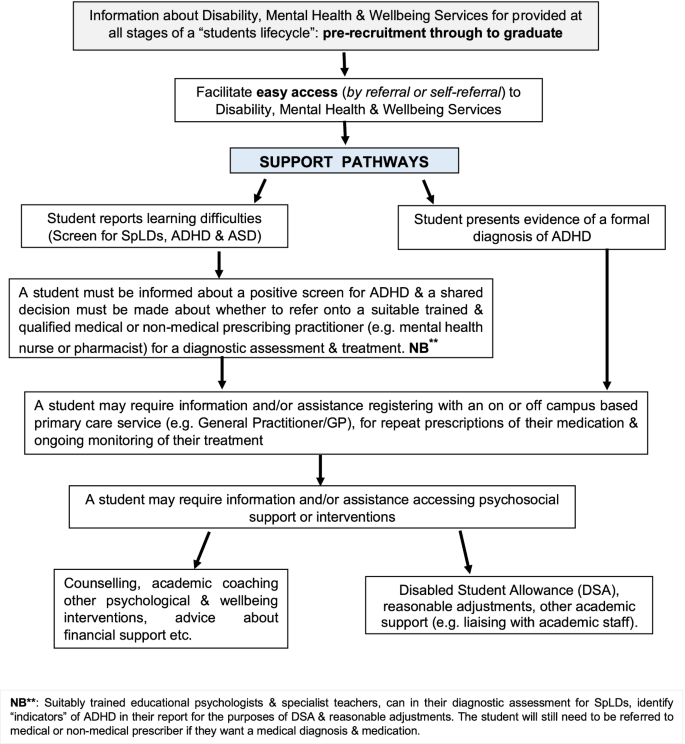
Potential Support pathway for university students with ADHD
Which screening tools and diagnostic assessments are useful?
Screening tools are used to indicate if symptoms of ADHD and/or any other co-occurring conditions that are likely to complicate the learning problems that university students with ADHD are present or not. Screening for ADHD and other potential comorbidities is done routinely in clinical practice, because it’s important to differentiate the conditions underlying the student’s presenting symptoms and consider whether they may or may not require additional reasonable adjustments or support from other services (e.g., GP, mental health, or counselling). A widely used screening tool for ADHD based on DSM-5 diagnostic criteria, is the World Health Organisation Adult ADHD Self-Report Scale (ASRSv1.1) [ 122 ], now updated to an online DSM-5 version (see Table 8 for further details and weblinks). The 18-item ASRS consists of all the diagnostic symptoms of ADHD and is useful as a screener for gathering information about ADHD symptoms that can be examined more in-depth during a diagnostic assessment. If the ASRS screener is positive for ADHD, and there are indications of sustained difficulties with attention, motor restlessness/overactivity or impulsive behaviour, then it must trigger a full diagnostic assessment by a suitably qualified practitioner.
The SpLD Assessment and Standards Committee (SASC) guidance for the assessment of ADHD, also states that “ practitioner psychologists and specialist teacher assessors who have relevant training can identify specific learning difficulties and patterns of behaviour that together would strongly suggest a student has ADHD; and in this situation they can make relevant recommendations for support at Further and or Higher Education institutions. Such diagnostic assessments should be accepted by SFE in support of an application for Disabled Students’ Allowance ” [ 167 ], p.2). This means university students can have indicators of ADHD identified as part of a SpLD diagnostic assessment and then use their diagnostic report to apply for reasonable adjustments and DSA (Disabled Student Allowance). However, even with additional educational support in place (e.g., DSA, reasonable adjustments, or sessions of study skills), ADHD can continue to impair academic functioning if it remains untreated [ 18 ]. In a few cases it can be hard to tell if ADHD with or without co-occurring learning disorders or mental health symptoms, including intellectual giftedness, are different facets of the same condition or reflect separate disorders [ 168 ]. For instance, a student with undiagnosed ADHD who keeps performing badly academically, despite studying extra hard, may start to worry excessively or feel like a failure and then become depressed. This student may seek help because they are feeling anxious or depressed, but in fact the underlying condition is ADHD.
There are effective screening tools for anxiety, depression and substance misuse that can be used with university students with ADHD. The 10-item Kessler Psychological Distress Scale (K10) can be used to screen for anxiety and depression [ 125 ], or the 16-item Penn State Worry Questionnaire (PSWQ) can be used to screen for pathological worry, which is a dominant feature in generalised anxiety disorder [ 126 ]. There are useful screening tools in the appendices of the Improving Access to Psychological Therapies (IAPT) manual, including the Generalised Anxiety Disorder scale (GAD-2, GAD-7), Panic Disorders Severity Scale (PDSS), and the Patient Health Questionnaire (PHQ-9, for depression) [ 128 ]. The Simple Screening Instrument for Substance Abuse (SSI-SA) (Center for Substance Abuse Treatment, 1994) is widely used as a brief screen by practitioners and assessors with little experience of substance misuse [ 127 ]. NICE clinical guidance [CG123] also offers very clear advice and guidance for screening common mental health disorders, and recommends that if a practitioner conducting the screen identifies a possible anxiety disorder or depression, and they are not competent to perform a full mental health assessment, then they must refer the student to an appropriate healthcare professional [ 169 ].
Some students may have additional problems related to a SpLD (e.g., dyslexia) or ASD. Useful screeners for these conditions are the Adult Dyslexia Checklist which is available for free from the British Dyslexia Association website [ 124 ], and the Autism-Spectrum Quotient (AQ-10), is also available for free download [ 123 ]. If a student with ADHD screens positive for a SpLD or ASD, then a shared decision with the student can be made about the usefulness or value of a referral for a diagnostic assessment of these comorbid conditions. It might be for example, that a positive screen of either condition and careful questioning about functional impairments, will be enough to assess their impact on studying and how best to mitigate them with additional support (e.g., counselling, specialist mentoring, academic coaching, extra writing time for examinations). There is also evidence which suggests that once the core symptoms of ADHD are treated, problems related to co-occurring SpLDs, ASD traits, anxiety or depression may in turn improve [ 9 , 158 , 170 ]. During the shared decision-making process, an agreement with the student can be also reached about whether to include results of a positive screen for a SpLD and/or ASD in their diagnostic report, which can include a write-up about the potential complexities these conditions might add to a student’s ability to study effectively. Further details and weblinks for the screening tools are provided in Table 8 .
At present there are no neuroimaging, genetic, neurochemical, or neuropsychological diagnostic tests for ADHD that are sufficiently sensitive or specific. Neuropsychological tests such as Stop Signal Reaction Time, IQ, or various computerised tests of executive functions (e.g., CANTAB) or QB-Test, can however, complement a diagnostic assessment for ADHD and provide additional information about cognitive performance [ 171 ]. Some authors (e.g., Brown [ 98 ], conceptualise ADHD as a disorder of executive function (EF), and many learning problems that university students with ADHD experience may be due to deficits in EF (e.g., poor organisation, planning and time management skills, inattention, or emotional lability) [ 172 ]. Although these EF deficits are not well reflected in cognitive performance tests [ 173 ], an assessment of EF behaviours such as those captured by the BRIEF questionnaire are strongly related to ADHD and associated functional impairments [ 174 ]. The recommendation of the expert group (and all national/international guidelines) is that a diagnostic assessment for adults with ADHD should be based on self-reported symptoms, which are best obtained by using a semi-structured in-depth diagnostic interview. An example of such a tool is the “Diagnostic Interview for Adult ADHD” (DIVA-5), which is based on the symptom and impairment criteria of the DSM-5 [ 129 ]. The ACE+ is another diagnostic tool that can be useful, and it has the option to use either DSM-5 or ICD-11 diagnostic criteria [ 130 ]. The DIVA-5 is available for a one-off fee of 10 Euro whereas the ACE+ is free to download, with digital versions in English and other languages (see Table 8 for further details and weblinks). Collateral information can also be obtained from informants such as close friends or relatives, and school records, especially for the evaluation of age of onset.
ADHD in adults is diagnosed when 5 or more symptoms of inattention and/or hyperactivity-impulsivity are present, and with several of them being present before 12 years old. These core symptoms must have persisted for at least 6 months, and in clinical practice the expectation is of a chronic trait-like course from the age of onset during childhood or early adolescence. The symptoms of ADHD should be to a degree that is inconsistent with the developmental level for that individual and must cause functional impairments in 2 or more settings (e.g., at home, university, work, with friends or relative, or in other activities) [ 6 ]. During the diagnostic process conducting a detailed evaluation of how the student’s presenting symptoms impact on their academic productivity is essential. Potential education-related impairments due to ADHD are listed in Table 9 . Individually assessing and writing about education-related problems in the student’s diagnostic report will help practitioners working in student disability services to devise personalised support, as well as allow for the effectiveness of this support to be evaluated. The Weiss Functional Impairment Rating Scale – Self Report (WFRIS-S), is a useful tool for assessing and monitoring changes in functional impairments associated with ADHD in different domains [ 131 ].
Practitioners and assessors need to be aware that ADHD symptoms and functional impairments present differently in each student and their impact can also change over the course of their programme of studies [ 19 ]. The experience of the expert group is that some students meeting diagnostic criteria for ADHD may not want to take prescribed medication in the first instance. But as their programme of studies progresses this may change, and the student may want and require medication to reduce core symptoms of the disorder. While psychoeducation, and environmental modifications (including reasonable adjustments) can help support university students with ADHD (and may be sufficient in some cases), only medication has been found to reduce core symptoms [ 89 ]. It is the experience of the expert group that university students with ADHD often have well developed compensatory strategies such as being overly organised, almost in an obsessive manner, or studying extra hard for long periods of time to ensure adequate performance. They may also have lost the usual structured support of parents and school when they were younger, so that impairments can increasingly accrue as their course develops. During diagnostic assessments, some students can find it hard to remember what their ADHD symptoms and impairments may have been like during childhood. When this happens, it is best to focus on their presenting symptoms and establish whether at least 5 or more of them are currently present and cause impairment, then track back in time to establish as far as possible an age at which current symptoms started.
In most cases of ADHD an individual is unable to identify a clear age of onset and they have the perception that the symptoms were always present. A typical response is that the symptoms have been present for as long as they can recall. Remembering symptomatic behaviours in childhood is especially hard when the student’s parents or other care givers have given them a lot of support during their academic career, or provided them with structure and routine, or when the student, had predominantly inattentive symptoms in childhood, that were not noticed either by their parents or teachers. This is more likely in females (and some men) with ADHD, who tend to present with predominantly inattentive symptoms and few hyperactive-impulsive symptoms or less disruptive behaviour [ 50 , 138 , 175 ]. The gender bias in ADHD seems to become less skewed in adulthood when women with ADHD may be diagnosed, often for the first time [ 138 ]. Practitioners and assessors conducting a diagnostic assessment need to be aware that female students can present with study related problems due to ADHD for the first time whilst at university. These students may or may not have a previous diagnosis of another mental health condition, which will need to be reviewed if they are diagnosed with ADHD [ 138 ].
During face-to-face diagnostic assessments, compensatory strategies can be minimised. For instance, the student may not recognise that sustaining attention or organisation is problematic for them, when a more objective appraisal suggests that this is a persistence problem. This can occur because symptoms of ADHD reflect lifelong traits, or because the student has well developed compensatory strategies. When this happens, it’s best to assess the degree of effort that the student needs to put into maintaining a compensatory strategy (for example, if the student did not put in extra effort to be organised then what would happen ?). Students with severe ADHD may be easier to screen and diagnostically assess, but if these students have developed good compensatory strategies (as discussed in the section on intellectual giftedness), it can be hard to determine how severe and impairing their ADHD symptoms are in other functional domains (e.g., social relationships). It may also be at a time when compensatory strategies are sufficient to mitigate ADHD related impairments, but this may not always be the case as their programme of studies progresses. Some students may present with “subthreshold symptoms” of ADHD (i.e., symptoms just below the threshold for a diagnosis of ADHD to be made), yet they appear to be significantly impaired by these symptoms and therefore need additional support, and perhaps treatment. The experience of the expert group is that impairments are also informed by co-morbidities and that several sub-threshold comorbidities (particularly of neurodevelopmental disorders) can be more impactful than a single disorder above the diagnostic threshold [ 176 ].
Recommendation 6. Screening tools and diagnostic assessments
The expert group recommends that practitioners and assessors be given training in how to screen for and diagnostically assess ADHD using robust and evidence-based rating scales, screening tools, and standardised clinical interviews. This training should include how to conduct a detailed evaluation of education related functional impairments, write up a diagnostic report with recommendations for reasonable adjustments and make a direct referral for medical treatment if requested, to a suitably qualified practitioner with expertise in the management and treatment of ADHD in adults (e.g., a psychiatrist or mental health nurse/pharmacist non-medical prescriber). A list of standardised screening and diagnostic tools are presented in Table 8 below.
What pharmacological and non-pharmacological interventions are useful?
Following initial psychoeducation about ADHD and its impact, NICE guidance [ 50 ] recommends making “environmental modifications”. In the context of university students with ADHD environmental modifications can take the form of “reasonable adjustments” to programmes of study under the Equality Act 2010. Potential learning problems associated with ADHD and potential reasonable adjustments are listed in Table 9 . Adjustments can also be made to study environments (e.g., making available a quiet study room in the library, recommend taking frequent breaks when studying, breaking down daily targets, using digital diaries and reminders, regular forms of exercise) [ 172 ]. If these adjustments/ modifications have been applied and functional impairments continue in at least one domain (e.g. academic performance, or studying/learning difficulties), then medication should be considered.
NICE guidance [ 50 ] recommends psychostimulant medication (i.e., methylphenidate or lisdexamphetamine) as first-line medical treatment for ADHD in adults. Psychostimulant medications are among the most effective medications in use within adult mental health [ 89 ], and among the most efficacious of all common medical drugs [ 177 ]. Stimulant medications often produce a substantial reduction in ADHD symptoms and associated impairments. However, stimulant medications can also have adverse effects, which in most cases are either dose-related, mild, or transient such as headache, reduced appetite, nausea, palpitations, difficulty falling asleep and dry mouth [ 89 ]. In a few cases, these adverse effects may be undesirable, and an individual may decide to stop using stimulant medication. Stimulant medications can also increase blood pressure and heart rate, therefore people who take these medications are assessed at baseline and monitored during their treatment [ 50 ]. Empirical research about the efficacy of treating university students with ADHD is rare and the extent to which prescribers consider the unique demands of university life when prescribing medication to students is unknown [ 178 ].
The first randomised controlled trial of lisdexamphetamine with a sample of 24 university students diagnosed with ADHD was conducted by DuPaul et al., [ 179 ]. In this study, lisdexamphetamine was administered over a 5-week period and large reductions in the students ADHD symptoms were observed, alongside improvements in their task management, planning, organisation, use of study skills and working memory. Although the short duration of this study precluded an assessment of academic functioning over the long-term, in other studies, university students with ADHD who took medication did report improvements in their note taking, scores on tests, writing output and completion of course work [ 180 ]. In a pharmaco-epidemiological study from Sweden young people with ADHD taking medication were also found to have better scores in standardised university entrance examinations when compared to peers with ADHD not taking medication [ 181 ]. It is noted, however, that a substantial number of university students with ADHD do not take their medication as prescribed [ 182 ]. Some university students with ADHD may use their medication flexibly, with optimum dosing during times of writing assignments or studying for examinations and then no medication on days without academic work, e.g., at weekends or during holidays [ 183 ]. When treating university students with ADHD, prescribing practitioners therefore need to be open to discussing the benefits and drawbacks of flexible dosing with students and be willing to offer appropriate guidance and advice [ 184 , 185 ].
Non-pharmacological interventions
The view of the expert group is that non-pharmacological interventions are particularly important for university students who want or need to learn how to best manage their ADHD and overcome the learning difficulties that they experience. Medication alone maybe sufficient for a subgroup of university students, but persistent difficulties are more often seen, and additional support maybe required. Non-pharmacological interventions begin with psychoeducation. The experience of the expert group is that newly diagnosed students are keen to have a conversation about their diagnosis, including whether or not to disclose it to academic staff or future employers, the benefits, and drawbacks of taking medication, including flexible dosing, “drug holidays”, effects of medication on alcohol or other drugs, the positive attributes of ADHD (e.g., creativity), psychological interventions and reasonable adjustments. Research about the effectiveness of non-pharmacological interventions for adults with ADHD is mixed and inconclusive, but positive effects have been reported for mindfulness on core symptoms of ADHD including mind wandering [ 186 ], dialectical behaviour therapy (DBT) and cognitive behavioural therapy (CBT) [ 187 , 188 , 189 ].
Although research about non-pharmacological interventions for university students with ADHD is limited, new studies have been published. For instance, Anastopoulos et al. [ 190 ] and Eddy et al. [ 191 ] reported on the findings of a randomised controlled trial (RCT) that examined the efficacy of a CBT based program called ACCESS (Accessing Campus Connections and Empowering Student Success) for university students with ADHD. During the ACCESS program - psychoeducation, cognitive and behavioural strategies targeting executive function (EF) and patterns of maladaptive thinking, were delivered. Participants, who met DSM-5 diagnostic criteria for ADHD and were taking medication, were recruited from two large public universities in the USA and randomly assigned to either the ACCESS program group ( n = 119) or a Delayed Treatment Control (DTC) group ( n = 131). The findings revealed that the ACCESS program group participants self-reported significant improvements in their knowledge of ADHD, symptoms of inattention, EF, utilisation of disability accommodations (or reasonable adjustments), as well as a moderate decline in maladaptive thinking, when compared to DTC group participants. However, neither ACCESS program and DTC group participants reported significant improvements in their interpersonal functioning and educational outcomes (grade point average/GPA and course grade completion). The authors concluded that the ACCESS program made a large difference to the participants core symptoms of ADHD and EF.
Indeed, as noted previously, EF deficits have been shown to mediate the association between ADHD and impairments in academic functioning [ 100 ]. The finding that the ACCESS program positively impacted on the participants EF is therefore encouraging. It also supports the findings of an earlier pilot study about a CBT based group intervention to enhance EF functioning in university students with ADHD [ 172 ], and strengthens a more recent finding about how steep temporal discounting may play a key role in the daily life challenges that university students with ADHD encounter. Temporal discounting (TD) describes how the subjective value of a reward significantly declines when the said reward is delayed [ 192 ]. In a pilot study by Scheres and Solanto [ 193 ], steep TD was not only associated with combined type ADHD, specifically the hyperactivity-impulsivity symptom domain, but also with poor utilisation of learning and/or study skills. TD was therefore postulated to be an important target for EF interventions for university students with or without ADHD [ 193 ], more so for interventions that were designed to activate and sustain motivation to pursue a long-term goal for a reward, such as pursuing and completing a university degree [ 194 ]. Findings like this could be useful for enhancing the effectiveness of CBT based interventions for university students with ADHD like the ACCESS program, by for example, tailoring EF interventions to also target TD. Maybe this could improve educational outcomes and perhaps interpersonal functioning of university students with ADHD, which in the study reported by Anastopoulos et al. [ 190 ] showed no significant improvements.
The report that the ACCESS program made a large difference to the students’ core symptoms of ADHD, seems to contradict what the World Federation of ADHD international consensus statement acknowledged about good treatments for ADHD being available, but even the best treatments are only partially effective [ 164 ]. Overall, there is only low-quality evidence that CBT interventions might be beneficial for treating core symptoms of ADHD in adults, in the short-term, or for improving co-occurring symptoms of anxiety and depression [ 164 , 195 ]. It was noted by Anastopoulos et al., [ 190 ], that participants in both study groups increased their use of ADHD medications over the course of the study. Perhaps this was the real reason that the participants core symptoms of ADHD improved. After all, this is what ADHD medications are designed to do and treatments for ADHD usually become more effective when medication is combined with a CBT intervention [ 195 ], or when multimodal interventions are used [ 196 ].
Hence academic coaching, which tends to be a derivative of CBT, could be another useful intervention for optimising coping strategies in university students with ADHD. For instance, coaching has been used to help identify study goals, develop study plans and strategies for achieving these plans, monitoring their progress towards attaining them and to foster self-determination [ 197 ]. In one study, academic coaches helped university students with ADHD to develop better time management, organisational skills, pay more attention in classes and to take good notes, and improvements in these skills were observed after 8 weeks [ 198 ]. In another study, university students with ADHD reported that academic coaching had helped to enhance their self-discipline, self-efficacy, study skills, ability to formulate realistic goals and to think more about long-term goals and maintain motivation to achieve them [ 199 ]. Additional benefits of coaching can be in helping university students with ADHD feel more in control of their emotions and behaviours in the face of external demands [ 200 ]. Academic coaching (or specialist mentoring, or specialist one-to-one study skills support), can also be funded via DSA as specialist access and learning facilitators (Band 4). Academic coaching, supportive counselling and/or CBT, whether delivered face-to-face or online can be effective non-pharmacological interventions for university students with ADHD [ 188 , 189 , 201 ], and the potential of these interventions to improve academic performance is evident in the promising results of recent studies e.g. [ 172 , 190 ].
Recommendation 7. Multimodal interventions
The expert group recommends multimodal interventions for university students with ADHD, that comprise a variety of interventions including environmental modifications, psychoeducation, medication, academic coaching, DBT, CBT, counselling and/or mindfulness-based interventions. University counselling and disability services do tend to offer a range of psychosocial interventions for students, whether delivered online, face-to-face or in a group.
What are the staff training and developmental needs?
In the Institute for Employment Studies report to the Office for Students, practitioners working in university disability services identified a need for training and development to enable them to both support university students with ADHD and the academic staff working with them [ 52 ]. The SpLD Assessments and Standards Committee (SASC) [ 167 ], also recommended that practitioner psychologists and specialist teacher assessors require appropriate training to identify “ specific learning difficulties and patterns of behaviour that together would strongly suggest that a student has ADHD ” (p.11). The need for staff training and development was discussed during the consensus meeting, and it included training in how to liaise with and refer university students with ADHD to a suitably qualified practitioner for a diagnostic assessment (e.g., a psychiatrist, mental health nurse/ pharmacist non-medical prescriber). Practitioners and assessors seemed keen to receive “certified training” as a way to achieve the SASC recommendations for “appropriate training”. A certified educational programme about ADHD at university level 6 or 7, could be developed and delivered for example online, as a post-qualification professional training or continuous professional development (CPD). But at present, no such course/programme exists in the UK. UKAAN offers training for healthcare professionals and can deliver bespoke training to practitioners and assessors who work with university students, and some disability services have already done so. During the consensus meeting some practitioners and assessors said they often gained relevant experience by having previously worked, or currently working, with university students with ADHD or through their own personal lived experiences, and that they made use of these experiences in their role.
Recommendation 8. Training and development
The expert group recommends that staff training, and development be prioritised under the inclusive practice agenda in higher education. This training should include psychoeducation, procedures for screening and assessing for ADHD, and useful strategies for supporting university students with ADHD. This will enhance the knowledge and skills of practitioners and assessors who work with and/or support university students with ADHD.
Discussion & conclusion
This was a report of the UKAAN expert consensus meeting about university students with ADHD, which was held before the COVID-19 pandemic. Since then, the pandemic has altered higher education in a monumental way. When lockdown was first imposed in the UK, university campuses were suddenly closed. Students and staff had to quickly adapt to online delivery of lectures and classes, and there was uncertainty about being able to access digital technologies and quite places to study or work at home. There was also confusion among students about study expectations, assessments, workloads, retention, and completion [ 202 , 203 , 204 ]. Undoubtedly the pandemic has caused much suffering, frustration, fear, loss and other negative thoughts, emotions, and experiences for many people, including university students with ADHD [ 205 ]. However, findings about the impact of the pandemic on university students has been mixed. Frampton and Smithies [ 206 ], reported on a Students Minds survey about life during the pandemic involving 1100 university students. The findings of this survey revealed that 74% of respondents reported that the pandemic had a negative impact on their mental health and wellbeing, whilst only 10% of respondents reported positive effects. In this survey, disabled and non-disabled students were also asked whether they agreed or disagreed with the statement “ online learning has allowed me to engage with my course more positively ”, and the findings revealed that 59% of disabled students compared with 55% of non-disabled students disagreed with the statement. This also suggests that just under-half of these students agreed with the statement. In another study, 79 university students in one Faculty of Life Sciences were surveyed and participated in focus groups about how they experienced the sudden shift to online learning during the lockdown [ 207 ]. This study found that 75% of the students who participated in the study, reported that their life had become more difficult and 50% reported that learning outcomes would be hard to achieve, but after 12 weeks into the lockdown, corresponding rates changed to 57 and 71% respectively [ 207 ].
The findings of existing studies do suggest that during the COVID-19 lockdown, virtual learning for some university students may have had benefits such as enabling greater attendance, engagement, and participation in teaching sessions, especially for students who previously felt anxious about asking questions in front of others or some disabled students [ 202 ]. Students who were used to spending time online – on the Internet including social media platforms for example, seemed to exhibit strong motivation for eLearning, and reported lower levels of distress during the pandemic [ 208 ]. However, there are also concerning reports about ADHD being a risk factor for COVID-19 infection [ 209 , 210 ]. These reports are perhaps pertinent for university students with ADHD who may have participated in demonstrations during the pandemic such as Black Lives Matter (BLM), living arrangements in student halls of residence, sexual harassment, assault and “rape culture” in UK universities [ 206 , 211 ], or illegal COVID raves [ 212 ], or the COVID anti-vaccine and lockdown protests [ 213 ]. It can be argued that the pandemic may have longer-term negative consequences on current and future career prospects for university students with ADHD, but outside of this, no firm conclusions from the existing research can be drawn.
Evidence is stronger for poor education (or academic) performance and achievement having a long-term negative impact on mental health, wellbeing, and socio-economic outcomes [ 214 ]. Even though there is a paucity of research about university students with ADHD in the UK and rest of Europe, the importance of attending to the mental health of university students in the UK has been recognised. The Royal College of Psychiatrists recently published a college report on the mental health of higher education students, and Sedgwick-Müller et al., contributed a section on ADHD in this report [ 1 ]. The expert group is also aware that ADHD is a hidden disability within UK HEIs and its categorisation as a SpLD may be contributing to this, therefore university students with ADHD continue to be at risk of marginalisation and disadvantage. The expert group recommends that ADHD should be catered for under a separate category within UK HEIs, as this may enable greater recognition of ADHD and for its impact on learning within higher education to be adequately assessed and mitigated. With aspirations towards widening participation and inclusive practices in higher education [ 52 ], understanding exactly “what works” best for university students with ADHD is imperative. The four key stages in a student’s lifecycle are access to higher education (the extent to which students can gain entrance to different types of HEIs), retention (the likelihood of continuing or withdrawing from a programme of studies), attainment (the extent to which university students are enabled to achieve their full academic potential) , and progression (successful transitions within a programme of studies and afterwards into employment or further study )” [ 215 ], p.5). Each of these 4 key stages in a student’s lifecycle can be adversely affected by either having and/or not recognising ADHD, and by delaying access to a screening, diagnostic assessment, treatment, and educational support. Interventions in a student’s first year at university, according to Clery and Topper, should focus on enhancing their academic achievement because retention, attainment, and progression tends to be more favourable for university students who perform well academically in their first year [ 216 ].
In summary, UKAAN convened an expert consensus meeting to provide an informed understanding about the impact of ADHD on the educational (or academic) outcomes of university students and to highlight an urgent need for timely access to treatment and management. An overview of key issues, as well as expert advice and guidance has been offered. In Table 10 below, the main recommendations of the expert group are summarised. There is little doubt that university students with ADHD are struggling with long delays in accessing a diagnostic assessment, treatment, and personalised educational support. The provision of rapid access treatment and care pathways can be challenging for clinicians working in specialist NHS ADHD clinics, but examples of good practice are also beginning to emerge, with some university disability services drawing on their own budgets to support their students. Further work is needed to develop and evaluate efficient and cost-effective treatment and care pathways for university students with ADHD (for example see Fig. 4 ), and to adopt models of best practice across the sector. University students, including those with ADHD, are at a crucial transitioning stage in life and their success at university is likely to determine their success in highly competitive employment markets. This strengthens the argument to support all university students in an inclusive manner. Methods for inclusive teaching and learning are also likely to cater to disabled students, including university students with ADHD.
Availability of data and materials
Data sharing is not applicable to this article as no data sets were generated or analysed during the study.
Abbreviations
ADHD Child Evaluation
Association for Higher Access & Disability
Attention Deficit Hyperactivity Disorder
American Psychiatric Association
Autism-Spectrum Quotient
Autism Spectrum Disorder
Adult ADHD Self-report Rating Scale
Canadian ADHD Practice Guidelines
Cognitive Behavioural Therapy
Diagnostic Interview for ADHD in adults
Dialectical Behavioural Therapy
Disabled Students Allowance
Developmental co-ordination disorder
Diagnostic and Statistical Manual of Mental Disorders version 5
Emotional lability
Executive Functions
Institutions of Higher Education
The Higher Education Statistical Authority
Improving Access to Psychological Therapies
Institute of Employment Studies
Major Depressive Disorder
Math Disability
National Health Service
National Institute for Health and Care Excellence
Office for Students
Panic Disorders Severity Scale
Patient Health Questionnaire
Processing Speed
Penn State Worry Questionnaire
Quantified Behavior Test
Reding Disability
Special Educational Needs and Disabilities
Special Educational Needs
Specific Learning Disorders
SpLD Assessment and Standards Committee
Specific learning differences
The Simple Screening Instrument for Substance Abuse
UK Adult ADHD Network
United Kingdom of Great Britain and Northern Ireland
Wechsler Adult Intelligence Scale
Weiss Functional Impairment Rating Scale – Self Report
World Health Organisation
Working Memory
Writing Disability
The Royal College of Psychiatrists: Mental Health of Higher Education Students [College Report CR23]. London.
Arnett J. Emerging adulthood: the winding road from the late teens through the twenties. New York, NY: Oxford University Press; 2014.
Book Google Scholar
Arnett J. College students as emerging adults: the developmental implications of the college context. Emerg Adulthood. 2015;4(3):219–22.
Article Google Scholar
MacLeod KB, Brownlie EB. Mental health and transitions from adolescence to emerging adulthood: developmental and diversity considerations. Can J Community Ment Health. 2014;33(1):77–86.
Universities-UK. Minding our future: starting a conversation about the support of student mental health. London; 2018.
American Psychiatric Association. Diagnostic and statistical manual of mental disorders (DSM). 5th ed; 2013.
World Health Organisation (WHO). International classification of diseases (ICD). 11th ed. Geneva; 2019.
Czamara D, Tiesler CM, Kohlböck G, Berdel D, Hoffmann B, Bauer C-P, et al. Children with ADHD symptoms have a higher risk for reading, spelling and math difficulties in the GINIplus and LISAplus cohort studies. PLoS One. 2013;8(5):e63859.
Article CAS PubMed PubMed Central Google Scholar
Davis NO, Kollins SH. Treatment for co-occurring attention deficit/hyperactivity disorder and autism spectrum disorder. Neurotherapeutics. 2012;9(3):518–30.
Fayyad J, Sampson NA, Hwang I, Adamowski T, Aguilar-Gaxiola S, Al-Hamzawi A, et al. The descriptive epidemiology of DSM-IV adult ADHD in the World Health Organization world mental health surveys. Atten Defic Hyperact Disord. 2017;9(1):47–65.
Article PubMed Google Scholar
Germanò E, Gagliano A, Curatolo P. Comorbidity of ADHD and dyslexia. Dev Neuropsychol. 2010;35(5):475–93.
Kessler RC, Adler L, Barkley R, Biederman J, Conners CK, Demler O, et al. The prevalence and correlates of adult ADHD in the United States: results from the National Comorbidity Survey Replication. Am J Psychiatr. 2006;163(4):716–23.
Wadsworth SJ, DeFries JC, Willcutt EG, Pennington BF, Olson RK. Genetic etiologies of comorbidity and stability for Reading difficulties and ADHD: a replication study. Twin Res Hum Genet. 2016;19(6):647–51.
Article PubMed PubMed Central Google Scholar
Yoshimasu K, Barbaresi WJ, Colligan RC, Killian JM, Voigt RG, Weaver AL, et al. Written-language disorder among children with and without ADHD in a population-based birth cohort. Pediatrics. 2011;128(3):e605–12.
Langberg JM, Becker SP. ADHD treatment and long-term academic outcomes: response to Arnold and Colleagues. J Atten Disord. 2015;24(5):819–20.
Anastopoulos A, DuPaul G, Weyandt L, Morrissey-Kane E, Sommer J, Rhoads L, et al. Rates and patterns of comorbidity among first-year college students with ADHD. J Clin Child Adolesc Psychol. 2018;47(2):236–47.
Langberg JM, Molina BSG, Arnold LE, Epstein JN, Altaye M, Hinshaw SP, et al. Patterns and predictors of adolescent academic achievement and performance in a sample of children with attention-deficit/hyperactivity disorder. J Clin Child Adolesc Psychol. 2011;40(4):519–31.
Arnold L, Hodgkins P, Kahle J, Madhoo M. G K: long-term outcomes of ADHD: academic achievement and performance. J Atten Disord. 2015;24(1):73–85.
Asherson P, Buitelaar J, Faraone S, Rohde L. Adult attention-deficit hyperactivity disorder: key conceptual issues. Lancet Psychiatry. 2016;3(6):568–78.
Nigg JT. Attention-deficit/hyperactivity disorder and adverse health outcomes. Clin Psychol Rev. 2013;33(2):215–28.
Sedgwick J. University students with attention deficit hyperactivity disorder (ADHD): a literature review. Ir J Psychol Med. 2018;35(3):221–35.
Article CAS PubMed Google Scholar
Higher Education Statistical Agency (HESA), UK-domiciled student enrolments by disability and sex: For the academic years 2014/15–2018/19 at: https://www.hesa.ac.uk/data-and-analysis/students/table-15 . Accessed 31 July 2021.
Department for Education Department of Health. The special educational needs and disability (SEND) code of practice 0–25 years. London: HMSO; 2015.
Google Scholar
Hinshaw S, Scheffler R. The ADHD explosion: myths, medication, money, and Today’s push for performance vol. 67. New York: Oxford University Press; 2014.
Midgley H. Payment by results in nineteenth-century British education: a study in how priorities change. J Policy Hist. 2016;28(4):680–706.
Newcastle, Duke of. [The Newcastle Commission]. Report of the Royal Commissioners appointed to inquire into the state of popular education in England, vol. 1. London: HMSO; 1861.
Potts P. Medicine, morals and mental deficiency: the contribution of doctors to the development of special education in England. Oxf Rev Educ. 1983;9(3):181–96.
Copeland IC. The establishment of models of education for disabled children. Br J Educ Stud. 1995;43(2):179–200.
Ross D, Ross S. Hyperactivity: research, theory, and action. New York: Wiley; 1976.
The Egerton Royal Commission. Report of the Royal Commission on the blind, the deaf and dumb & c., of the United Kingdom. London: HMSO; 1889.
Petrina S. The medicalization of education: a Historiographic synthesis. Hist Educ Q. 2006;46(4):503–31.
Still G. The Goulstonian lectures ON SOME ABNORMAL PSYCHICAL CONDITIONS IN CHILDREN. Lancet. 1902;159(4102):1008–13.
Lange KW, Reichl S, Lange KM, Tucha L, Tucha O. The history of attention deficit hyperactivity disorder. Atten Defic Hyperact Disord. 2010;2(4):241–55.
British Medical Journal. Report of the Departmental Committee on Defective and Epileptic Children. 1940;1898(1):651–2.
Woodhouse J. Eugenics and the feeble-minded: the parliamentary debates of 1912-14. Hist Educ. 1982;11(2):127–37.
Binet A, Simon T. Méthodes nouvelles pour diagnostiquer l'idiotie, l’imbécillité et la débilité mentale [New methods for the diagnosis of the intellectual level of abnormal children to diagnose the idiocy, the imbecility, and the mental deficiency]. Atti del V congresso internazionale di psicologia tenuto in Roma dal 26 al 30 Aprile; 1905.
Binet A, Simon T. Le développement de l'intelligence chez les enfants. L'année Psychol. 1907;14(1):1–94.
Spearman C. "general intelligence," objectively determined and measured. Am J Psychol. 1904;15(2):201.
Radnor Report. Report of the Royal Commission on the care and control of the feeble-minded, VIII, cd 4202. London: HMSO; 1908.
Hearnshaw L. Cyril Burt: psychologist. Ithaca: Cornell University Press; 1979.
Burt C. Mental and scholastic tests (London County council). London: P.S. King and Son; 1922.
Burt C. The causal factors of juvenile crime. Br J Med Psychol. 1923;3(1):9–33.
Burt C. The Young delinquent, First edn. London: University of London Press; 1925.
Burt C. The backward child. London: University of London Press; 1937.
Bradley C. The behavior of children receiving benzedrine. Am J Psychiatr. 1937;94(3):577–85.
Lindsay G, Miller A. Psychological Services for Primary Schools. Harlow, Essex: UK; 1991.
Warnock H. Warnock Report of the Committee of Enquiry into the education of handicapped children and Young people. London; 1978.
Thorley G. Hyperkinetic syndrome of childhood: clinical characteristics. Br J Psychiatry. 1984;144(1):16–24.
Hill P, Taylor E. An auditable protocol for treating attention deficit/hyperactivity disorder. Arch Dis Child. 2001;84(5):404–9.
NICE (National Institute for Health and Care Excellence). Attention deficit hyperactivity disorder: diagnosis and management, vol. 2018. London; 2008.
Ewe LP. ADHD symptoms and the teacher–student relationship: a systematic literature review. Emot Behav Diffic. 2019;24(2):136–55.
Williams M, Pollard E, Takala H, Houghton A-M. Review of Support for Disabled Students in Higher Education in England. Brighton: Office for Students; 2019.
Reis SM, Renzulli JS. Intellectual Giftedness. In: Stenberg RJ, editor. The Cambridge Handbook of Intelligence: Cambridge University Press; 2020. p. 291–316.
Sternberg RJ. The Augmented Theory of Successful Intelligence. In: Sternberg RJ, editor. The Cambridge Handbook of Intelligence: Cambridge University Press; 2020. p. 679–708.
Sternberg R, Davidson J. Conceptions of giftedness, vol. 2005. Cambridge: Cambridge University Press; 1986.
von Stumm S, Hell B, Chamorro-Premuzic T. The hungry mind. Perspect Psychol Sci. 2011;6(6):574–88.
Canadian ADHD. Resource Alliance (CADDRA): Canadian ADHD practice guidelines., 4th edn. Canada.
Antshel K, Faraone S, Stallone K, Nave A, Kaufmann F, Doyle A, et al. Is attention deficit hyperactivity disorder a valid diagnosis in the presence of high IQ? Results from the MGH longitudinal family studies of ADHD. J Child Psychol Psychiatry. 2007;48(7):687–94.
Antshel K. Attention-deficit hyperactivity disorder in the context of a high intellectual quotient/giftedness. Dev Disabil Res Rev. 2008;14(4):293–9.
Barkley R, Poillion M. Attention deficit hyperactivity disorder: a handbook for diagnosis and treatment. New York: The Guildford Press; 1990.
Beljan P, Webb J, Amend E, Web N, Goerss J, Olenchak F. Misdiagnosis and dual diagnoses of gifted children and adults: ADHD, bipolar, OCD, Asperger’s, depression, and other disorders. Gifted Talented Int. 2006;21(2):83–6.
Rinn AN, Reynolds MJ. Overexcitabilities and ADHD in the gifted: an examination. Roeper Rev. 2012;34(1):38–45.
Dabrowski K. Positive Disintegration. Boston: Little, Brown; 1964.
Silverman LK. The construct of asynchronous development. Peabody J Educ. 1997;72(3):36–58.
Mullet DR, Rinn AN. Giftedness and ADHD: identification, misdiagnosis, and dual diagnosis. Roeper Rev. 2015;37(4):195–207.
Brown T, Reichel P, Quinlan D. Executive function impairments in high IQ adults with ADHD. J Atten Disord. 2009;13(2):161–7.
Minahim D, Rohde LA. Attention deficit hyperactivity disorder and intellectual giftedness: a study of symptom frequency and minor physical anomalies. Rev Bras Psiquiatr. 2015;37(4):289–95.
Milioni ALV, Chaim TM, Cavallet M, de Oliveira NM, Annes M, dos Santos B, et al. High IQ may “mask” the diagnosis of ADHD by compensating for deficits in executive functions in treatment-Naïve adults with ADHD. J Atten Disord. 2016;21(6):455–64.
Gomez R, Stavropoulos V, Vance A, Griffiths MD. Gifted children with ADHD: how are they different from non-gifted children with ADHD? Int J Ment Heal Addict. 2019;18(6):1467–81.
Baron-Cohen S, Ashwin E, Ashwin C, Tavassoli T, Chakrabrati B. Talent in autism: hyper-systemizing, hyper-attention to detail and sensory hypersensitivity. Philos Trans R Soc Lond Ser B Biol Sci. 2009;364(1522):1377–83.
Ruthsatz J, Urbach JB. Child prodigy: a novel cognitive profile places elevated general intelligence, exceptional working memory and attention to detail at the root of prodigiousness. Intelligence. 2012;40(5):419–26.
Lee KM, Olenchak FR. Individuals with a gifted/attention deficit/hyperactivity disorder diagnosis. Gift Educ Int. 2014;31(3):185–99.
Antshel K, Faraone S, Maglione K, Doyle A, Fried R, Seidman L, et al. Executive functioning in high-IQ adults with ADHD. Psychol Med. 2010;40(11):1909–18.
Rommelse N, Antshel K, Smeets S, Greven C, Hoogeveen L, Faraone SV, et al. High intelligence and the risk of ADHD and other psychopathology. Br J Psychiatry. 2017;211(6):359–64.
Young S, Adamou M, Asherson P, Coghill D, Colley B, Gudjonsson G, et al. Recommendations for the transition of patients with ADHD from child to adult healthcare services: a consensus statement from the UK adult ADHD network. BMC Psychiatry. 2016;16(1):301.
Jensen M. Personality traits, learning and academic achievements. J Educ Learn. 2015;4(4):91.
Rimfeld K, Ayorech Z, Dale PS, Kovas Y, Plomin R. Genetics affects choice of academic subjects as well as achievement. Sci Rep. 2016;6:26373.
Arksey H, O’Malley L. Scoping studies: towards a methodological framework. Int J Soc Res Methodol. 2005;8(1):19–32.
Nutt DJ, Fone K, Asherson P, Bramble D, Hill P, Matthews K, et al. Evidence-based guidelines for management of attention-deficit/hyperactivity disorder in adolescents in transition to adult services and in adults: recommendations from the British Association for Psychopharmacology. J Psychopharmacol. 2006;21(1):10–41.
Bolea-Alamañac B, Nutt DJ, Adamou M, Asherson P, Bazire S, Coghill D, et al. Evidence-based guidelines for the pharmacological management of attention deficit hyperactivity disorder: update on recommendations from the British Association for Psychopharmacology. J Psychopharmacol (Oxford, England). 2014;28(3):179–203.
Husserl E. Ideas pertaining to a pure phenomenology and to a phenomenological philosophy. Netherlands: Springer; 1982.
Giorgi A. The theory, practice, and evaluation of the phenomenological method as a qualitative research procedure. J Phenomenol Psychol. 1997;28(2):235–60.
Pope D, Whiteley H, Smith C, Lever R, Wakelin D, Dudiak H, et al. Relationships between ADHD and dyslexia screening scores and academic performance in undergraduate psychology students: implications for teaching, learning and assessment. Psychol Learn Teach. 2007;6(2):114–20.
DuPaul GJ, Weyandt LL, O'Dell SM, Varejao M. College students with ADHD: current status and future directions. J Atten Disord. 2009;13(3):234–50.
Norvilitis JM, Ingersoll T, Jie Z, Shuhua J. Self-reported symptoms of ADHD among college students in China and the United States. J Atten Disord. 2007;11(5):558–67.
Du Rietz E, Cheung CHM, McLoughlin G, Brandeis D, Banaschewski T, Asherson P, et al. Self-report of ADHD shows limited agreement with objective markers of persistence and remittance. J Psychiatr Res. 2016;82:91–9.
Connell-Smith A, Hubble S. Widening participation strategy in higher education in England. London: House of Commons Library; 2018.
Association for Higher Education Access and Disability (AHEAD). Numbers of Students with Disabilities Studying in Higher Education in Ireland 2017/18. Dublin: AHEAD Educational Press; 2019.
Cortese S, Adamo N, Del Giovane C, Mohr-Jensen C, Hayes AJ, Carucci S, et al. Comparative efficacy and tolerability of medications for attention-deficit hyperactivity disorder in children, adolescents, and adults: a systematic review and network meta-analysis. Lancet Psychiatry. 2018;5(9):727–38.
Fullen T, Jones SL, Emerson LM, Adamou M. Psychological treatments in adult ADHD: a systematic review. J Psychopathol Behav Assess. 2020;42(3):500–18.
Snowling MJ, Hulme C. Annual research review: the nature and classification of reading disorders--a commentary on proposals for DSM-5. J Child Psychol Psychiatry. 2012;53(5):593–607.
Gialluisi A, Andlauer TFM, Mirza-Schreiber N, Moll K, Hoffmann P, Ludwig KU, et al. Genome wide association scan identifies new variants associated with a cognitive predictor of dyslexia. Transl Psychiatry. 2018;9(77):1–15.
Dighe A, Kettles G. Developmental dyspraxia an overview. In: Reid G, editor. Dimensions of Dsylexia: assessment, teaching and the curriculum, vol. 2. Edinburgh, Scotland: Moray House School of Education; 1996.
Hosenbocus S, Chahal R. A review of executive function deficits and pharmacological management in children and adolescents. J Can Acad Child Adolesc Psychiatry. 2012;21(3):223–9.
PubMed PubMed Central Google Scholar
Diamond A. Executive functions. Annu Rev Psychol. 2013;64:135–68.
Friedman NP, Miyake A. Unity and diversity of executive functions: individual differences as a window on cognitive structure. Cortex. 2017;86:186–204.
Barkley R. Differential diagnosis of adults with ADHD: the role of executive function and self-regulation. J Clin Psychiatry. 2010;71(07):e17.
Brown T. Executive functions and attention deficit hyperactivity disorder: implications of two conflicting views. Int J Disabil Dev Educ. 2006;53(1):35–46.
Brown T. ADD/ADHD and impaired executive function in clinical practice. Curr Psychiatry Rep. 2008;10(5):407–11.
Dvorsky MR, Langberg JM. Predicting impairment in college students with ADHD: the role of executive functions. J Atten Disord. 2014;23(13):1624–36.
Hervey AS, Epstein JN, Curry JF. Neuropsychology of adults with attention-deficit/hyperactivity disorder: a Meta-analytic review. Neuropsychology. 2004;18(3):485–503.
Shanahan MA, Pennington BF, Yerys BE, Scott A, Boada R, Willcutt EG, et al. Processing speed deficits in attention deficit/hyperactivity disorder and Reading disability. J Abnorm Child Psychol. 2006;34(5):584–601.
Willcutt EG, Pennington BF, Olson RK, Chhabildas N, Hulslander J. Neuropsychological Analyses of Comorbidity Between Reading Disability and Attention Deficit Hyperactivity Disorder: In Search of the Common Deficit. Dev Neuropsychol. 2005;27(1):35–78.
Rose J. Identifying and teaching children and Young people with dyslexia and literacy difficulties: an independent Report. London: Department for Children, Schools and Families (DCSF); 2009.
Schwenk C, Sasanguie D, Kuhn J-T, Kempe S, Doebler P, Holling H. (non-)symbolic magnitude processing in children with mathematical difficulties: a meta-analysis. Res Dev Disabil. 2017;64:152–67.
Harrowell I, Hollén L, Lingam R, Emond A. The impact of developmental coordination disorder on educational achievement in secondary school. Res Dev Disabil. 2018;72:13–22.
Baddeley A, Hitch G. Working Memory. In: Bower G, editor. Psychology of Learning and Motivation, vol. 8. New York: Academic; 1974. p. 47–89.
Baddeley A. Exploring the central executive. Q J Exp Psychol A. 1996;49(1):5–28.
Baddeley A. The episodic buffer: a new component of working memory? Trends Cogn Sci. 2000;4(11):417–23.
Baddeley A. Working memory, thought, and action: Oxford University Press; 2007.
Baddeley A. Working memory: theories, models, and controversies. Annu Rev Psychol. 2012;63(1):1–29.
Schubert A-L, Hagemann D, Löffler C, Frischkorn GT. Disentangling the effects of processing speed on the association between age differences and fluid intelligence. J Intell. 2019;8(1):1.
Article PubMed Central Google Scholar
Jensen A. Clocking the mind: mental chronometry and individual differences. 1st ed. Amsterdam: Elsevier Science Ltd; 2006.
Mayes SD, Calhoun SL. Learning, attention, writing, and processing speed in typical children and children with ADHD, autism, anxiety, depression, and oppositional-defiant disorder. Child Neuropsychol. 2007;13(6):469–93.
Braaten E, Wiloughby B. Bright kids who can't keep up. New York: The Guilford Press; 2014.
McGrath LM, Pennington BF, Shanahan MA, Santerre-Lemmon LE, Barnard HD, Willcutt EG, et al. A multiple deficit model of reading disability and attention-deficit/hyperactivity disorder: searching for shared cognitive deficits. J Child Psychol Psychiatry. 2011;52(5):547–57.
Boada R, Willcutt E, Pennington B. Understanding the comorbidity between dyslexia and attention-deficit/hyperactivity disorder. Top Lang Disord. 2012;32(3):264–84.
DuPaul GJ, Gormley MJ, Laracy SD. Comorbidity of LD and ADHD: implications of DSM-5 for assessment and treatment. J Learn Disabil. 2012;46(1):43–51.
Lane SJ, Reynolds S. Sensory over-Responsivity as an added dimension in ADHD. Front Integr Neurosci. 2019;13:40.
Marco EJ, Hinkley LBN, Hill SS, Nagarajan SS. Sensory processing in autism: a review of neurophysiologic findings. Pediatr Res. 2011;69(5 Pt 2):48R–54R.
Stray LL, Kristensen Ø, Lomeland M, Skorstad M, Stray T, Tønnessen FE. Motor regulation problems and pain in adults diagnosed with ADHD. Behav Brain Funct. 2013;9(18):1–10.
Kessler RC, Adler L, Ames M, Demler O, Faraone S, Hiripi EVA, et al. The World Health Organization adult ADHD self-report scale (ASRS): a short screening scale for use in the general population. Psychol Med. 2005;35(2):245–56.
Allison C, Auyeung B, Baron-Cohen S. Toward brief “red flags” for autism screening: the short autism Spectrum quotient and the short quantitative checklist in 1,000 cases and 3,000 controls. J Am Acad Child Adolesc Psychiatry. 2012;51(2):202–212.e207.
British Dyslexia Association (BDA): The Adult Dyslexia Checklist, at: https://www.bdadyslexia.org.uk/dyslexia/how-is-dyslexia-diagnosed/dyslexia-checklists , Accessed 31 July 2021.
Kessler RC, Andrews G, Colpe LJ, Hiripi E, Mroczek DK, Normand SLT, et al. Short screening scales to monitor population prevalences and trends in non-specific psychological distress. Psychol Med. 2002;32(6):959–76.
Meyer TJ, Miller ML, Metzger RL, Borkovec TD. Development and validation of the penn state worry questionnaire. Behav Res Ther. 1990;28(6):487–95.
Centre for Substance Abuse Treatment. Substance Abuse Treatment for Persons with Co-occurring Disorders, Treatment Improvement Protocol (TIP) Series 42, Appendix H: Screening Instruments. Rockville: Substance Abuse and Mental Health Services Administration; 1994.
The National Collaborating Centre for Mental Health: The Improving Access to Psychological Therapies Manual, Updated August 2021, at: https://www.england.nhs.uk/publication/the-improving-access-to-psychological-therapies-manual/ . London, UK; 2018.
DIVA Foundation: The Diagnostic Interview for ADHD in Adults (DIVA-5), at: https://www.divacenter.eu/DIVA.aspx?id=523; 2019.
Young S, Gudjonsson GH. Growing out of ADHD. J Atten Disord. 2007;12(2):162–9.
Weiss MD. Weiss functional impairment rating scale (WFIRS) self-Report. Vancouver: University of British Columbia; 2000.
Mahdi S, Viljoen M, Massuti R, Selb M, Almodayfer O, Karande S, et al. An international qualitative study of ability and disability in ADHD using the WHO-ICF framework. Eur Child Adolesc Psychiatry. 2017;26(10):1219–31.
Sedgwick JA, Merwood A, Asherson P. The positive aspects of attention deficit hyperactivity disorder: a qualitative investigation of successful adults with ADHD. ADHD Atten Deficit Hyperactivity Disord. 2019;11(3):241–53.
Moss SB, Nair R, Vallarino A, Wang S. Attention deficit/hyperactivity disorder in adults. Prim Care. 2007;34(3):445–73.
Eysenck MW, Derakshan N, Santos R, Calvo MG. Anxiety and cognitive performance: Attentional control theory. Emotion. 2007;7(2):336–53.
Sparfeldt JR, Rost DH, Baumeister UM, Christ O. Test anxiety in written and oral examinations. Learn Individ Differ. 2013;24:198–203.
Zeidner M. Test anxiety: the state of the art. Boston: Springer; 1998.
Young S, Adamo N, Ásgeirsdóttir BB, Branney P, Beckett M, Colley W, et al. Females with ADHD: an expert consensus statement taking a lifespan approach providing guidance for the identification and treatment of attention-deficit/ hyperactivity disorder in girls and women. BMC Psychiatry. 2020;20(1):404.
Skirrow C, McLoughlin G, Kuntsi J, Asherson P. Behavioral, neurocognitive and treatment overlap between attention-deficit/hyperactivity disorder and mood instability. Expert Rev Neurother. 2009;9(4):489–503.
Skirrow C, Asherson P. Emotional lability, comorbidity and impairment in adults with attention-deficit hyperactivity disorder. J Affect Disord. 2013;147(1–3):80–6.
Vidal R, Valero S, Nogueira M, Palomar G, Corrales M, Richarte V, et al. Emotional lability: the discriminative value in the diagnosis of attention deficit/hyperactivity disorder in adults. Compr Psychiatry. 2014;55(7):1712–9.
Riley AW, Lyman LM, Spiel G, Döpfner M, Lorenzo MJ, Ralston** SJ: The family strain index (FSI). Reliability, validity, and factor structure of a brief questionnaire for families of children with ADHD. Eur Child Adolesc Psychiatry 2006, 15(S1):i72-i78.
Dougherty L. Children's emotionality and social status: a Meta-analytic review. Soc Dev. 2006;15(3):394–417.
Davidson RJ, Jackson DC, Kalin NH. Emotion, plasticity, context, and regulation: perspectives from affective neuroscience. Psychol Bull. 2000;126(6):890–909.
Yen J-Y, Ko C-H, Yen C-F, Wu H-Y, Yang M-J. The comorbid psychiatric symptoms of internet addiction: attention deficit and hyperactivity disorder (ADHD), depression, social phobia, and hostility. J Adolesc Health. 2007;41(1):93–8.
Breyer J, Botzet A, Winters K, Stinchfield R, August G, Realmuto G. Young adult gambling behaviors and their relationship with the persistence of ADHD. J Gambl Stud. 2009;25(2):227–38.
Baker L, Prevatt F, Proctor B. Drug and alcohol use in college students with and without ADHD. J Atten Disord. 2011;16(3):255–63.
Rooney M, Chronis-Tuscano A, Yoon Y. Substance use in college students with ADHD. J Atten Disord. 2011;16(3):221–34.
Arria A, Garnier-Dykstra L, Caldeira K, Vincent K, Winick E, O'Grady K. Drug use patterns and continuous enrollment in college: results from a longitudinal study. J Stud Alcohol Drugs. 2013;74(1):71–83.
Spera V, Pallucchini A, Carli M, Maiello M, Maremmani AGI, Perugi G, et al. Does Cannabis, cocaine and alcohol use impact differently on adult attention deficit/hyperactivity disorder clinical picture? J Clin Med. 2021;10(7):1481.
Cooper RE, Williams E, Seegobin S, Tye C, Kuntsi J, Asherson P. Cannabinoids in attention-deficit/hyperactivity disorder: a randomised-controlled trial. Eur Neuropsychopharmacol. 2017;27(8):795–808.
Carmona-Halty M, Schaufeli WB, Salanova M. Good relationships, good performance: the mediating role of psychological capital - a three-wave study among students. Front Psychol. 2019;10(306):1–5.
Dennis M, Francis DJ, Cirino PT, Schachar R, Barnes MA, Fletcher JM. Why IQ is not a covariate in cognitive studies of neurodevelopmental disorders. J Int Neuropsychol Soc. 2009;15(3):331–43.
Geertshuis SA. Slaves to our emotions: examining the predictive relationship between emotional well-being and academic outcomes. Act Learn High Educ. 2018;20(2):153–66.
Lewis M, Vance A, Maruff P, Wilson P, Cairney S. Differences in motor imagery between children with developmental coordination disorder with and without the combined type of ADHD. Dev Med Child Neurol. 2008;50(8):608–12.
Pekrun R, Goetz T, Perry RP, Kramer K, Hochstadt M, Molfenter S. Beyond test anxiety: development and validation of the test emotions questionnaire (TEQ). Anxiety Stress Coping. 2004;17(3):287–316.
Thornicroft G. Stigma and discrimination limit access to mental health care. Epidemiol Psichiatria Soc. 2008;17(1):14–9.
Kooij J, Bijlenga D, Salerno L, Jaeschke R, Bitter I, Balázs J, et al. Updated European consensus statement on diagnosis and treatment of adult ADHD. Eur Psychiatry. 2019;56(1):14–34.
Pescosolido BA, Martin JK, Lang A, Olafsdottir S. Rethinking theoretical approaches to stigma: a framework integrating normative influences on stigma (FINIS). Soc Sci Med. 2008;67(3):431–40.
Lebowitz MS. Stigmatization of ADHD. J Atten Disord. 2013;20(3):199–205.
Tatlow-Golden M, Prihodova L, Gavin B, Cullen W, McNicholas F. What do general practitioners know about ADHD? Attitudes and knowledge among first-contact gatekeepers: systematic narrative review. BMC Fam Pract. 2016;17(1):1–15.
Canu WH, Newman ML, Morrow TL, Pope DLW. Social appraisal of adult ADHD. J Atten Disord. 2007;11(6):700–10.
McKeague L, Hennessy E, O'Driscoll C, Heary C. Retrospective accounts of self-stigma experienced by young people with attention-deficit/hyperactivity disorder (ADHD) or depression. Psychiatr Rehabil J. 2015;38(2):158–63.
Faraone SV, Banaschewski T, Coghill D, Zheng Y, Biederman J, Bellgrove MA, et al. The world federation of ADHD international consensus statement: 208 evidence-based conclusions about the disorder. Neurosci Biobehav Rev. 2021;128:789–818.
Harrison A, Edwards M, Parker K. Identifying students faking ADHD: preliminary findings and strategies for detection. Arch Clin Neuropsychol. 2007;22(5):577–88.
Musso MW, Gouvier WD. “Why is this so hard?” a review of detection of malingered ADHD in college students. J Atten Disord. 2012;18(3):186–201.
SpLD Assessment and Standards Committee (SASC). Suitable tests for the assessment of specific learning difficulties in higher education, at: http://www.sasc.org.uk/(S(fre2zi45ou2m12vcc1nx43q0))/SASCDocuments/REVISED%20guidelines-March%202016.pdf . Accessed 31 July 2021. London; 2016.
Adler L, Spencer T, Levine L, Ramsey J, Tamura R, Kelsey D, et al. Diagnosing and treating adult ADHD and comorbid conditions. J Clin Psychiatry. 2008;69(11):e31.
NICE (National Institute for Health and Care Excellence). Common mental health problems: identification and pathways to care. London; 2011.
Denton CA, Tamm L, Schatschneider C, Epstein JN. The effects of ADHD treatment and Reading intervention on the fluency and comprehension of children with ADHD and word Reading difficulties: a randomized clinical trial. Sci Stud Read. 2020;24(1):72–89.
McLean A, Dowson J, Toone B, Young S, Bazanis E, Robbins TW, et al. Characteristic neurocognitive profile associated with adult attention-deficit/hyperactivity disorder. Psychol Med. 2004;34(4):681–92.
Solanto MV, Scheres A. Feasibility, acceptability, and effectiveness of a new cognitive-behavioral intervention for college students with ADHD. J Atten Disord. 2020;25(14):2068–82.
Barkley R. Neuropsychological testing is not useful in the diagnosis of ADHD: stop it (or prove it)! ADHD Rep. 2019;27(2):1–8.
Gioia GA, Isquith PK, Guy SC, Kenworthy L. Test review: behavior rating inventory of executive function. Child Neuropsychol. 2000;6(3):235–8.
Mowlem F, Agnew-Blais J, Taylor E, Asherson P. Do different factors influence whether girls versus boys meet ADHD diagnostic criteria? Sex differences among children with high ADHD symptoms. Psychiatry Res. 2019;272:765–73.
Faraone S, Kunwar A, Adamson J, Biederman J. Personality traits among ADHD adults: implications of late-onset and subthreshold diagnoses. Psychol Med. 2009;39(4):685–93.
Leucht S, Hierl S, Kissling W, Dold M, Davis JM. Putting the efficacy of psychiatric and general medicine medication into perspective: review of meta-analyses. Br J Psychiatry. 2012;200(2):97–106.
Rabiner DL, Anastopoulos AD, Costello EJ, Hoyle RH, McCabe SE, Swartzwelder HS. Motives and perceived consequences of nonmedical ADHD medication use by college students. J Atten Disord. 2008;13(3):259–70.
DuPaul GJ, Weyandt LL, Rossi JS, Vilardo BA, O’Dell SM, Carson KM, et al. Double-blind, placebo-controlled, crossover study of the efficacy and safety of Lisdexamfetamine Dimesylate in college students with ADHD. J Atten Disord. 2012;16(3):202–20.
Advokat C, Lane S, Luo C. College students with and without ADHD. J Atten Disord. 2010;15(8):656–66.
Lu Y, Sjölander A, Cederlöf M, D'Onofrio BM, Almqvist C, Larsson H, et al. Association between medication use and performance on higher education entrance tests in individuals with attention-deficit/hyperactivity disorder. JAMA Psychiatry. 2017;74(8):815–22.
Rabiner DL, Anastopoulos AD, Costello EJ, Hoyle RH, Esteban McCabe S, Swartzwelder HS. The misuse and diversion of prescribed ADHD medications by college students. J Atten Disord. 2009;13(2):144–53.
DeSantis AD, Webb EM, Noar SM. Illicit use of prescription ADHD medications on a college campus: a multimethodological approach. J Am Coll Heal. 2008;57(3):315–24.
Caisley H, Müller U. Adherence to medication in adults with attention deficit hyperactivity disorder and pro re nata dosing of psychostimulants: a systematic review. Eur Psychiatry. 2012;27(5):343–9.
Müller-Sedgwick U, Sedgwick-Müller JA. Drugs to treat attention deficit hyperactivity disorder (ADHD). In: Seminars in clinical psychopharmacology: Cambridge University Press; 2020. p. 392–432.
Cairncross M, Miller C. The effectiveness of mindfulness-based therapies for ADHD: a Meta-analytic review. J Atten Disord. 2016;24(5):627–43.
De Crescenzo F, Cortese S, Adamo N, Janiri L. Pharmacological and non-pharmacological treatment of adults with ADHD: a meta-review. Evid Based Ment Health. 2016;20(1):4–11.
Jensen CM, Amdisen BL, Jørgensen KJ, Arnfred SMH. Cognitive behavioural therapy for ADHD in adults: systematic review and meta-analyses. ADHD Atten Deficit Hyperactivity Disord. 2016;8(1):3–11.
Ramsay JR, Rostain AL. Cognitive-behavioral therapy for adult ADHD: Routledge; 2012.
Anastopoulos A, Langberg J, Eddy L, Silvia P, Labban J. A randomized controlled trial examining CBT for college students with ADHD. J Consult Clin Psychol. 2021;89(1):21–33.
Eddy LD, Anastopoulos AD, Dvorsky MR, Silvia PJ, Labban JD, Langberg JM. An RCT of a CBT intervention for emerging adults with ADHD attending college: functional outcomes. J Clin Child Adolesc Psychol. 2021;50(6):844–57.
Critchfield T, Kollins S. Temporal discounting: basic research and the analysis of socially important behavior. J Appl Behav Anal. 2001;34(1):101–22.
Scheres A, Solanto MV. Do ADHD symptoms, executive function, and study strategies predict temporal reward discounting in college students with varying levels of ADHD symptoms? A pilot study. Brain Sci. 2021;11(2):181.
Solanto MV. Cognitive behavioral therapy for adult ADHD: targeting executive dysfunction. New York: The Guildford Press; 2011.
Lopez PL, Torrente FM, Ciapponi A, Lischinsky AG, Cetkovich-Bakmas M, Rojas JI, et al. Cognitive-behavioural interventions for attention deficit hyperactivity disorder (ADHD) in adults. Cochrane Database Syst Rev. 2013;3(3):CD010840. https://doi.org/10.1002/14651858.CD010840.pub2 .
Hinshaw SP, Arnold LE. ADHD, multimodal treatment, and longitudinal outcome: evidence, paradox, and challenge. Cogn Sci. 2015;6(1):39–52.
Prevatt F, Lampropoulos GK, Bowles V, Garrett L. The use of between session assignments in ADHD coaching with college students. J Atten Disord. 2011;15(1):18–27.
Swartz SL, Prevatt F, Proctor BE. A coaching intervention for college students with attention deficit/hyperactivity disorder. Psychol Sch. 2005;42(6):647–56.
Parker DR, Hoffman SF, Sawilowsky S, Rolands L. Self-control in postsecondary settings. J Atten Disord. 2013;17(3):215–32.
Parker D, Hoffman S, Sawilowsky S, Rolands L. An examination of the effects of ADHD coaching on university students executive functioning. J Postsecondary Educ Disabil. 2011;24:115–32.
Young S, Bramham J. Cognitive-Behavioural therapy for ADHD in adolescents and adults: Wiley-Blackwell; 2012.
Burns D, Danall N, Holt M. Assessing the impact of the COVID-19 pandemic on student wellbeing at universities in the United Kingdom: a conceptual analysis. Front Educ. 2020;5:582882. https://doi.org/10.3389/feduc.2020.582882 .
Stathopoulou T, Mouriki A, Papliou O. Student well-being during the COVID-19 pandemic in Greece. Athens: National Centre for Social Research; 2020.
Van De Velde S, Buffel V, Bracke P, Van Hal G, Wouters E. The COVID-19 international student well-being study. Eur J Pub Health. 2021;31(Supplement_3).
Plakhotnik MS, Volkova NV, Jiang C, Yahiaoui D, Pheiffer G, McKay K, et al. The perceived impact of COVID-19 on student well-being and the mediating role of the university support: evidence from France, Germany, Russia, and the UK. Front Psychol. 2021;12:642689.
Frampton N, Smithies D. University Mental Health: Life in the Pandemic 2020/2021. Leeds: Student Minds; 2021.
Almendingen K, Morseth M, Gjølstad E, Brevik A, Tørris C. Student's experiences with online teaching following COVID-19 lockdown: a mixed methods explorative study. PLoS One. 2021;16(8):e0250378.
Al-Tammemi A, Akour A, Alfalah L. Is it just about physical health? An online cross-sectional study exploring the psychological distress Among University students in Jordan in the midst of COVID-19 pandemic. Front Psychol. 2020;11:562213.
Merzon E, Weiss MD, Cortese S, Rotem A, Schneider T, Craig SG, et al. The association between ADHD and the severity of COVID-19 infection. J Atten Disord. 2022;26(4):491–501. https://doi.org/10.1177/10870547211003659 .
Pollak Y, Shoham R, Dayan H, Gabrieli-Seri O, Berger I. Symptoms of ADHD predict lower adaptation to the COVID-19 outbreak: financial decline, low adherence to preventive measures, psychological distress, and illness-related negative perceptions. J Atten Disord. 2021:108705472110279.
Blackall M, Mistlin A. "Broken and Defeated": UK university students on the impact of COVID rules, The Guardian, at: https://www.theguardian.com/education/2021/jan/11/broken-and-defeated-uk-university-students-on-the-impact-of-covid-rules . 11 Jan 2021.
BBC News, Coronavirus: Inside the secret Covid rave scene: at: https://www.bbc.co.uk/news/av/uk-53283351 . 4 July, 2020.
Reuters, Scuffles and arrests as anti-lockdown protesters march through London: at: https://www.reuters.com/article/uk-britain-protests-idUSKBN2BC092 , 20 March, 2021.
Raghupathi V, Raghupathi W. The influence of education on health: an empirical assessment of OECD countries for the period 1995-2015. Arch Public Health. 2020;78:20.
Webb O, Wyness L, Cotton D. Enhancing Access, Retention, Attainment and Progression in Higher Education: A Review of the Literature Showing Demonstrable Impact, vol. 132. York: Higher Education Academy; 2017.
Clery S, Topper A. Grade point average and student outcomes. Data Notes. 2010;5(1):1–5.
Download references
Acknowledgements
We acknowledge JSM for facilitating the consensus meeting and preparing this manuscript, PA, UMS, for assistance in reviewing and editing drafts of this manuscript. We are grateful to Ms. Sue Curtis for recording the meeting and preparing the transcripts from the meeting.
This research did not receive any funding from public, private, or not-for-profit organisations or agencies.
Author information
Authors and affiliations.
Health and Community Services, Government of Jersey, St Helier, Jersey. Social, Genetic & Developmental Psychiatry, Institute of Psychiatry, Psychology & Neuroscience (IoPPN) & Florence Nightingale Faculty of Nursing, Midwifery & Palliative Care (FNFNM), King’s College London, London, UK
Jane A. Sedgwick-Müller
Adult Neurodevelopmental Service, Health and Community Services, Government of Jersey, St Helier, Jersey. Department of Psychiatry, University of Cambridge, Cambridge, UK
Ulrich Müller-Sedgwick
School of Human and Health Sciences, University of Huddersfield, Huddersfield, UK
Marios Adamou & Rebecca Champ
Natbrainlab, Forensic and Neurodevelopmental Sciences, Institute of Psychiatry, Psychology & Neuroscience (IoPPN), King’s College London, London, UK
Marco Catani
Psychology Department, Institute of Psychiatry, Psychology & Neuroscience (IoPPN), King’s College London, London, UK
Gísli Gudjónsson
Adult ADHD Service, Avon and Wiltshire Mental Health Partnership NHS Trust, Bristol, UK
Dietmar Hank
Adult ADHD and Autism Outpatient Service, South London & Maudsley NHS Foundation Trust, London, UK
Psychology Services Limited, Department of Psychology, Reykjavik University, Reykjavik, Iceland
Susan Young
Social, Genetic & Developmental Psychiatry, Institute of Psychiatry, Psychology & Neuroscience (IoPPN), King’s College London, London, UK
Philip Asherson
You can also search for this author in PubMed Google Scholar
Contributions
JSM conceived the work; PA, MC, RC were keynote speakers during the meeting; JSM, PA and UMS were involved in drafting the manuscript and critically revising it. A final draft was circulated by JSM to UMS, MA, MC, RC, GG, DH, MP, SY and PA, who endorsed the consensus and approved the manuscript.
Corresponding author
Correspondence to Jane A. Sedgwick-Müller .
Ethics declarations
Ethics approval and consent to participate.
All methods were carried out in accordance with relevant guidelines and regulations.
Consent for publication
Not Applicable.
Competing interests
YES, “JSM, USM, MP, SY, PA have received honoraria and pharmaceutical funding for consultation, research awards, educational talks, study days and/or conference support. JSM is in receipt of an educational grant from the Royal College of Nursing (RCN) Foundation towards PhD tuition fees and received the 2020 RCN Muriel Fleet Award for outstanding professional development and 2020 Genius Within Award for Neurodiverse Research of the Year and all other authors have no other competing interests to disclose.”
Additional information
Publisher’s note.
Springer Nature remains neutral with regard to jurisdictional claims in published maps and institutional affiliations.
Rights and permissions
This article is licensed under a Creative Commons Attribution 4.0 International License, which permits use, sharing, adaptation, distribution and reproduction in any medium or format, as long as you give appropriate credit to the original author(s) and the source, provide a link to the Creative Commons licence, and indicate if changes were made. The images or other third party material in this article are included in the article's Creative Commons licence, unless indicated otherwise in a credit line to the material. If material is not included in the article's Creative Commons licence and your intended use is not permitted by statutory regulation or exceeds the permitted use, you will need to obtain permission directly from the copyright holder. To view a copy of this licence, visit http://creativecommons.org/licenses/by/4.0/ . The Creative Commons Public Domain Dedication waiver ( http://creativecommons.org/publicdomain/zero/1.0/ ) applies to the data made available in this article, unless otherwise stated in a credit line to the data.
Reprints and permissions
About this article
Cite this article.
Sedgwick-Müller, J.A., Müller-Sedgwick, U., Adamou, M. et al. University students with attention deficit hyperactivity disorder (ADHD): a consensus statement from the UK Adult ADHD Network (UKAAN). BMC Psychiatry 22 , 292 (2022). https://doi.org/10.1186/s12888-022-03898-z
Download citation
Received : 29 September 2021
Accepted : 15 March 2022
Published : 22 April 2022
DOI : https://doi.org/10.1186/s12888-022-03898-z
Share this article
Anyone you share the following link with will be able to read this content:
Sorry, a shareable link is not currently available for this article.
Provided by the Springer Nature SharedIt content-sharing initiative
- Attention-deficit/hyperactivity disorder
- Academic performance
- Academic achievement
- University students
- Educational outcomes
- Higher education
BMC Psychiatry
ISSN: 1471-244X
- Submission enquiries: [email protected]
- General enquiries: [email protected]
LGBTQI+ People and Substance Use

- Research has found that sexual and gender minorities, including lesbian, gay, bisexual, transgender, queer, and intersex people (LGBTQI+), have higher rates of substance misuse and substance use disorders than people who identify as heterosexual. People from these groups are also more likely to enter treatment with more severe disorders.
- People in LGBTQI+ communities can face stressful situations and environments like stigma and discrimination , harassment, and traumatic experiences . Coping with these issues may raise the likelihood of a person having substance use problems.
- NIDA supports research to help identify the particular challenges that sexual and gender minority people face, to prevent or reduce substance use disorders among these groups, and to promote treatment access and better health outcomes.
Latest from NIDA

A Plan to Address Racism in Addiction Science
Find more resources on lgbtqi+ health.
- Hear the latest approaches in treatment and care from experts in the fields of HIV and SUD in this NIDA video series, “ At the Intersection .”
- See the Stigma and Discrimination Research Toolkit from the National Institute of Mental Health.
- Patient Care & Health Information
- Diseases & Conditions
- Narcissistic personality disorder
Narcissistic personality disorder is a mental health condition in which people have an unreasonably high sense of their own importance. They need and seek too much attention and want people to admire them. People with this disorder may lack the ability to understand or care about the feelings of others. But behind this mask of extreme confidence, they are not sure of their self-worth and are easily upset by the slightest criticism.
A narcissistic personality disorder causes problems in many areas of life, such as relationships, work, school or financial matters. People with narcissistic personality disorder may be generally unhappy and disappointed when they're not given the special favors or admiration that they believe they deserve. They may find their relationships troubled and unfulfilling, and other people may not enjoy being around them.
Treatment for narcissistic personality disorder centers around talk therapy, also called psychotherapy.
Narcissistic personality disorder affects more males than females, and it often begins in the teens or early adulthood. Some children may show traits of narcissism, but this is often typical for their age and doesn't mean they'll go on to develop narcissistic personality disorder.
Products & Services
- A Book: Mayo Clinic Family Health Book, 5th Edition
- Newsletter: Mayo Clinic Health Letter — Digital Edition
Symptoms of narcissistic personality disorder and how severe they are can vary. People with the disorder can:
- Have an unreasonably high sense of self-importance and require constant, excessive admiration.
- Feel that they deserve privileges and special treatment.
- Expect to be recognized as superior even without achievements.
- Make achievements and talents seem bigger than they are.
- Be preoccupied with fantasies about success, power, brilliance, beauty or the perfect mate.
- Believe they are superior to others and can only spend time with or be understood by equally special people.
- Be critical of and look down on people they feel are not important.
- Expect special favors and expect other people to do what they want without questioning them.
- Take advantage of others to get what they want.
- Have an inability or unwillingness to recognize the needs and feelings of others.
- Be envious of others and believe others envy them.
- Behave in an arrogant way, brag a lot and come across as conceited.
- Insist on having the best of everything — for instance, the best car or office.
At the same time, people with narcissistic personality disorder have trouble handling anything they view as criticism. They can:
- Become impatient or angry when they don't receive special recognition or treatment.
- Have major problems interacting with others and easily feel slighted.
- React with rage or contempt and try to belittle other people to make themselves appear superior.
- Have difficulty managing their emotions and behavior.
- Experience major problems dealing with stress and adapting to change.
- Withdraw from or avoid situations in which they might fail.
- Feel depressed and moody because they fall short of perfection.
- Have secret feelings of insecurity, shame, humiliation and fear of being exposed as a failure.
When to see a doctor
People with narcissistic personality disorder may not want to think that anything could be wrong, so they usually don't seek treatment. If they do seek treatment, it's more likely to be for symptoms of depression, drug or alcohol misuse, or another mental health problem. What they view as insults to self-esteem may make it difficult to accept and follow through with treatment.
If you recognize aspects of your personality that are common to narcissistic personality disorder or you're feeling overwhelmed by sadness, consider reaching out to a trusted health care provider or mental health provider. Getting the right treatment can help make your life more rewarding and enjoyable.
There is a problem with information submitted for this request. Review/update the information highlighted below and resubmit the form.
From Mayo Clinic to your inbox
Sign up for free and stay up to date on research advancements, health tips, current health topics, and expertise on managing health. Click here for an email preview.
Error Email field is required
Error Include a valid email address
To provide you with the most relevant and helpful information, and understand which information is beneficial, we may combine your email and website usage information with other information we have about you. If you are a Mayo Clinic patient, this could include protected health information. If we combine this information with your protected health information, we will treat all of that information as protected health information and will only use or disclose that information as set forth in our notice of privacy practices. You may opt-out of email communications at any time by clicking on the unsubscribe link in the e-mail.
Thank you for subscribing!
You'll soon start receiving the latest Mayo Clinic health information you requested in your inbox.
Sorry something went wrong with your subscription
Please, try again in a couple of minutes
It's not known what causes narcissistic personality disorder. The cause is likely complex. Narcissistic personality disorder may be linked to:
- Environment — parent-child relationships with either too much adoration or too much criticism that don't match the child's actual experiences and achievements.
- Genetics — inherited characteristics, such as certain personality traits.
- Neurobiology — the connection between the brain and behavior and thinking.
Risk factors
Although the cause of narcissistic personality disorder isn't known, some researchers think that overprotective or neglectful parenting may have an impact on children who are born with a tendency to develop the disorder. Genetics and other factors also may play a role in the development of narcissistic personality disorder.
Complications
Complications of narcissistic personality disorder, and other conditions that can occur along with it include:
- Relationship difficulties
- Problems at work or school
- Depression and anxiety
- Other personality disorders
- An eating disorder called anorexia
- Physical health problems
- Drug or alcohol misuse
- Suicidal thoughts or behavior
Because the cause of narcissistic personality disorder is unknown, there's no known way to prevent the condition. But it may help to:
- Get treatment as soon as possible for childhood mental health problems.
- Participate in family therapy to learn healthy ways to communicate or to cope with conflicts or emotional distress.
- Attend parenting classes and seek guidance from a therapist or social worker if needed.
- Narcissistic personality disorder. In: Diagnostic and Statistical Manual of Mental Disorders DSM-5-TR. 5th ed. American Psychiatric Association; 2022. https://dsm.psychiatryonline.org. Accessed Sept. 9, 2022.
- Narcissistic personality disorder (NPD). Merck Manual Professional Version. https://www.merckmanuals.com/professional/psychiatric-disorders/personality-disorders/narcissistic-personality-disorder-npd. Accessed Sept. 8, 2022.
- Overview of personality disorders. Merck Manual Professional Version. https://www.merckmanuals.com/professional/psychiatric-disorders/personality-disorders/overview-of-personality-disorders#v25246292. Accessed Sept. 9, 2022.
- What are personality disorders. American Psychiatric Association. https://psychiatry.org/patients-families/personality-disorders/what-are-personality-disorders. Accessed Sept. 8, 2022.
- Lee RJ, et al. Narcissistic and borderline personality disorders: Relationship with oxidative stress. Journal of Personality Disorders. 2020; doi:10.1521/pedi.2020.34.supp.6.
- Fjermestad-Noll J, et al. Perfectionism, shame, and aggression in depressive patients with narcissistic personality disorder. Journal of Personality Disorder. 2020; doi:10.1521/pedi.2020.34.supp.25.
- Maillard P, et al. Process of change in psychotherapy for narcissistic personality disorder. Journal of Personality Disorders. 2020; doi:10.1521/pedi.2020.34.supp.63.
- Scrandis DA. Narcissistic personality disorder: Challenges and therapeutic alliance in primary care. The Nurse Practitioner. 2020; doi:10.1097/01.NPR.0000653968.96547.e7.
- Caligor E, et al. Narcissistic personality disorder: Epidemiology, pathogenesis, clinical manifestations, course, assessment, and diagnosis. https://www.uptodate.com/contents/search. Accessed Sept. 9, 2022.
- Caligor E, et al. Treatment of narcissistic personality disorder. https://www.uptodate.com/contents/search. Accessed Sept. 9, 2022.
- Allen ND (expert opinion). Mayo Clinic. Sept. 27, 2022.
Associated Procedures
- Cognitive behavioral therapy
- Symptoms & causes
- Diagnosis & treatment
Mayo Clinic does not endorse companies or products. Advertising revenue supports our not-for-profit mission.
- Opportunities
Mayo Clinic Press
Check out these best-sellers and special offers on books and newsletters from Mayo Clinic Press .
- Mayo Clinic on Incontinence - Mayo Clinic Press Mayo Clinic on Incontinence
- The Essential Diabetes Book - Mayo Clinic Press The Essential Diabetes Book
- Mayo Clinic on Hearing and Balance - Mayo Clinic Press Mayo Clinic on Hearing and Balance
- FREE Mayo Clinic Diet Assessment - Mayo Clinic Press FREE Mayo Clinic Diet Assessment
- Mayo Clinic Health Letter - FREE book - Mayo Clinic Press Mayo Clinic Health Letter - FREE book
We’re transforming healthcare
Make a gift now and help create new and better solutions for more than 1.3 million patients who turn to Mayo Clinic each year.
Fact sheets
- Facts in pictures
- Publications
- Questions and answers
- Tools and toolkits
- HIV and AIDS
- Hypertension
- Mental disorders
- Top 10 causes of death
- All countries
- Eastern Mediterranean
- South-East Asia
- Western Pacific
- Data by country
- Country presence
- Country strengthening
- Country cooperation strategies
- News releases
- Feature stories
- Press conferences
- Commentaries
- Photo library
- Afghanistan
- Cholera
- Coronavirus disease (COVID-19)
- Greater Horn of Africa
- Israel and occupied Palestinian territory
- Disease Outbreak News
- Situation reports
- Weekly Epidemiological Record
- Surveillance
- Health emergency appeal
- International Health Regulations
- Independent Oversight and Advisory Committee
- Classifications
- Data collections
- Global Health Estimates
- Mortality Database
- Sustainable Development Goals
- Health Inequality Monitor
- Global Progress
- Data collection tools
- Global Health Observatory
- Insights and visualizations
- COVID excess deaths
- World Health Statistics
- Partnerships
- Committees and advisory groups
- Collaborating centres
- Technical teams
- Organizational structure
- Initiatives
- General Programme of Work
- WHO Academy
- Investment case
- WHO Foundation
- External audit
- Financial statements
- Internal audit and investigations
- Programme Budget
- Results reports
- Governing bodies
- World Health Assembly
- Executive Board
- Member States Portal
COVID-19 pandemic triggers 25% increase in prevalence of anxiety and depression worldwide
Wake-up call to all countries to step up mental health services and support.
In the first year of the COVID-19 pandemic, global prevalence of anxiety and depression increased by a massive 25%, according to a scientific brief released by the World Health Organization (WHO) today. The brief also highlights who has been most affected and summarizes the effect of the pandemic on the availability of mental health services and how this has changed during the pandemic.
Concerns about potential increases in mental health conditions had already prompted 90% of countries surveyed to include mental health and psychosocial support in their COVID-19 response plans, but major gaps and concerns remain.
“The information we have now about the impact of COVID-19 on the world’s mental health is just the tip of the iceberg,” said Dr Tedros Adhanom Ghebreyesus, WHO Director-General. “This is a wake-up call to all countries to pay more attention to mental health and do a better job of supporting their populations’ mental health.”
Multiple stress factors
One major explanation for the increase is the unprecedented stress caused by the social isolation resulting from the pandemic. Linked to this were constraints on people’s ability to work, seek support from loved ones and engage in their communities.
Loneliness, fear of infection, suffering and death for oneself and for loved ones, grief after bereavement and financial worries have also all been cited as stressors leading to anxiety and depression. Among health workers, exhaustion has been a major trigger for suicidal thinking.
Young people and women worst hit
The brief, which is informed by a comprehensive review of existing evidence about the impact of COVID-19 on mental health and mental health services, and includes estimates from the latest Global Burden of Disease study, shows that the pandemic has affected the mental health of young people and that they are disproportionally at risk of suicidal and self-harming behaviours. It also indicates that women have been more severely impacted than men and that people with pre-existing physical health conditions, such as asthma, cancer and heart disease, were more likely to develop symptoms of mental disorders.
Data suggests that people with pre-existing mental disorders do not appear to be disproportionately vulnerable to COVID-19 infection. Yet, when these people do become infected, they are more likely to suffer hospitalization, severe illness and death compared with people without mental disorders. People with more severe mental disorders, such as psychoses, and young people with mental disorders, are particularly at risk.
Gaps in care
This increase in the prevalence of mental health problems has coincided with severe disruptions to mental health services, leaving huge gaps in care for those who need it most. For much of the pandemic, services for mental, neurological and substance use conditions were the most disrupted among all essential health services reported by WHO Member States. Many countries also reported major disruptions in life-saving services for mental health, including for suicide prevention.
By the end of 2021 the situation had somewhat improved but today too many people remain unable to get the care and support they need for both pre-existing and newly developed mental health conditions.
Unable to access face-to-face care, many people have sought support online, signaling an urgent need to make reliable and effective digital tools available and easily accessible. However, developing and deploying digital interventions remains a major challenge in resource-limited countries and settings.
WHO and country action
Since the early days of the pandemic, WHO and partners have worked to develop and disseminate resources in multiple languages and formats to help different groups cope with and respond to the mental health impacts of COVID-19. For example, WHO produced a story book for 6-11-year-olds, My Hero is You, now available in 142 languages and 61 multimedia adaptations, as well as a toolkit for supporting older adults available in 16 languages.
At the same time, the Organization has worked with partners, including other United Nations agencies, international nongovernmental organizations and the Red Cross and Red Crescent Societies, to lead an interagency mental health and psychosocial response to COVID-19. Throughout the pandemic, WHO has also worked to promote the integration of mental health and psychosocial support across and within all aspects of the global response.
WHO Member States have recognized the impact of COVID-19 on mental health and are taking action. WHO’s most recent pulse survey on continuity of essential health services indicated that 90% of countries are working to provide mental health and psychosocial support to COVID-19 patients and responders alike. Moreover, at last year’s World Health Assembly, countries emphasized the need to develop and strengthen mental health and psychosocial support services as part of strengthening preparedness, response and resilience to COVID-19 and future public health emergencies. They adopted the updated Comprehensive Mental Health Action Plan 2013-2030, which includes an indicator on preparedness for mental health and psychosocial support in public health emergencies.
Step up investment
However, this commitment to mental health needs to be accompanied by a global step up in investment. Unfortunately, the situation underscores a chronic global shortage of mental health resources that continues today. WHO’s most recent Mental Health Atlas showed that in 2020, governments worldwide spent on average just over 2% of their health budgets on mental health and many low-income countries reported having fewer than 1 mental health worker per 100 000 people.
Dévora Kestel, Director of the Department of Mental Health and Substance Use at WHO, sums up the situation: ”While the pandemic has generated interest in and concern for mental health, it has also revealed historical under-investment in mental health services. Countries must act urgently to ensure that mental health support is available to all.”
Media Contacts
Alison Brunier
Communications Officer World Health Organization
Carla Drysdale

An official website of the United States government, Department of Justice.
Here's how you know
Official websites use .gov A .gov website belongs to an official government organization in the United States.
Secure .gov websites use HTTPS A lock ( Lock A locked padlock ) or https:// means you’ve safely connected to the .gov website. Share sensitive information only on official, secure websites.
Mental Health
Our nation is facing a mental health crisis. According to SAMHSA’s recent data, approximately one in four adults 18 and over, and one in three adults aged 18-25, reported having a mental illness in the past year. One in five adolescents had a major depressive episode . The prevalence of mental health needs is even greater when we look at data for individuals involved with the justice system. For example, according to the Bureau of Justice Statistics, prisoners and jail inmates have been found to be three to five times as likely to meet the threshold for serious psychological distress as adults in the general U.S. population .
The Office of Justice Programs serves as a critical source of funding, training and technical assistance, and research to accelerate reform in our nation’s justice system. It supports prevention and intervention efforts to improve responses to and outcomes for individuals with mental health needs at every point along the justice continuum.
Need help now? Use the following hotlines and resources to get and find help. Call 911 or go to an emergency department if you are having an emergency or facing a life-threatening event.
| If you or someone you know is struggling or in crisis, . Call or text or chat | |
| The Substance Abuse and Mental Health Service Administration’s (SAMHSA) National Helpline is a free, confidential, 24/7, 365-day-a-year treatment referral information service (in English and Spanish) for individuals and families needing support for mental health and/or substance use disorders. Call or . For more information on substance use and mental health concerns, types and locations of treatment, and other resources, visit | |
| This website addresses common questions about searching for support for mental health and substance use needs. The site provides helpful hints on what questions to ask, how to search for a healthcare professional or other support services, how to set up an appointment, and information on how to find services based on insurance coverage. |

Learn about JustGrants, DOJ’s grants management system.
Featured Resources
Resources for law enforcement, other justice professionals, and individuals with mental health conditions who come in contact with the justice system.
Review the YouTube Terms of Service and the Google Privacy Policy
Police Mental Health Collaboration Toolkit
The PMHC Toolkit provides resources for law enforcement agencies to partner with service providers, advocates, and individuals with mental health needs and/or intellectual and developmental disabilities (I/DD) to respond effectively, ensure safety, and improve access to services and outcomes for individuals with mental health needs and I/DD.
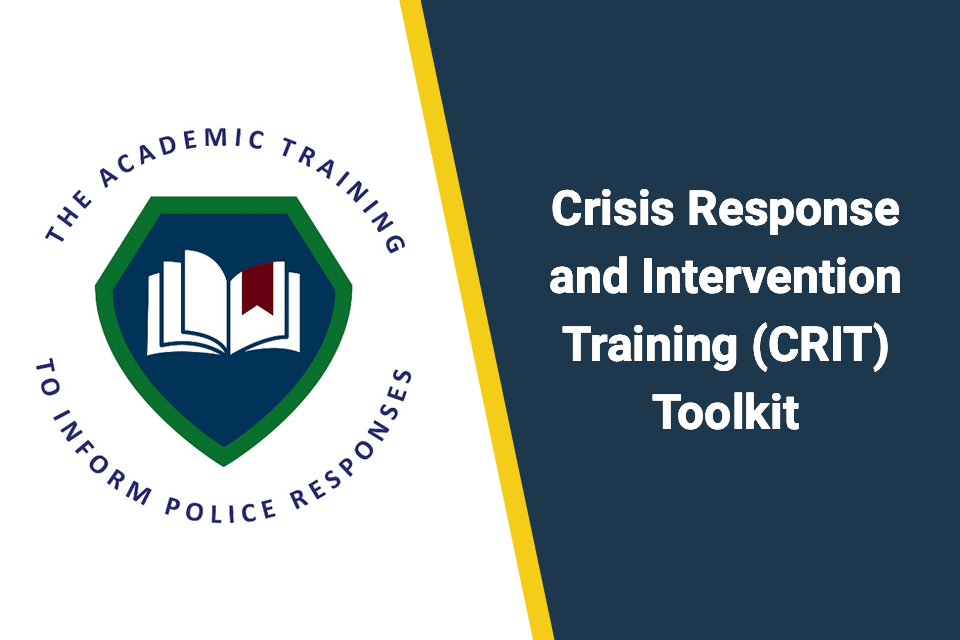
Crisis Response and Intervention Training (CRIT) Toolkit
The Crisis Response and Intervention Training (CRIT) is designed to prepare and improve police officer responses during encounters with individuals experiencing crises related to mental health, substance use, and intellectual and developmental disabilities.

Propelling Change: A Prosecutor Call to Action
Propelling Change is a national call to action for prosecutors that aims to break the cycle of arrest and incarceration for individuals with behavioral health needs by committing to support equitable diversion efforts and work with partners to foster connections to community-based care for improved outcomes.
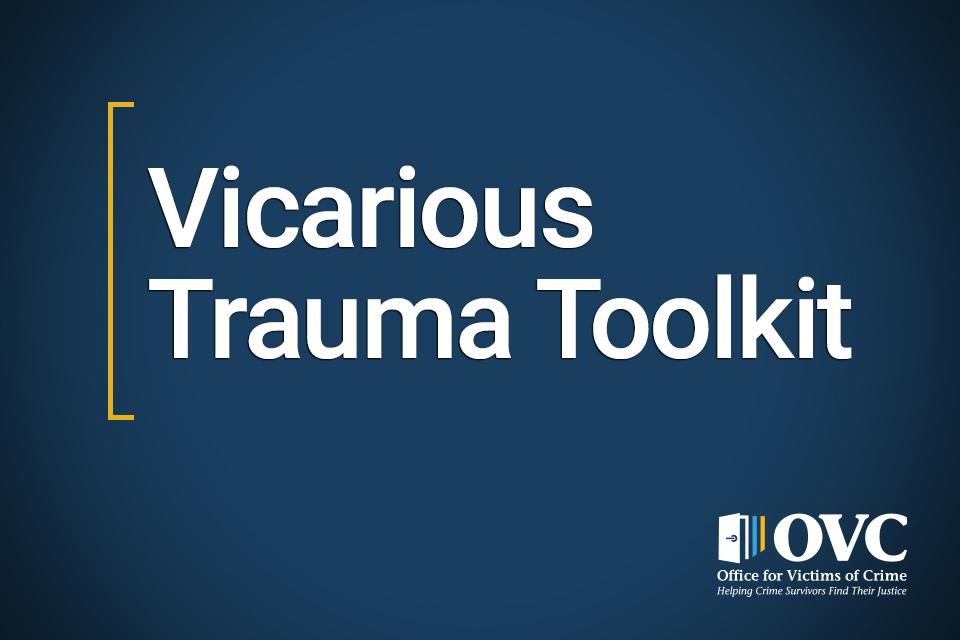
Vicarious Trauma Toolkit
This Toolkit introduces a model for examining and conceptualizing the effects of vicarious trauma to the work-related exposure that victim services providers, first responders, and allied professionals experience in their daily work, and provides organizations with tools to support staff in becoming more trauma-informed.
Resources for Youth and Youth-Serving Organizations

OJJDP Juvenile Justice and Mental Health Collaboration Program
The Juvenile Justice and Mental Health Collaboration Program (JJMHCP) supports collaborative public safety efforts through partnerships with juvenile justice, mental health and substance use agencies to improve responses and outcomes for youth with mental health or co-occurring substance use conditions who come into contact with the juvenile justice system.

OJJDP’s National Mentoring Resource Center
The Office of Juvenile Justice and Delinquency Prevention's National Mentoring Resource Center serves as a comprehensive resource for mentoring tools, program and training materials, and no-cost training and technical assistance to provide youth mentoring practitioners with support to incorporate evidence-based practices to improve positive outcomes for youth.
Resources for Victims and Survivors of Crime

Help for Victims
If you are a victim of a crime, you have many rights and services available to help you.

Victim Assistance and Compensation
All states receive Federal Victims of Crime Act (VOCA) funds from the Office for Victims of Crime to help support crime victim assistance and compensation programs. Victims of crime may be eligible through these funds for crime victim compensation benefits, including reimbursement for mental health counseling, medical services, lost wages, and other costs incurred due to the crime.
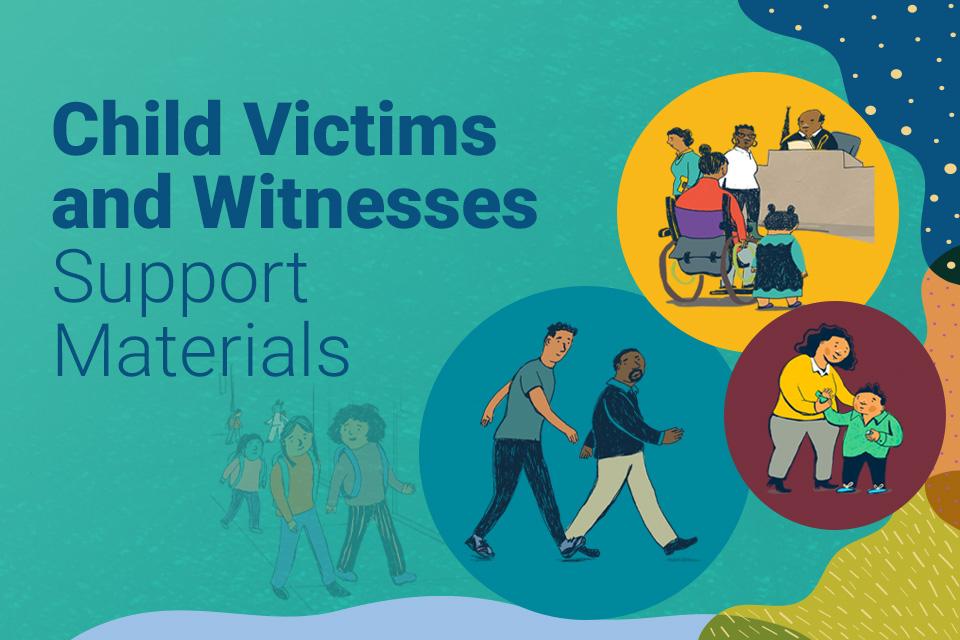
Child Victims and Witnesses Support Materials
For children and youth, participating in the justice system as a victim or witness can be especially confusing, distressing, and even re-traumatizing. These materials were created to support children and youth during their involvement with the justice system as a victim or witness to a crime.
Funding Opportunities
Explore OJP's funding opportunities to support law enforcement, court professionals, correctional facilities, behavioral health providers, community-based organizations, and other service providers in addressing the needs of individuals with mental health and co-occurring substance use disorder needs.
Funding Opportunities Currently Available:
- FY24 Collaborative Crisis Response and Intervention Training Program Grants.gov Deadline : May 15, 2024, and Application JustGrants Deadline: May 22, 2024
- FY24 STOP School Violence Program Competitive Solicitation Grants.gov Deadline: June 12, 2024, and Application JustGrants Deadline : June 20, 2024
- FY24 Veterans Treatment Court Discretionary Grant Program Grants.gov Deadline: June 20, 2024, and Application JustGrants Deadline: June 27, 2024
- FY24 National Community Courts Initiative Grants.gov Deadline: June 24, 2024, and Application JustGrants Deadline: July 1, 2024
- FY24 Residential Substance Abuse Treatment for State Prisoners Program Formula Grant Solicitation Grants.gov Deadline: July 10, 2024, and Application JustGrants Deadline: July 15, 2024
| to learn about available funding from the OJP program offices related to this and other topics. page for details about grants awarded by OJP. for weekly funding announcements and tips. |
OJP Programs and Initiatives
Following are some of the OJP programs that support mental health services:
- Justice and Mental Health Collaboration Program (JMHCP)
- Edward Byrne Memorial Justice Assistance Grant (JAG) Program
- Stepping Up Initiative
- VALOR Officer Safety and Wellness Initiative
- National Suicide Awareness for Law Enforcement Officers Program (SAFLEO)
Research, Data and Evaluation
- Emerging Relevance of Neuroscience in Corrections Date Published: March 2023
- Experiences of Victimization Among Latinos: Studies Confirm Significant Victim Mental Health Impact and Mistrust of Authorities Date Published: September 2022
- Interconnecting Mental Health and Behavioral Support Improves School Safety Date Published: March 2022
- Suicide in Local Jails and State and Federal Prisons, 2009-2019 – Statistical Tables Date Published: October 2021
- Survey of Prison Inmates, 2016: Indicators of Mental Health Problems Reported by Prisoners Date Published: October 2021
- Identifying Needs Related to Managing Seriously Mentally Ill Individuals in Corrections Date Published: July 2020
- Indicators of Mental Health Problems Reported by Prisoners and Jail Inmates, 2011-2012 Date Published: June 2017
Publications and Other Resources
- Officer Health and Wellness Agency Assessment Tool and Action Planning Roadmap
- Bureau of Justice Assistance Mental Health Topical Resource Page
- Office of Juvenile Justice & Delinquency Prevention News in Brief
- Office for Victims of Crime Physical and Mental Health Topical Resource Page
- Resources and Support for Victims of Mass Violence
Training and Technical Assistance
- Justice and Mental Health Collaboration Program Support Centers Strengthening connections among criminal justice agencies, behavioral health organizations, and the community to improve wellbeing of people with mental health conditions or co-occurring substance use disorders.
- Law Enforcement Mental Health Learning Site Program This program serves as a peer-to-peer learning program for law enforcement agencies seeking to build collaborative models to improve responses to calls and outcomes for individuals with mental health needs.
- Mental Health Courts Mental health courts are specialized court dockets for certain defendants with mental illnesses that substitute a problem-solving model for traditional criminal court processing.
- Academic Training to Inform Police Responses A national initiative to enhance police engagement with people with behavioral health conditions and developmental disabilities.
- Vicarious Trauma Learn more about the impact of vicarious trauma on individuals and organizations, as well as resources designed to help you identify and address vicarious trauma proactively.
- Victim Assistance Training Online VAT Online is a foundational, Web-based victim assistance training program that offers victim service providers and allied professionals the opportunity to develop the essential skills and knowledge they need to assist victims of crime more effectively.
Mental Health Videos

988: A Shared Opportunity
On July 16, 2022, the U.S. transitioned from the 10-digit National Suicide Prevention Lifeline to 988—an easy-to-remember three-digit number for 24/7 crisis care. This transition to the new National Suicide & Crisis Lifeline, created a unique opportunity to rethink how people are connected to compassionate, accessible care. Communities around the country are now determining how this new, national dialing code works alongside existing law enforcement and crisis responses.
For criminal justice stakeholders, the transition to 988 is an important opportunity to shift people in crisis toward appropriate care, and help redesign crisis responses that, when implemented effectively, minimize contact with law enforcement and the justice system.
Watch this video series that aims to shine light on the various ways communities are incorporating 988 into existing approaches to crisis response.

Transforming the understanding and treatment of mental illnesses.
Información en español
Celebrating 75 Years! Learn More >>
- Research Funded by NIMH
Research Conducted at NIMH (Intramural Research Program)
- Priority Research Areas
- Research Resources

The Division of Intramural Research Programs (IRP) at the National Institute of Mental Health (NIMH) is the internal research division of the NIMH. The division plans and conducts basic, clinical, and translational research to advance understanding of the diagnosis, causes, treatment, and prevention of psychiatric disorders. NIMH IRP conducts state-of-the-art research that utilizes the unique resources of the National Institutes of Health (NIH), provides an environment conducive to the training and development of clinical and basic scientists, and in part, complements extramural research activities.

Investigators
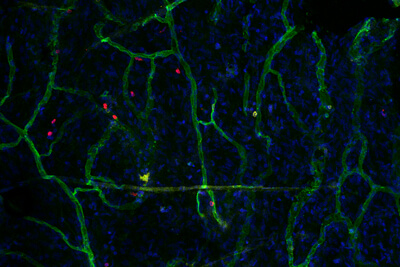
Research Groups

About the Office of Fellowship Training

Office of the Scientific Director (OSD)

Collaborations and Partnerships
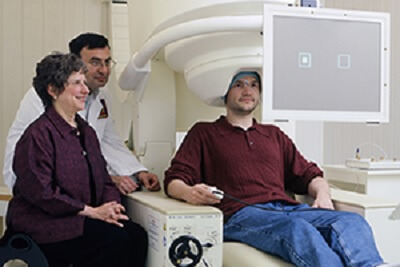
Join a Study
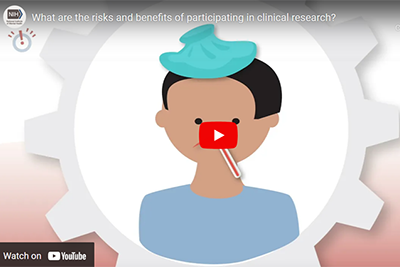
News and Multimedia Featuring IRP
- Basic Research Powers the First Medication for Postpartum Depression | May 14, 2024 ● Science News
- Novel Treatment Helps Children With Severe Irritability | April 5, 2024 ● Science News
- NIH Researchers Identify Brain Connections Associated With ADHD in Youth | March 13, 2024 ● Science News
Numbers, Facts and Trends Shaping Your World
Read our research on:
Full Topic List
Regions & Countries
- Publications
- Our Methods
- Short Reads
- Tools & Resources
Read Our Research On:
Teens and social media: Key findings from Pew Research Center surveys

For the latest survey data on social media and tech use among teens, see “ Teens, Social Media, and Technology 2023 .”
Today’s teens are navigating a digital landscape unlike the one experienced by their predecessors, particularly when it comes to the pervasive presence of social media. In 2022, Pew Research Center fielded an in-depth survey asking American teens – and their parents – about their experiences with and views toward social media . Here are key findings from the survey:
Pew Research Center conducted this study to better understand American teens’ experiences with social media and their parents’ perception of these experiences. For this analysis, we surveyed 1,316 U.S. teens ages 13 to 17, along with one parent from each teen’s household. The survey was conducted online by Ipsos from April 14 to May 4, 2022.
This research was reviewed and approved by an external institutional review board (IRB), Advarra, which is an independent committee of experts that specializes in helping to protect the rights of research participants.
Ipsos invited panelists who were a parent of at least one teen ages 13 to 17 from its KnowledgePanel , a probability-based web panel recruited primarily through national, random sampling of residential addresses, to take this survey. For some of these questions, parents were asked to think about one teen in their household. (If they had multiple teenage children ages 13 to 17 in the household, one was randomly chosen.) This teen was then asked to answer questions as well. The parent portion of the survey is weighted to be representative of U.S. parents of teens ages 13 to 17 by age, gender, race, ethnicity, household income and other categories. The teen portion of the survey is weighted to be representative of U.S. teens ages 13 to 17 who live with parents by age, gender, race, ethnicity, household income and other categories.
Here are the questions used for this report, along with responses, and its methodology .
Majorities of teens report ever using YouTube, TikTok, Instagram and Snapchat. YouTube is the platform most commonly used by teens, with 95% of those ages 13 to 17 saying they have ever used it, according to a Center survey conducted April 14-May 4, 2022, that asked about 10 online platforms. Two-thirds of teens report using TikTok, followed by roughly six-in-ten who say they use Instagram (62%) and Snapchat (59%). Much smaller shares of teens say they have ever used Twitter (23%), Twitch (20%), WhatsApp (17%), Reddit (14%) and Tumblr (5%).
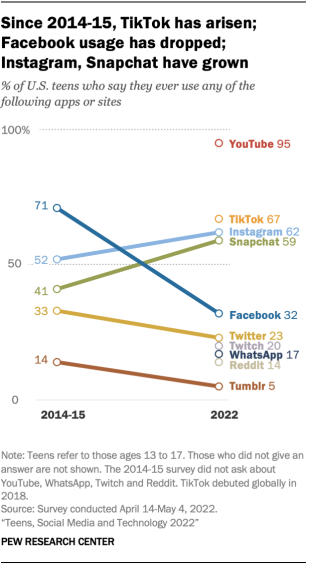
Facebook use among teens dropped from 71% in 2014-15 to 32% in 2022. Twitter and Tumblr also experienced declines in teen users during that span, but Instagram and Snapchat saw notable increases.
TikTok use is more common among Black teens and among teen girls. For example, roughly eight-in-ten Black teens (81%) say they use TikTok, compared with 71% of Hispanic teens and 62% of White teens. And Hispanic teens (29%) are more likely than Black (19%) or White teens (10%) to report using WhatsApp. (There were not enough Asian teens in the sample to analyze separately.)
Teens’ use of certain social media platforms also varies by gender. Teen girls are more likely than teen boys to report using TikTok (73% vs. 60%), Instagram (69% vs. 55%) and Snapchat (64% vs. 54%). Boys are more likely than girls to report using YouTube (97% vs. 92%), Twitch (26% vs. 13%) and Reddit (20% vs. 8%).
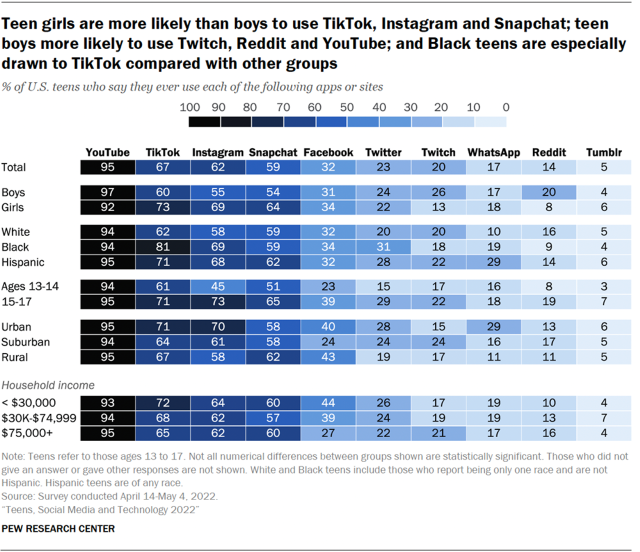
Majorities of teens use YouTube and TikTok every day, and some report using these sites almost constantly. About three-quarters of teens (77%) say they use YouTube daily, while a smaller majority of teens (58%) say the same about TikTok. About half of teens use Instagram (50%) or Snapchat (51%) at least once a day, while 19% report daily use of Facebook.
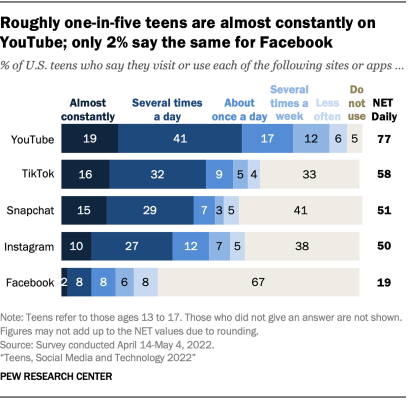
Some teens report using these platforms almost constantly. For example, 19% say they use YouTube almost constantly, while 16% and 15% say the same about TikTok and Snapchat, respectively.
More than half of teens say it would be difficult for them to give up social media. About a third of teens (36%) say they spend too much time on social media, while 55% say they spend about the right amount of time there and just 8% say they spend too little time. Girls are more likely than boys to say they spend too much time on social media (41% vs. 31%).
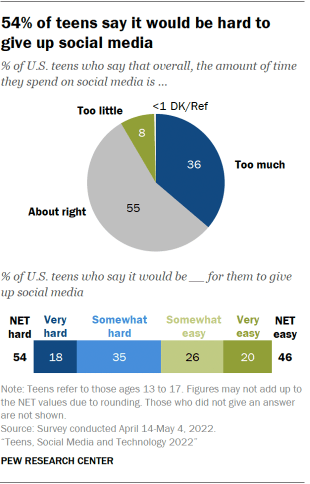
Teens are relatively divided over whether it would be hard or easy for them to give up social media. Some 54% say it would be very or somewhat hard, while 46% say it would be very or somewhat easy.
Girls are more likely than boys to say it would be difficult for them to give up social media (58% vs. 49%). Older teens are also more likely than younger teens to say this: 58% of those ages 15 to 17 say it would be very or somewhat hard to give up social media, compared with 48% of those ages 13 to 14.
Teens are more likely to say social media has had a negative effect on others than on themselves. Some 32% say social media has had a mostly negative effect on people their age, while 9% say this about social media’s effect on themselves.
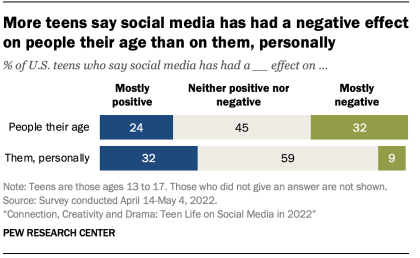
Conversely, teens are more likely to say these platforms have had a mostly positive impact on their own life than on those of their peers. About a third of teens (32%) say social media has had a mostly positive effect on them personally, while roughly a quarter (24%) say it has been positive for other people their age.
Still, the largest shares of teens say social media has had neither a positive nor negative effect on themselves (59%) or on other teens (45%). These patterns are consistent across demographic groups.
Teens are more likely to report positive than negative experiences in their social media use. Majorities of teens report experiencing each of the four positive experiences asked about: feeling more connected to what is going on in their friends’ lives (80%), like they have a place where they can show their creative side (71%), like they have people who can support them through tough times (67%), and that they are more accepted (58%).
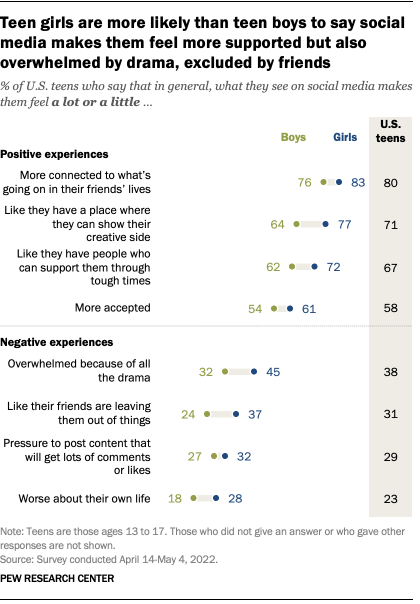
When it comes to negative experiences, 38% of teens say that what they see on social media makes them feel overwhelmed because of all the drama. Roughly three-in-ten say it makes them feel like their friends are leaving them out of things (31%) or feel pressure to post content that will get lots of comments or likes (29%). And 23% say that what they see on social media makes them feel worse about their own life.
There are several gender differences in the experiences teens report having while on social media. Teen girls are more likely than teen boys to say that what they see on social media makes them feel a lot like they have a place to express their creativity or like they have people who can support them. However, girls also report encountering some of the pressures at higher rates than boys. Some 45% of girls say they feel overwhelmed because of all the drama on social media, compared with 32% of boys. Girls are also more likely than boys to say social media has made them feel like their friends are leaving them out of things (37% vs. 24%) or feel worse about their own life (28% vs. 18%).
When it comes to abuse on social media platforms, many teens think criminal charges or permanent bans would help a lot. Half of teens think criminal charges or permanent bans for users who bully or harass others on social media would help a lot to reduce harassment and bullying on these platforms.
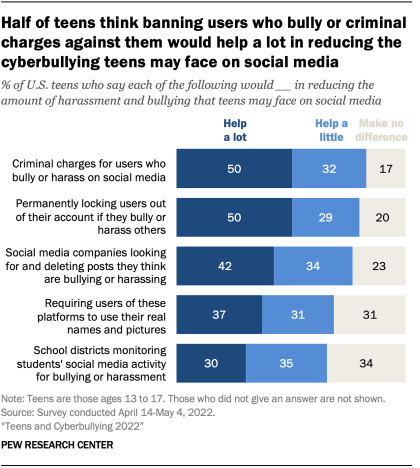
About four-in-ten teens say it would help a lot if social media companies proactively deleted abusive posts or required social media users to use their real names and pictures. Three-in-ten teens say it would help a lot if school districts monitored students’ social media activity for bullying or harassment.
Some teens – especially older girls – avoid posting certain things on social media because of fear of embarrassment or other reasons. Roughly four-in-ten teens say they often or sometimes decide not to post something on social media because they worry people might use it to embarrass them (40%) or because it does not align with how they like to represent themselves on these platforms (38%). A third of teens say they avoid posting certain things out of concern for offending others by what they say, while 27% say they avoid posting things because it could hurt their chances when applying for schools or jobs.
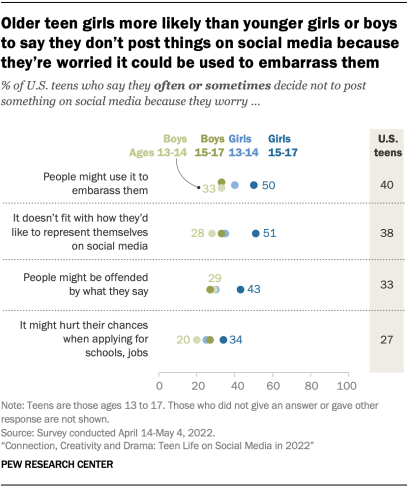
These concerns are more prevalent among older teen girls. For example, roughly half of girls ages 15 to 17 say they often or sometimes decide not to post something on social media because they worry people might use it to embarrass them (50%) or because it doesn’t fit with how they’d like to represent themselves on these sites (51%), compared with smaller shares among younger girls and among boys overall.
Many teens do not feel like they are in the driver’s seat when it comes to controlling what information social media companies collect about them. Six-in-ten teens say they think they have little (40%) or no control (20%) over the personal information that social media companies collect about them. Another 26% aren’t sure how much control they have. Just 14% of teens think they have a lot of control.
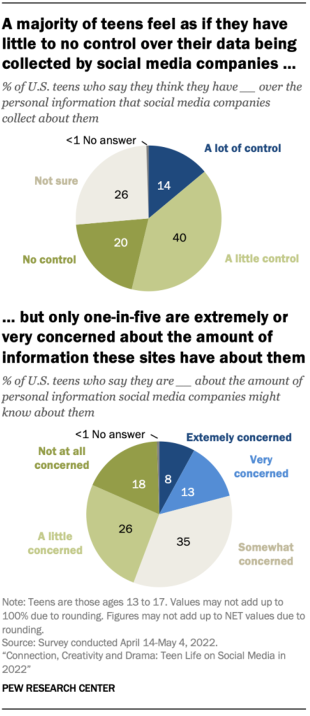
Despite many feeling a lack of control, teens are largely unconcerned about companies collecting their information. Only 8% are extremely concerned about the amount of personal information that social media companies might have and 13% are very concerned. Still, 44% of teens say they have little or no concern about how much these companies might know about them.
Only around one-in-five teens think their parents are highly worried about their use of social media. Some 22% of teens think their parents are extremely or very worried about them using social media. But a larger share of teens (41%) think their parents are either not at all (16%) or a little worried (25%) about them using social media. About a quarter of teens (27%) fall more in the middle, saying they think their parents are somewhat worried.
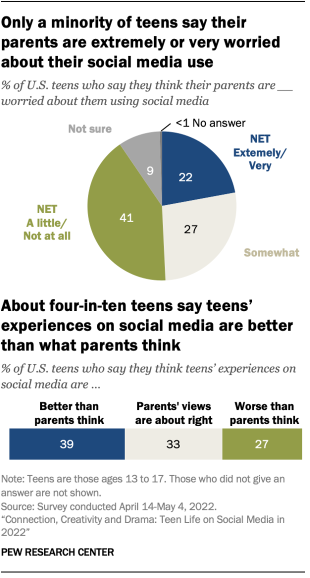
Many teens also believe there is a disconnect between parental perceptions of social media and teens’ lived realities. Some 39% of teens say their experiences on social media are better than parents think, and 27% say their experiences are worse. A third of teens say parents’ views are about right.
Nearly half of parents with teens (46%) are highly worried that their child could be exposed to explicit content on social media. Parents of teens are more likely to be extremely or very concerned about this than about social media causing mental health issues like anxiety, depression or lower self-esteem. Some parents also fret about time management problems for their teen stemming from social media use, such as wasting time on these sites (42%) and being distracted from completing homework (38%).
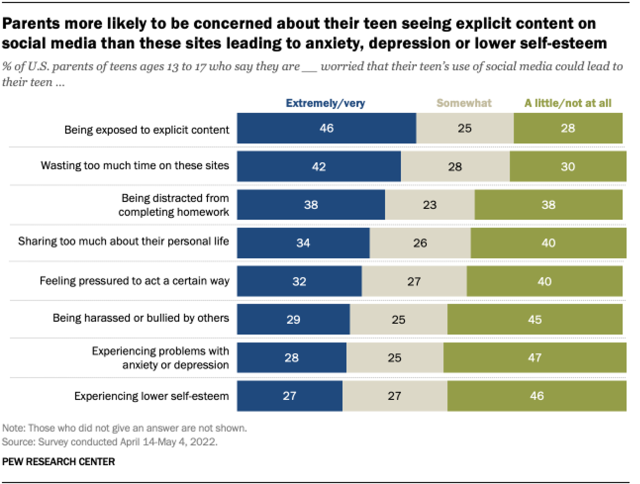
Note: Here are the questions used for this report, along with responses, and its methodology .
CORRECTION (May 17, 2023): In a previous version of this post, the percentages of teens using Instagram and Snapchat daily were transposed in the text. The original chart was correct. This change does not substantively affect the analysis.
- Age & Generations
- Age, Generations & Tech
- Internet & Technology
- Platforms & Services
- Social Media
- Teens & Tech
- Teens & Youth
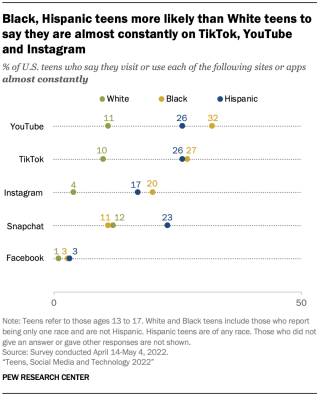
Emily A. Vogels is a former research associate focusing on internet and technology at Pew Research Center .

Risa Gelles-Watnick is a former research analyst focusing on internet and technology research at Pew Research Center .
Teens and Video Games Today
As biden and trump seek reelection, who are the oldest – and youngest – current world leaders, how teens and parents approach screen time, who are you the art and science of measuring identity, u.s. centenarian population is projected to quadruple over the next 30 years, most popular.
1615 L St. NW, Suite 800 Washington, DC 20036 USA (+1) 202-419-4300 | Main (+1) 202-857-8562 | Fax (+1) 202-419-4372 | Media Inquiries
Research Topics
- Email Newsletters
ABOUT PEW RESEARCH CENTER Pew Research Center is a nonpartisan fact tank that informs the public about the issues, attitudes and trends shaping the world. It conducts public opinion polling, demographic research, media content analysis and other empirical social science research. Pew Research Center does not take policy positions. It is a subsidiary of The Pew Charitable Trusts .
© 2024 Pew Research Center

IMAGES
VIDEO
COMMENTS
Enhancing Therapeutic Strategies: A Focus on Pharmacovigilance in New Wave Antidepressants. Octavian Vasiliu. Mirko Manchia. Yoshihiro Noguchi. 176 views. The second most-cited journal in its field, using translational approaches to improve therapeutic options for mental illness, communicate progress to clinicians and researchers, and ...
In this post, we'll help kickstart your research topic ideation process by providing a hearty list of mental health-related research topics and ideas. PS - This is just the start… We know it's exciting to run through a list of research topics, but please keep in mind that this list is just a starting point.
Integrating Public Health and Health Care — Protecting Health as a Team Sport. C.A. Wong, D. Houry, and M.K. CohenN Engl J Med 2024;390:1739-1742. Protecting health is a team sport — yet the ...
JAMA Psychiatry 2024. Virtanen S, Lagerberg T, Takami Lageborn C, et al. Antidepressant Use and Risk of Manic Episodes in Children and Adolescents With Unipolar Depression. JAMA Psychiatry 2024; 81:25. Goldstein TR, Merranko J, Rode N, et al. Dialectical Behavior Therapy for Adolescents With Bipolar Disorder: A Randomized Clinical Trial.
Reviews of timely topics in psychiatric research. Letters to the editor will be considered for case reports, comments about previously published papers, or secondary data analyses. Papers with a primary focus on imaging techniques, can be submitted to Psychiatry Research: Neuroimaging.
General Psychiatry (GPSYCH) is an open access journal that has been providing leading psychiatry research since 1959. The journal covers all topics of interest to psychiatrists and other mental health professionals internationally. GPSYCH publishes original research, systematic reviews, meta-analyses, forums on topical issues, case reports, research methods in psychiatry, and a unique section ...
Center for Brain Research in Mood Disorders, Department of Psychiatry, Taylor Family Institute for Innovative Psychiatric Research, Washington University School of Medicine, St Louis, MO, USA ...
The National Institute of Mental Health (NIMH) is the Nation's leader in research on mental disorders, supporting research to transform the understanding and treatment of mental illnesses. Below you can learn more about NIMH funded research areas, policies, resources, initiatives, and research conducted by NIMH on the NIH campus.
Research Open Access 10 Jun 2024 Translational Psychiatry Volume: 14, P: 251 Association of post-COVID phenotypic manifestations with new-onset psychiatric disease
In fiscal year 2019, this Department supported 159 investigators with more than $110 million in grants awarded. Our research ranges from studies of molecular structures and brain circuitry to clinical trials that test novel treatments to understanding how to improve mental health care in the community. The goals are to discover how the brain ...
Corrigendum to "predicting non-response to ketamine for depression: an exploratory symptom-level analysis of real-world data among military veterans" [psychiatry research vol. 335 (may 2024) 115,858] Eric A. Miller, Houtan Totonchi Afshar, Jyoti Mishra, Roger S. McIntyre, Dhakshin Ramanathan.
Abstract. 50 Studies Every Psychiatrist Should Know presents key studies that have shaped the clinical practice of psychiatry. Selected using a rigorous methodology, the studies cover a broad range of topics including anxiety disorders, bipolar disorder, major depressive disorder, schizophrenia, women's mental health, child and adolescent disorders, obsessive compulsive disorder, personality ...
Research & Registry. Research plays a vital role in the understanding of the causes of mental illnesses, the development of treatments and preventive strategies, and the promotion of mental health. Research also provides information about how to effectively organize and structure the delivery of services for mental disorders, including ...
Top 10 Mental Health Research Paper Topics. 1. The Effects of Social Media Platforms on the Mental Well-Being of Children. The effects of social media platforms on the mental well-being of children is a research topic that is especially significant and relevant today. This is due to the increasing usage of online social networks by children and ...
Topics of Psychology Research Related to Human Cognition. Some of the possible topics you might explore in this area include thinking, language, intelligence, and decision-making. Other ideas might include: Dreams. False memories. Attention. Perception.
Childhood obesity affects about a third of children and adolescents in the U.S. and confers a significant risk for current and future health impairment, and eating-related conditions such as loss of control eating and binge eating disorder. Obesity in early/mid-childhood is common and may reflect a distinct, high-risk, early-onset form.
Health Topics. The National Institute of Mental Health (NIMH), the lead federal agency for research on mental disorders, offers basic information on mental disorders, a range of related topics, and the latest mental health research. It is not the intention of NIMH to provide specific medical advice, but rather to provide users with information ...
Psychiatry & Mental Health Topics. ADHD. Alzheimer's Disease. Anxiety Disorders. Autism. Bioterrorism and Disaster Medicine. Bipolar Disorder. Child and Adolescent Psychiatry. Depression.
The American Psychological Association (APA) is a scientific and professional organization that represents psychologists in the United States. APA educates the public about psychology, behavioral science and mental health; promotes psychological science and practice; fosters the education and training of psychological scientists, practitioners and educators; advocates for psychological ...
Attention deficit hyperactivity disorder (ADHD) is associated with poor educational outcomes that can have long-term negative effects on the mental health, wellbeing, and socio-economic outcomes of university students. Mental health provision for university students with ADHD is often inadequate due to long waiting times for access to diagnosis and treatment in specialist National Health ...
For referrals to substance use and mental health treatment programs, call the Substance Abuse and Mental Health Administration (SAMHSA) National Helpline at 1-800-662-HELP (4357) or visit www.FindTreatment.gov to find a qualified healthcare provider in your area. For other personal medical advice, please speak to a qualified health professional.
Narcissistic personality disorder is a mental health condition in which people have an unreasonably high sense of their own importance. They need and seek too much attention and want people to admire them. People with this disorder may lack the ability to understand or care about the feelings of others.
The brief, which is informed by a comprehensive review of existing evidence about the impact of COVID-19 on mental health and mental health services, and includes estimates from the latest Global Burden of Disease study, shows that the pandemic has affected the mental health of young people and that they are disproportionally at risk of ...
The Substance Abuse and Mental Health Service Administration's (SAMHSA) National Helpline is a free, confidential, 24/7, 365-day-a-year treatment referral information service (in English and Spanish) for individuals and families needing support for mental health and/or substance use disorders. Call 1-800-662-HELP (4357) or TTY: 1-800-487-4889.
The Division of Intramural Research Programs (IRP) at the National Institute of Mental Health (NIMH) is the internal research division of the NIMH. The division plans and conducts basic, clinical, and translational research to advance understanding of the diagnosis, causes, treatment, and prevention of psychiatric disorders.
Parents of teens are more likely to be extremely or very concerned about this than about social media causing mental health issues like anxiety, depression or lower self-esteem. Some parents also fret about time management problems for their teen stemming from social media use, such as wasting time on these sites (42%) and being distracted from ...